Is Human Trafficking Illegal: Answered State by State
Is human trafficking illegal? Yes. But, what does each state about this type of crime? Let’s find out!

Is human trafficking illegal? The short answer is yes. Human trafficking is a form of modern-day slavery that spreads into different industries.
To prove its illegality in the United States, the federal government has a clause all about it in its vast text of laws and regulations. According to the Department of Justice, human trafficking is a crime involving the exploitation of a person for labor, services, and commercial sex.

The federal government of the U.S. also created the Trafficking Victims Protection Act of 2000. It gives a more in-depth definition of sex trafficking and labor trafficking.
Sex trafficking is a situation induced by force, fraud, or coercion for a commercial sex act. It is also a situation where a person performing such an act hasn’t reached the age of 18. This means that any commercial sex of a minor under legal definitions is automatically sex trafficking.

Labor trafficking can involve the recruitment, harboring, transportation, provision, or obtaining of a person for labor or other services. This procurement occurs through the use of force, fraud, or coercion to subject the person to involuntary servitude, peonage, debt bondage, or slavery.

As you can see from the federal definition above, human trafficking is illegal. But it’s not just illegal on a national level. Each state has its definition. Some are more elaborate and complex compared to the national definition while others are simpler. Each state’s laws also describe the legal consequences if found guilty of participating in procuring or purchasing human slaves.
So, is human trafficking illegal everywhere in the U.S.?
Below are the definitions and punishments related to human trafficking for each state, in alphabetical order.
Alabama
Section 13A-6-152 in Alabama law discusses human trafficking in the first degree. This translates to a class A felony. If a person recruits someone for labor or sexual servitude, they commit human trafficking. It’s not just recruitment in Alabama. Human trafficking also involves enticing, inducing, harboring, transporting, holding, restraining, providing, maintaining, subjecting, or obtaining a person for labor or sexual servitude.
Human trafficking in the first degree also involves any situation where someone knowingly put a minor, or someone thought to be a minor, through sexual exploitation or sexual labor.
A corporation may face prosecution if any of its agents become involved. Same thing if it permits human trafficking to take place in the name of the company.
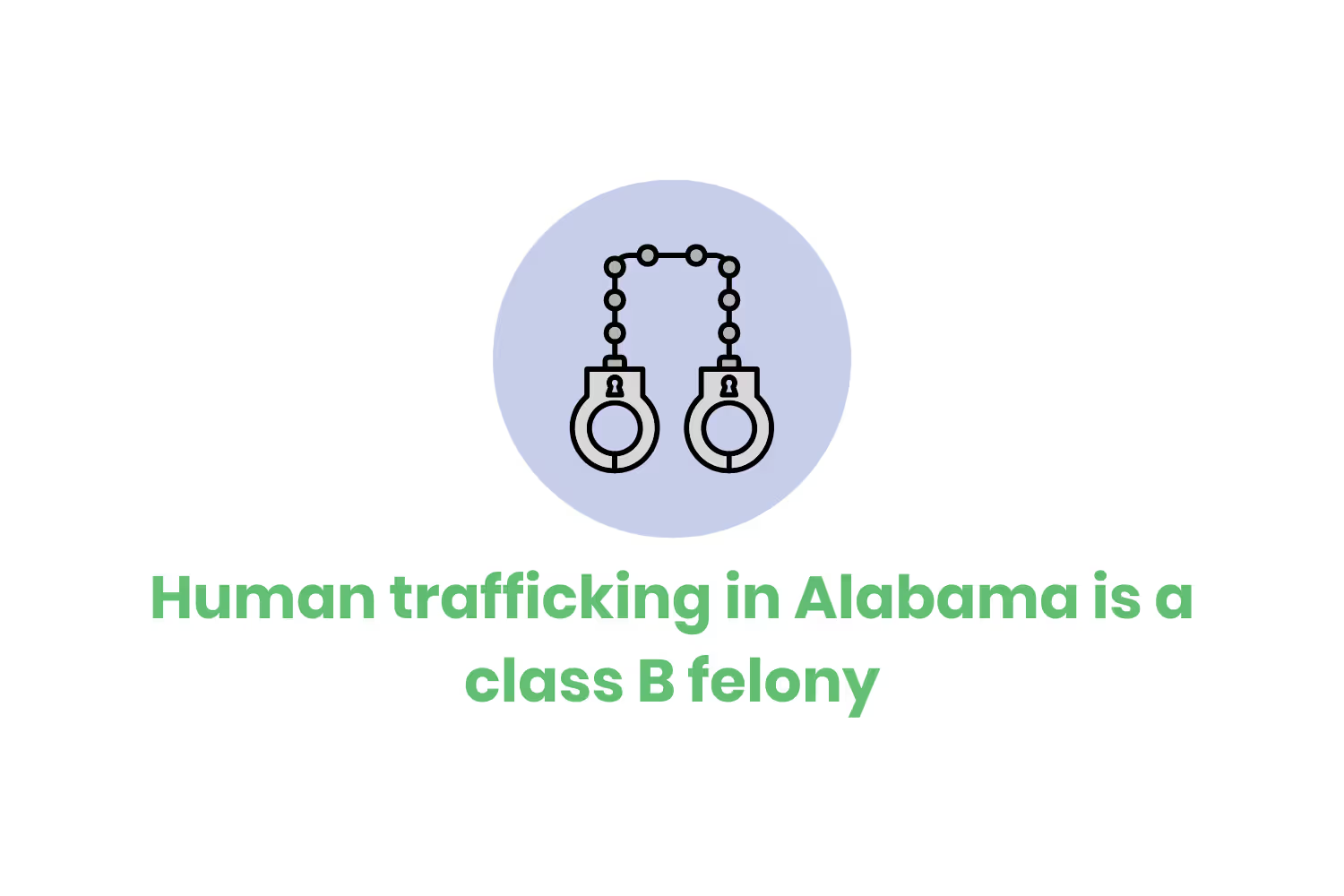
Section 13A-6-153 in Alabama law discusses human trafficking in the second degree. This translates to a class B felony. This happens when someone knows they will benefit in some way from participating. This person could benefit financially or by obtaining something else of value. It doesn’t matter how they benefit from the human trafficking situation, they can face trial.
A corporation can face a class B felony if one of its employees perpetrates human trafficking on behalf of their employer.
Any person that obstructs or attempts to obstruct the law may face trial for participating in human trafficking. The same is true for anyone who interferes in any way or prevents law enforcement from doing their jobs. A person convicted of this crime faces a class C felony.
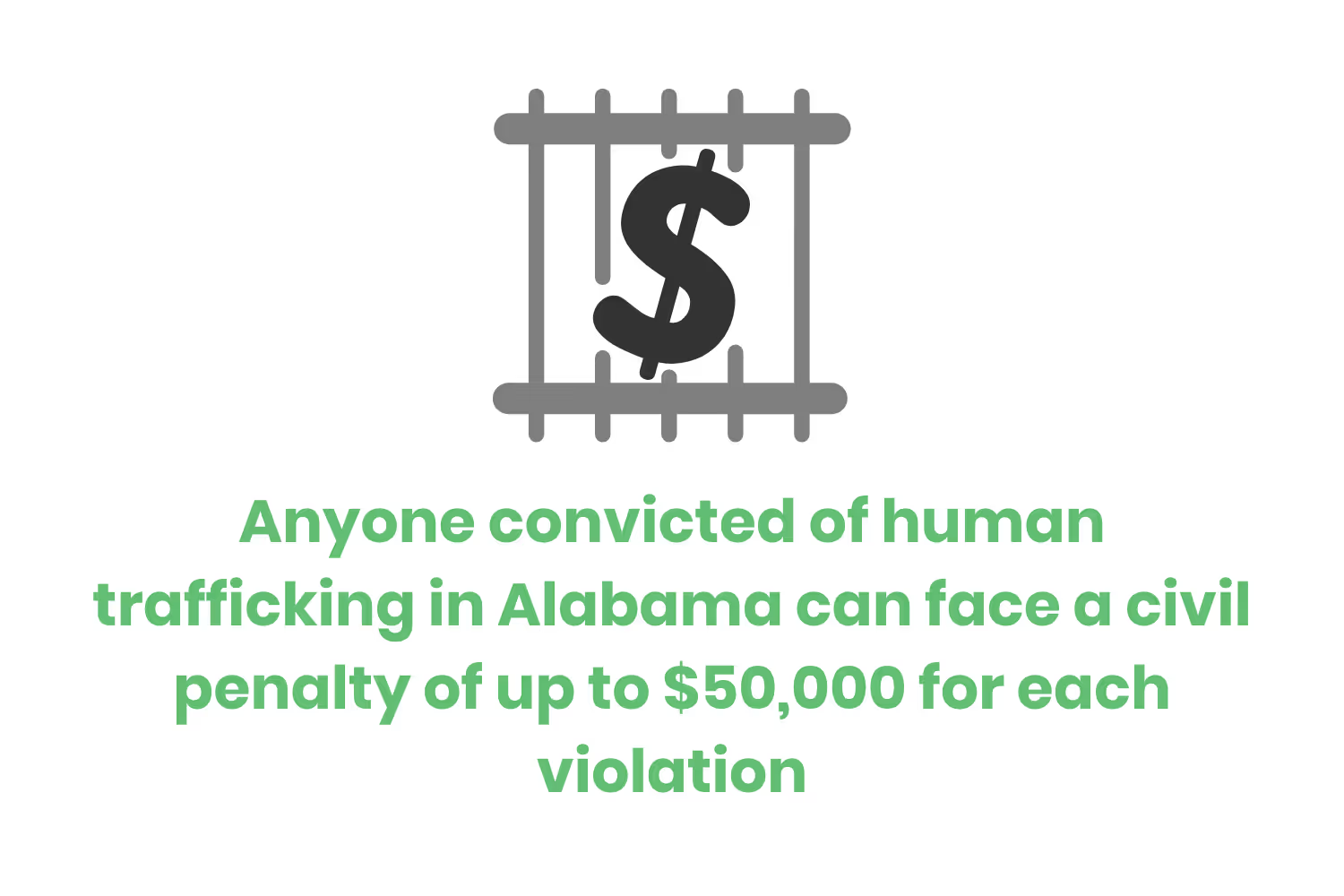
A person, corporation, or other legal entities who violate the laws above can face a civil penalty of up to $50,000 for each violation. If someone or an entity violates the terms of an injunction or order issued, they will pay a civil penalty of up to $75,000 per violation. They will also face contempt of court.
If a corporation continues to violate the law, a county may order the dissolution, suspension, or forfeiture of a corporation, partnership, or sole proprietorship.
Alaska
In the state of Alaska, committing the crime of human trafficking in the first degree is a class A felony. The clause defining the crime is under Alaska Statutes Title 11 Criminal Law § 11.41.360.
For a first-degree conviction, a person must compel or induce their victim to engage in…
- Sexual conduct
- Adult entertainment
- Labor
If these actions occur in Alaska by force, the threat of force against someone, or deception, the activity is human trafficking.
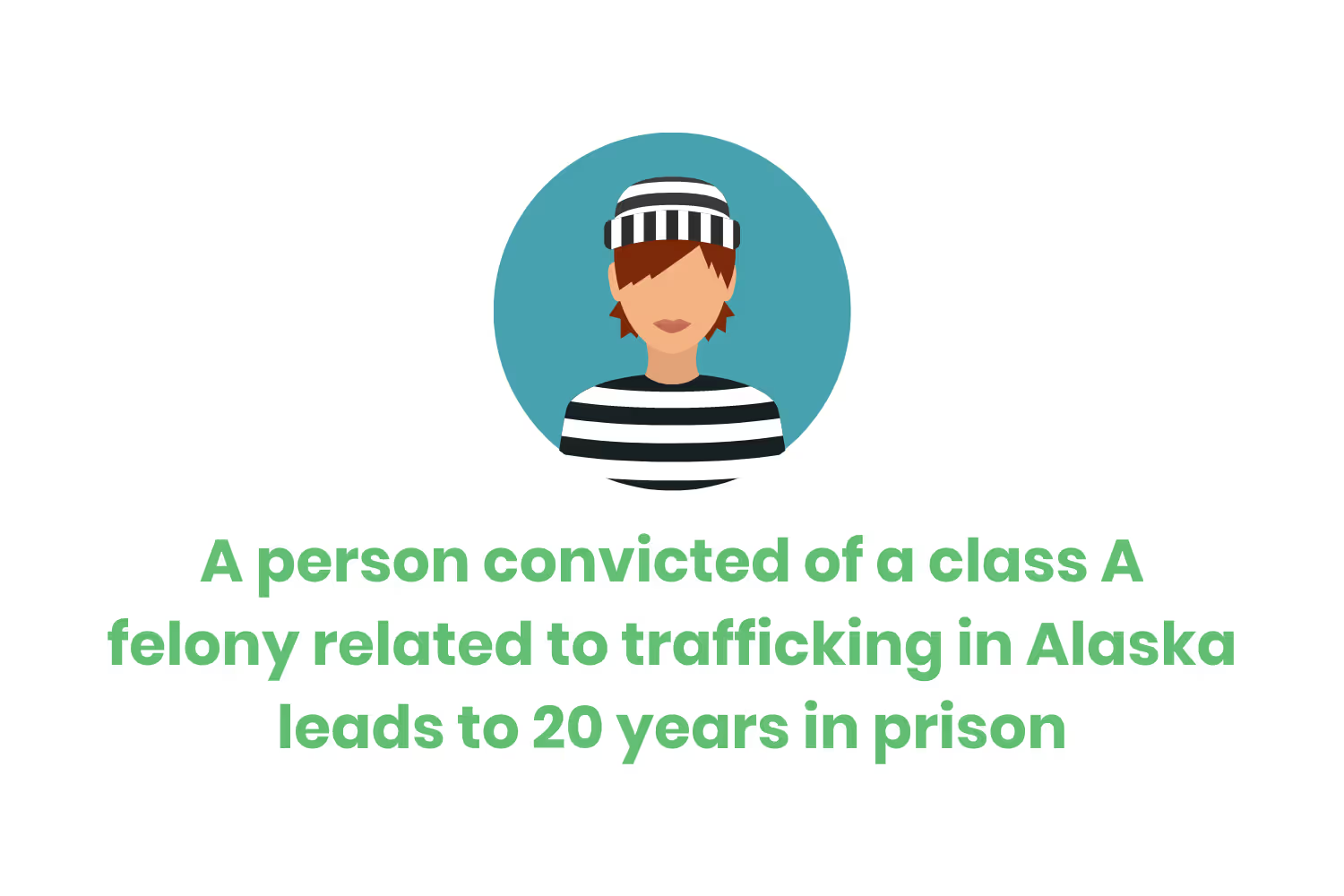
A person convicted of a class A felony leads to imprisonment that may last up to 20 years. The convicted party can also face a fine of up to $250,000.
With that said, human trafficking in the second degree involves someone obtaining and benefiting from the commission of human trafficking as defined above. The perpetrator does not care that they are benefiting from a trafficking situation. Human trafficking in the second degree translates to a class B felony.
Arizona
In 2021, Arizona revised its statutes related to sex trafficking and its classification. Revised Statutes §13-1307 makes it illegal for a person to knowingly recruit, entice, harbor, transport, provide, or obtain a person for human trafficking. Traffickers make their victims engage in prostitution by force, fraud, or coercion.
According to the same statute, a person convicted of this crime caused a class 2 felony.
But if the victim is someone under the age of 15, the crime then falls under the classification of “dangerous crime against children”. This is punishable under section 13-604.01.
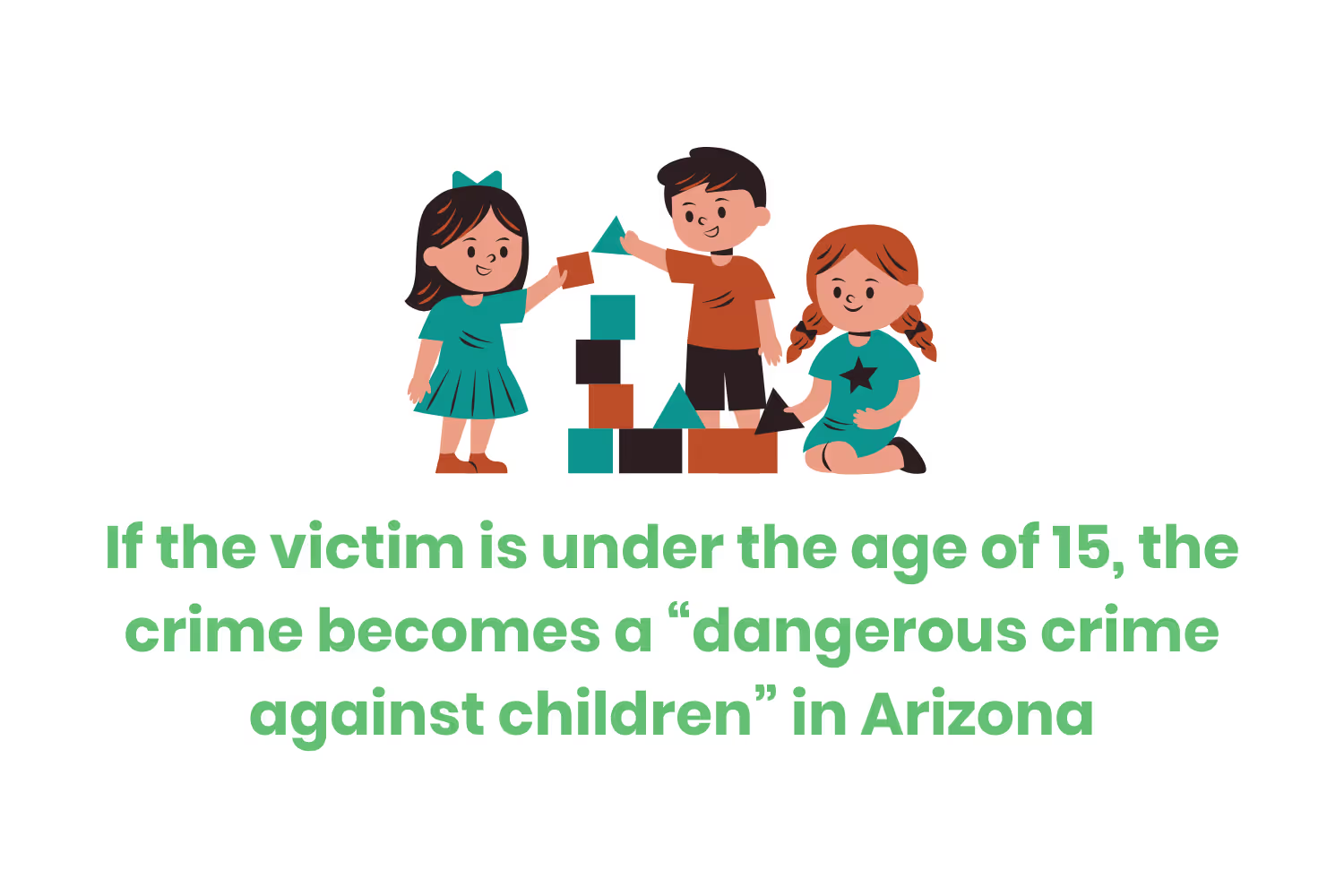
Speaking of children, Arizona’s child sex trafficking definition is much more complicated.
A person commits child sex trafficking if they knowingly…
- Causes a minor to engage in prostitution.
- Uses a minor for prostitution.
- Permits a minor under the perpetrator’s custody or control to engage in prostitution.
- Receives any form of benefit for procuring/placing a minor in the custody of someone for prostitution.
- Receives any benefit on an agreement to take part in the proceeds of prostituting a minor.
- Finances, manages, supervises, controls, or owns a prostitution activity involving a minor.
- Transports or finances transportation of any minor with the intention that the minor engage in prostitution.
- Provides a means for a minor to engage in prostitution.
- Entices, recruits, harbors, provides, transports, or otherwise obtains a minor with the intent and knowledge of trafficking purposes.
If a jury convicts a person of child sex trafficking in Arizona, the defendant can face a minimum of 13 years in prison and a maximum of 27 years. The presumptive time is around 20 years.
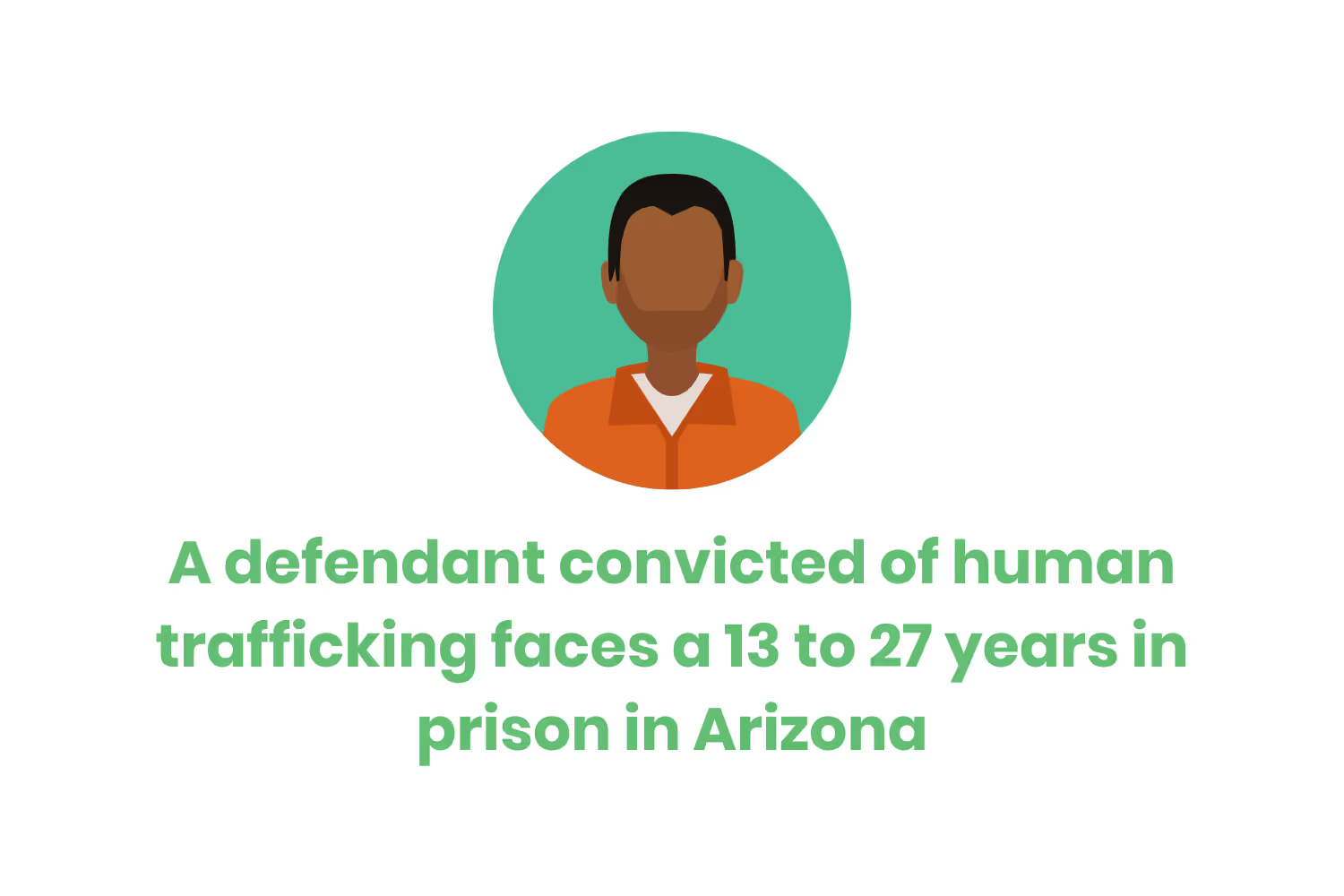
If a defendant has a singular prior felony conviction, the minimum number of years jumps to 25, and the maximum prison sentence increases to 45. The presumptive amount increases to 35 years.
If a defendant has two or more historical prior felony convictions, they may face a minimum of 30 years and a maximum of 50 years in prison.
Arkansas
Arkansas’s Code § 5-18-103 defines what is human trafficking in their state.
Someone commits human trafficking if they knowingly recruit, harbor, transport, obtain, entice, solicit, isolate, provide, or maintain a person. The preparator does this while knowing the victim will face labor trafficking. A person is also guilty if they somehow benefit from participating in trafficking people.
Someone also commits human trafficking if they knowingly recruit, harbor, transport, obtain, entice, solicit, isolate, provide, or maintain a minor for commercial sexual activity.
Human trafficking under Arkansas law also includes involuntary servitude.
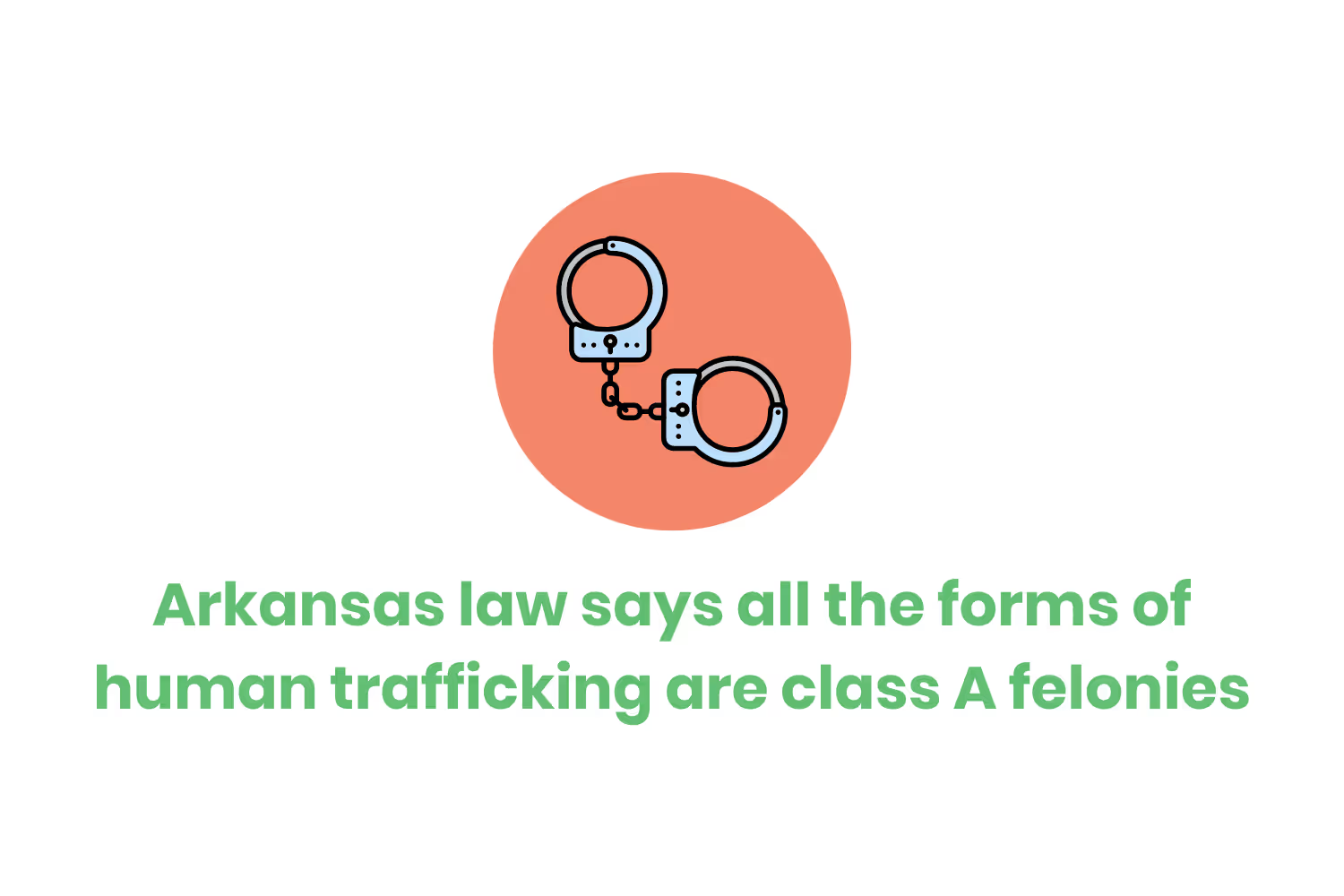
According to the law, all the forms of human trafficking discussed above are class A felonies. But, trafficking is a class Y felony in Arkansas if a victim was a minor when the offense took place.
A person who offers to pay, agrees to pay, or pays a fee to engage in any of the human trafficking definitions above will face a fine of $250 as punishment. This fine goes to the Safe Harbor Fund For Sexually Exploited Children.
California
California law discusses the various forms of human trafficking in PC 236.1.
Under this section, a person traffics an individual (the victim) if they deprive or violate the personal liberty of the victim intending to subject the victim to forced labor or services. If a person who does this with the intent to maintain a violation is also guilty of human trafficking.
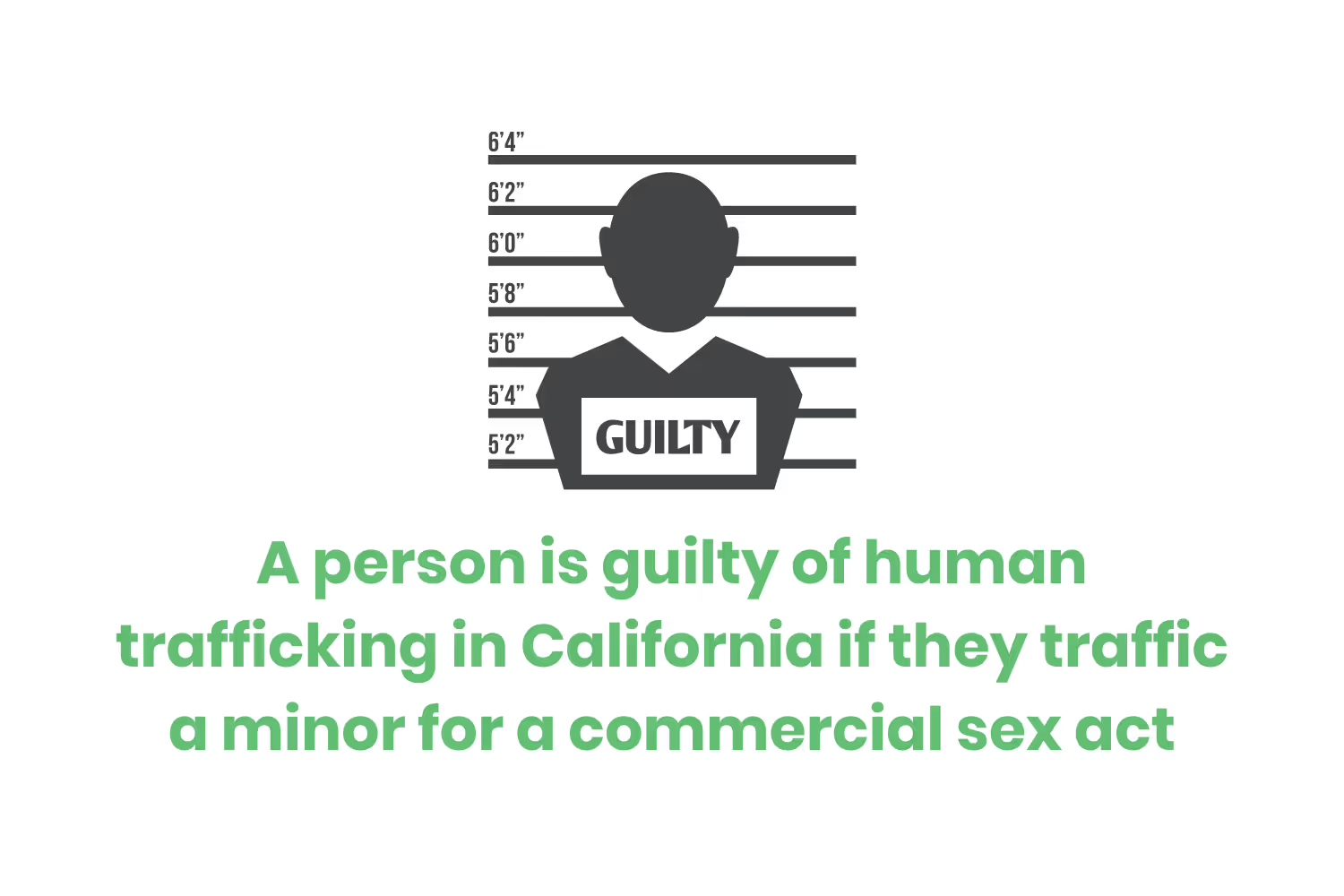
A person is also guilty of human trafficking if they cause, induce, persuade, or attempt to cause, induce, or persuade a person who is a minor at the time of the grooming to engage in a commercial sex act. A person does this to the minor with the intent to maintain the situation.
Human trafficking in the form of forced labor can lead to a prison sentence of 8, 14, or 20 years, depending on severity. If the trafficking took the form of sexual exploitation, a person can face a California prison sentence of up to 8, 14, or 20 years as well.
Persuading or attempting to persuade a minor to engage in a commercial sex act will lead to a state prison sentence of 5, 8, or 12 years.
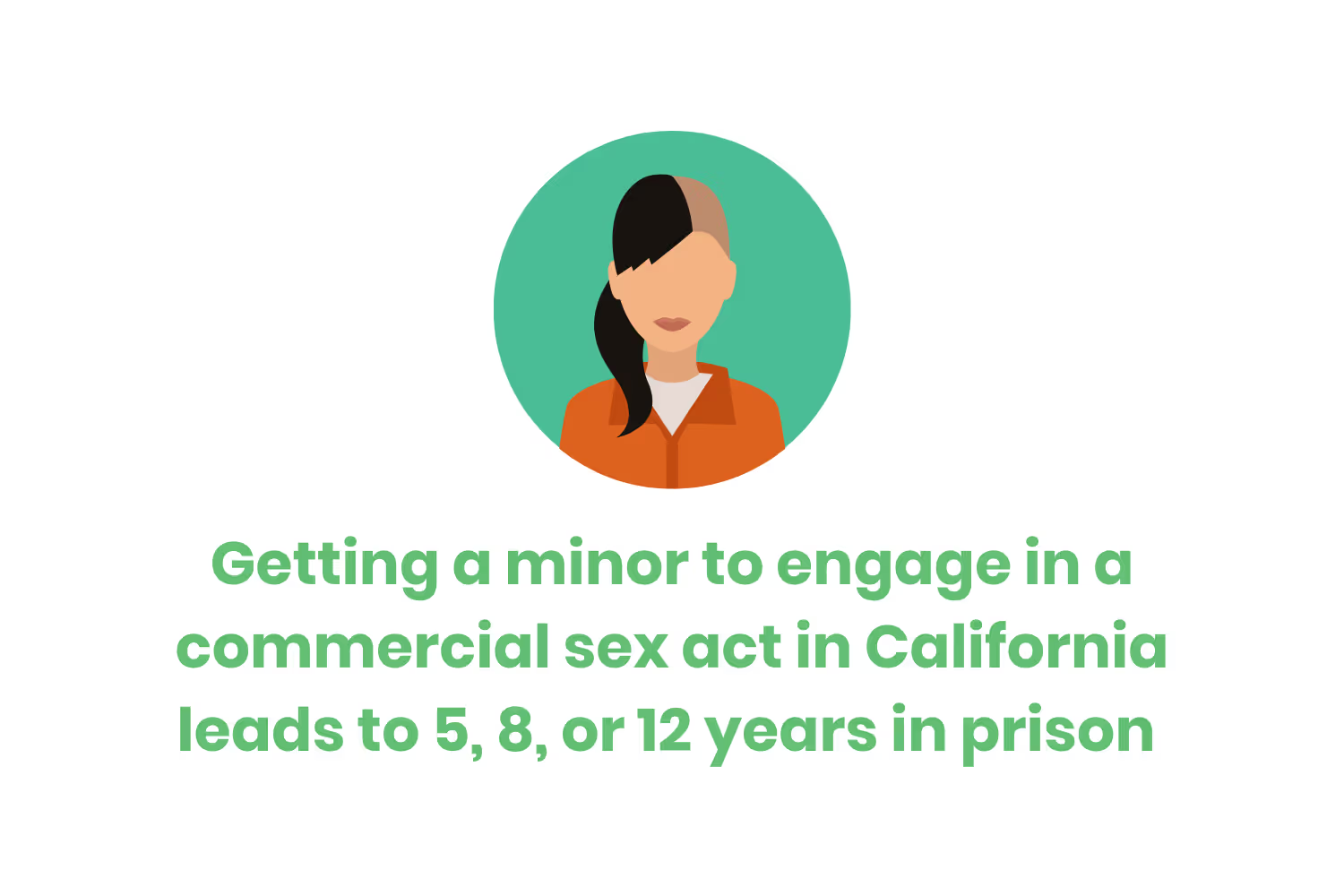
The three penalties above are “strikes” under California's Three Strike Rule. Once someone obtains three strikes, they must register as a sex offender. They will also face fines and fees of up to $500,000.
Sex trafficking of a minor by force or violence can lead to a prison sentence lasting 15 years to life. This is a serious or violent felony which is why it is not part of the “strikes” rule.
Colorado
CRS 183-503 in Colorado law makes human trafficking for involuntary servitude a felony. A person commits this felony if the perpetrator knowingly sells, recruits, harbors, transports, transfers, isolates, entices, provides, receives, or obtains a person (the victim) by any means. The perpetrator does this to coerce the victim to perform labor, services, debt bondage, or involuntary servitude.
If labor trafficking also includes sexual exploitation, it is a separate crime. We will get to this a little later in this section.
Labor trafficking is a class 3 felony in Colorado if the victim is an adult. Trafficking an adult can lead to the punishments of a 4-16 year prison stint and/or a fine ranging from $3,000 to $750,000.
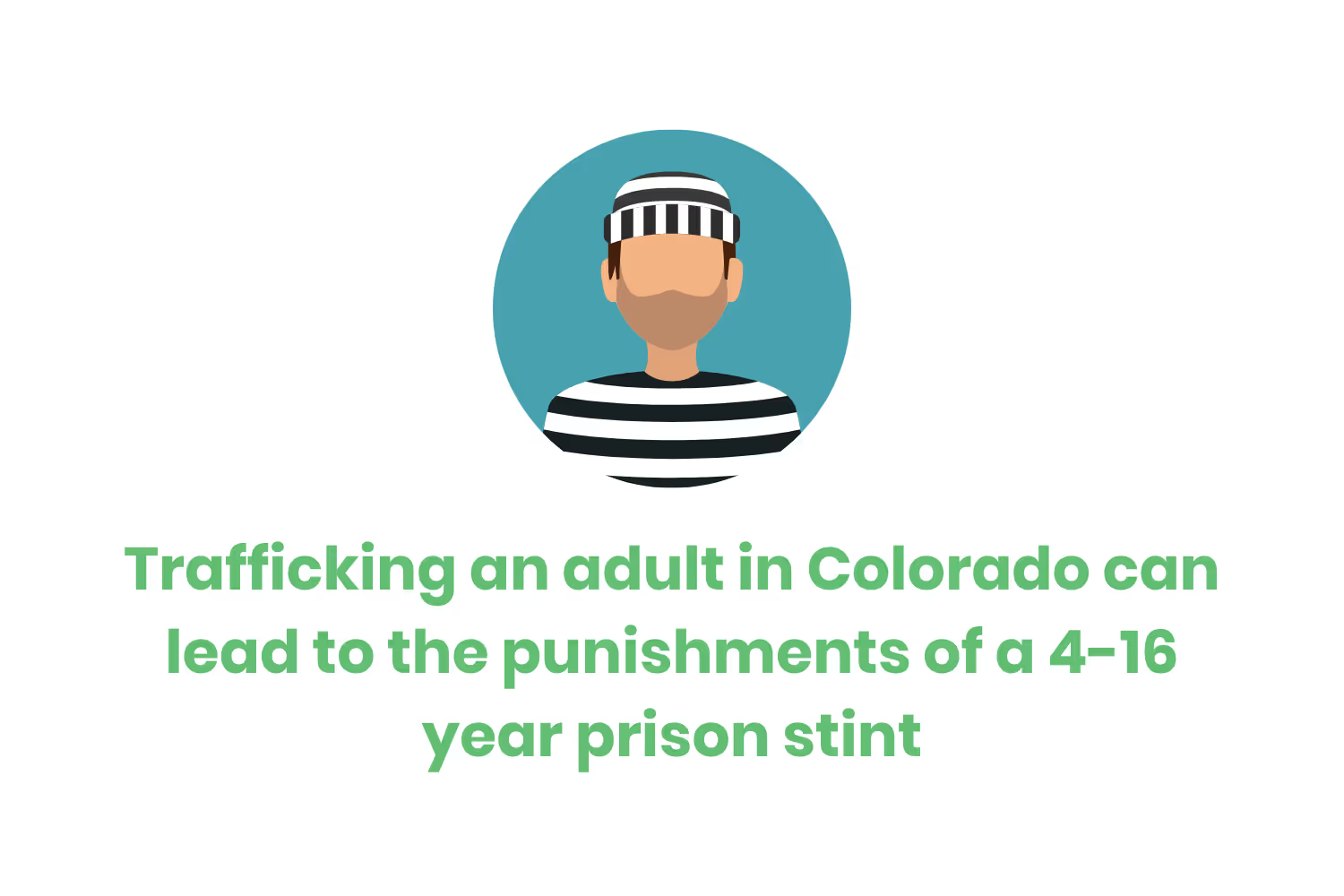
If the victim is a minor under the age of 18, the perpetrator faces a class 2 felony. Trafficking a minor for involuntary servitude also falls under the “extraordinary risk” category, giving the perpetrators an increased maximum sentence compared to other crimes in its class. Trafficking a child can lead to imprisonment lasting 16 to 48 years along with a fine ranging between $5,000 to $1,000,000.
These sentences increase if the victim faced coercion and force involving bodily harm or using/threatening to use a deadly weapon.
Let’s circle back to the sexual exploitation side of human trafficking in Colorado law.
Section 18-3-504 of Colorado’s revised statutes discusses human trafficking for sexual servitude. It involves a perpetrator knowingly selling, recruiting, harboring, transporting, transferring, isolating, enticing, providing, receiving, or obtaining another person (the victim) by any means. The perpetrator does this to coerce the victim to engage in commercial sex.
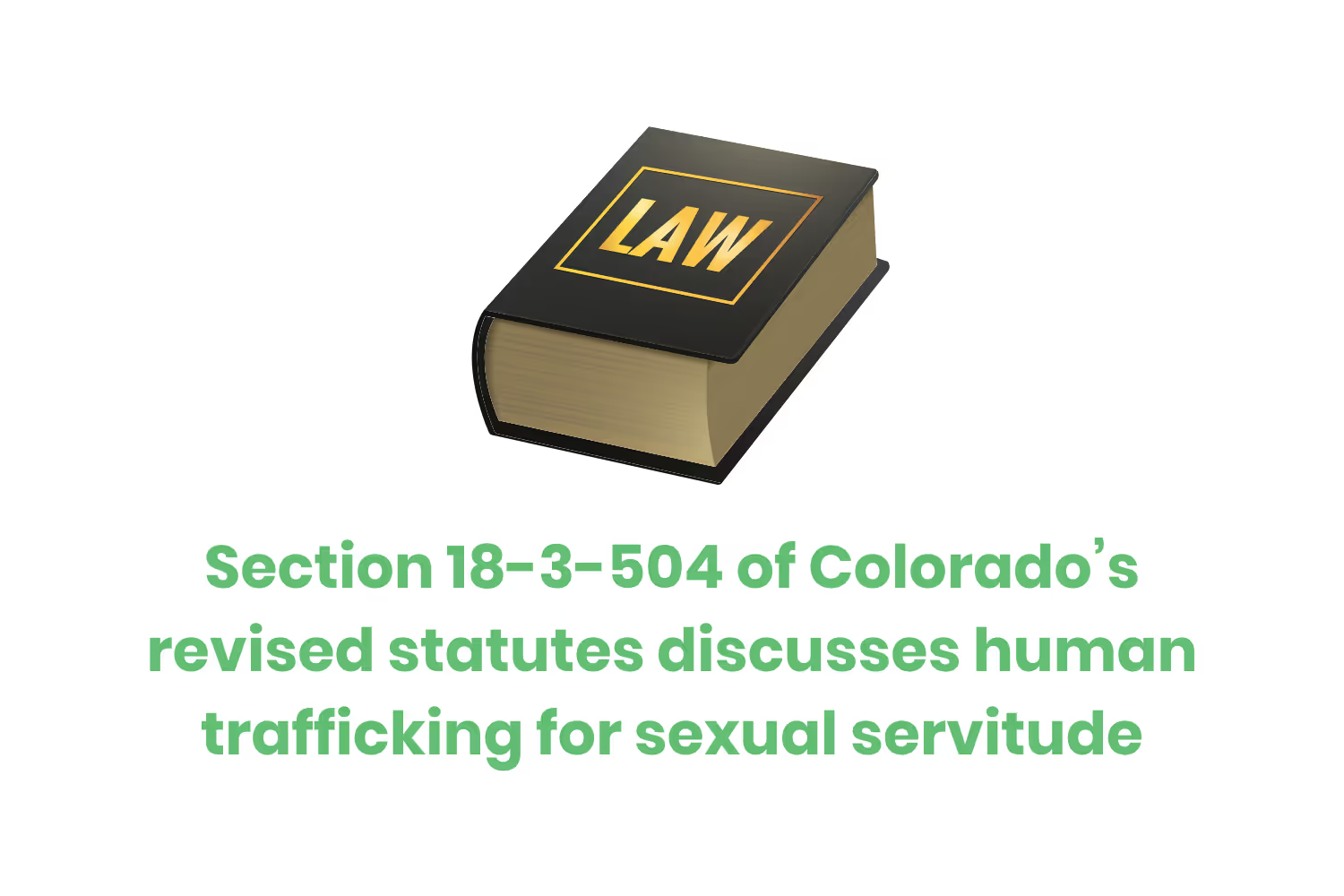
However, if the victim of human sex trafficking, the offense falls under the human trafficking of minors for sexual servitude section.
People convicted of trafficking adults for sex trafficking or commercial sex face a class 3 felony. This translates to a punishment of up to 16 years in prison. Additionally, the convicted face a fine of up to $750,000.
A person convicted of trafficking a minor for sexual servitude faces a class 2 felony. Repercussions include a maximum of 48 years in prison and a $1,000,000 fine. Anyone violating CRS 18-3-504 must register as a Colorado sex offender.
Connecticut
Connecticut General Statutes made in 2018, cited as CT Gen Stat § 53a-192a, concerns human trafficking in the state. It places Trafficking as a class A felony.
A person perpetrates human trafficking when they compel or induce another person (the victim) to engage in sexual activities with a third party. The perpetrator is also guilty of human trafficking if the victim provides labor or services when, in fact, a person can legally refrain from conducting the work.
Perpetrators go to excessive lengths to traffic their victims. The traffickers will use force against the victim or threaten to use force against the victim. Traffickers also use fraud or coercion to make their victims comply with demands.
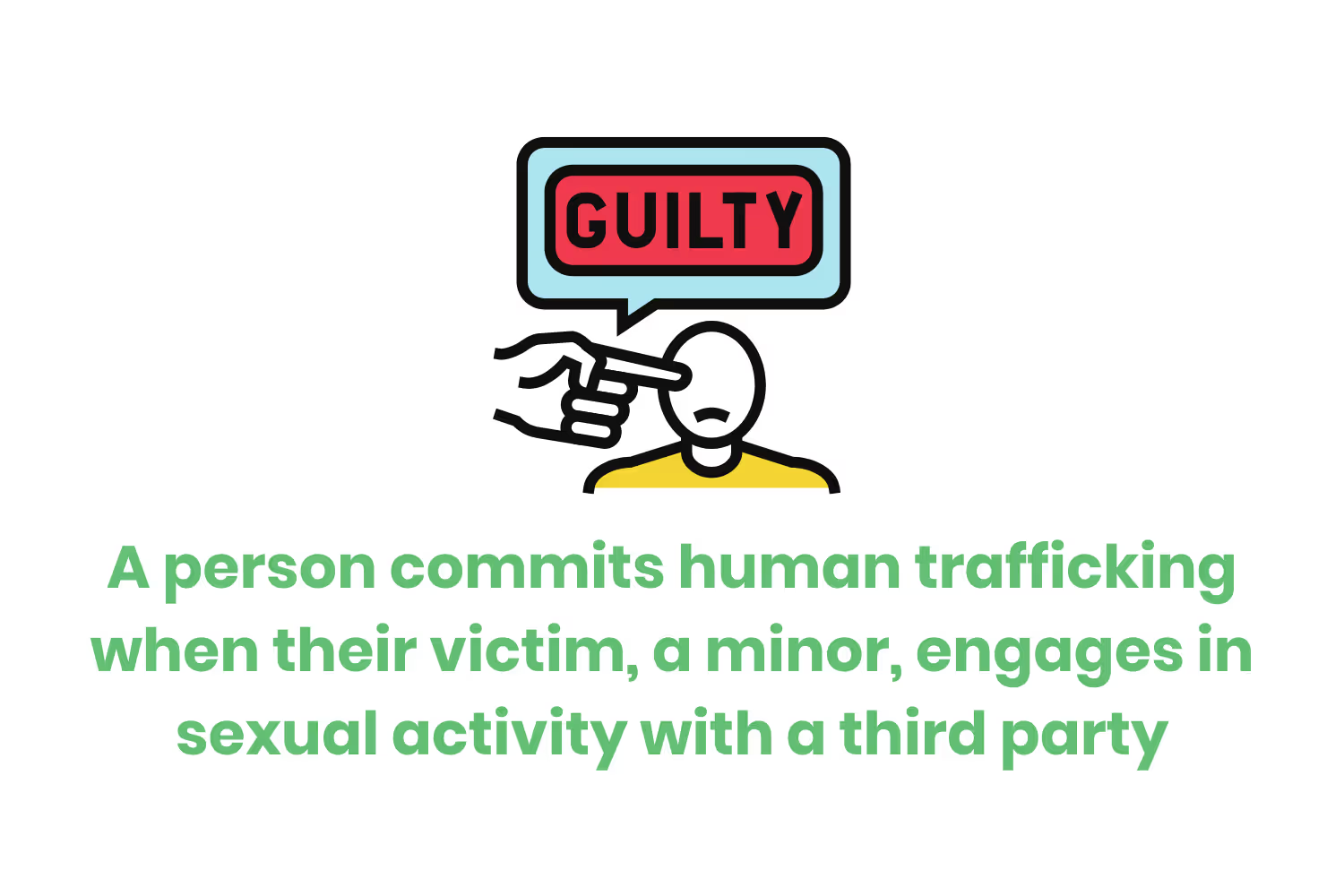
A person commits human trafficking by compelling or inducing a victim, a minor under the age of 18, to engage in sexual activity with a third party. This sexual activity can lead to the conviction of the third party for engaging in sexual activity with a minor.
Connecticut law may find a person guilty of human trafficking for simply committing a sex trafficking act.
As I mentioned earlier, trafficking is a class A felony in Connecticut. This means that someone convicted of such a crime can face imprisonment between 10 to 25 years and/or fines of up to $20,000. The state allows the court to impose a standing criminal protective order against anyone convicted of trafficking when a victim is a minor.
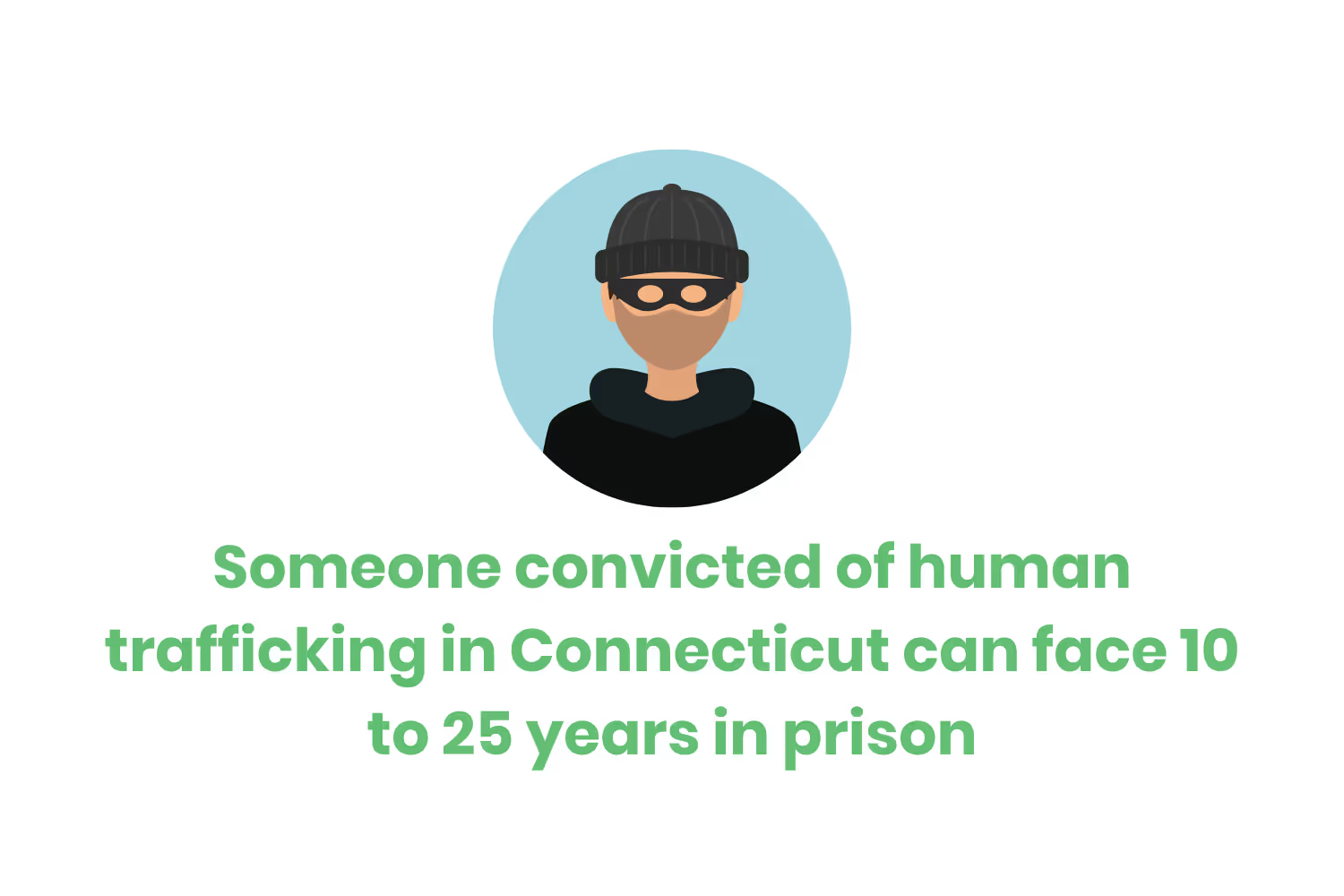
Connecticut has something called the Corrupt Organization Racketeering Act, or CORA, which makes human trafficking a predicate crime. CORA allows police to wiretap suspects without a warrant in human trafficking investigations. A person that engages in trafficking can face prosecution under CORA in addition to the punishments mentioned above.
A unique feature of CORA is the persecution of underlying crimes. This means that someone can also face charges of rape, threats with a deadly weapon, abuse, negligence, and more depending on the situation.
Delaware
Delaware’s definition of human trafficking is extensive. The code for the law is 2 DE Code § 787.
According to Delaware law, someone commits the crime of human trafficking if the person consciously recruits, transports, harbors, receives, provides, obtains, isolates, maintains, or entices an individual. Furthermore, the person is guilty if they take these actions to subject the victim to forced labor or sexual servitude.
If a person takes these actions, they committed a class C felony. This changes if the victim is a minor. Trafficking a minor as described above is a class B felony.
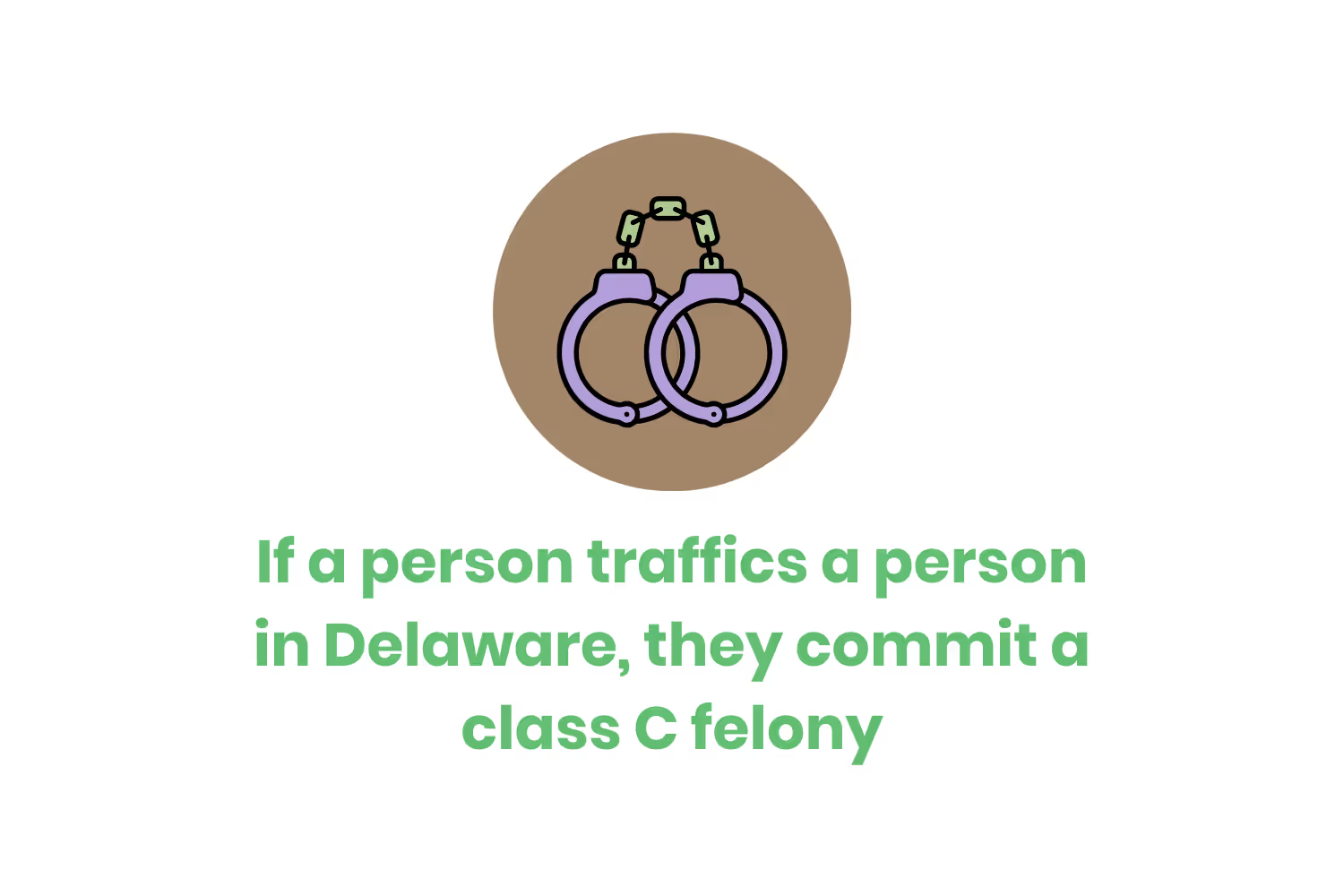
Delaware’s definition continues to define how someone commits the crime of labor trafficking. To fall under this definition, a person must knowingly use coercion to compel their target (their victim) to provide labor or services.
Such actions are a class C felony unless the victim is a minor. If the target is under the age of 18, the trafficking becomes a class B felony.
This said, there is an exception. If the labor or service is permissible under federal law or Delaware law, then the series of events is not forced labor trafficking.
Since Delaware law details forced labor, it also details sexual servitude as a form of trafficking. Sex trafficking occurs when the perpetrator knowingly procures a minor to have them engage in commercial sexual activity. It also happens when the perpetrator uses coercion or deception to lead an adult to engage in commercial sexual activity.
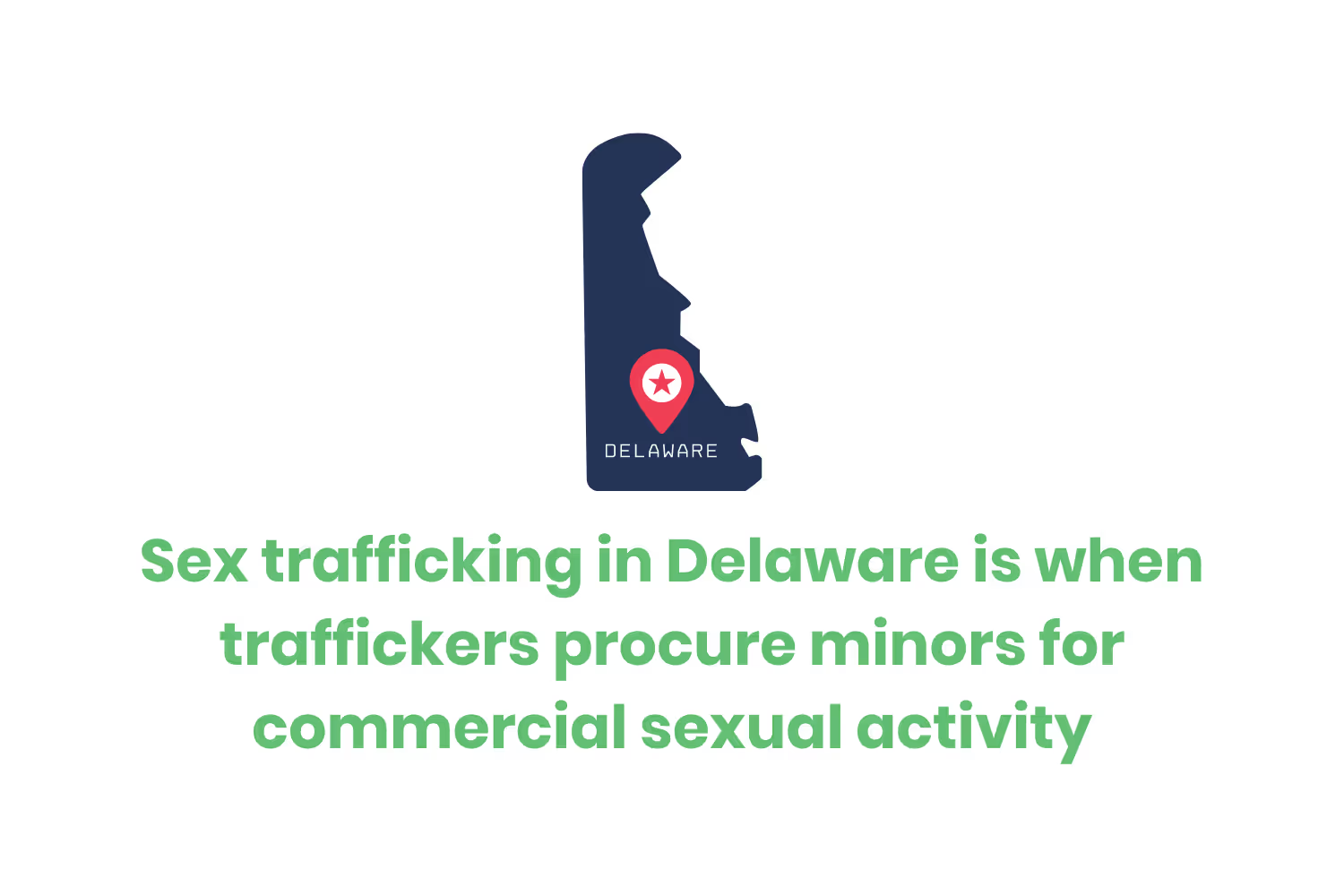
Someone who commits this crime against an adult faces a class C felony. Someone who commits this crime against a minor can face a class B felony.
Sometimes sex trafficking deals with something called patronizing. This is where the trafficker knowingly gives, agrees to give, or offers to give something of value so that the victim is more likely to engage in sexual activity with a john. The john must also know that their sex partner is a victim of sexual servitude.
Delaware law recognizes this phenomenon. Patronizing a victim of sexual servitude is a class D felony unless the victim is a minor, in which case the action is a class C felony.
Unlike the federal definition of human trafficking, Delaware recognizes that trafficking can occur in the form of organ harvesting.
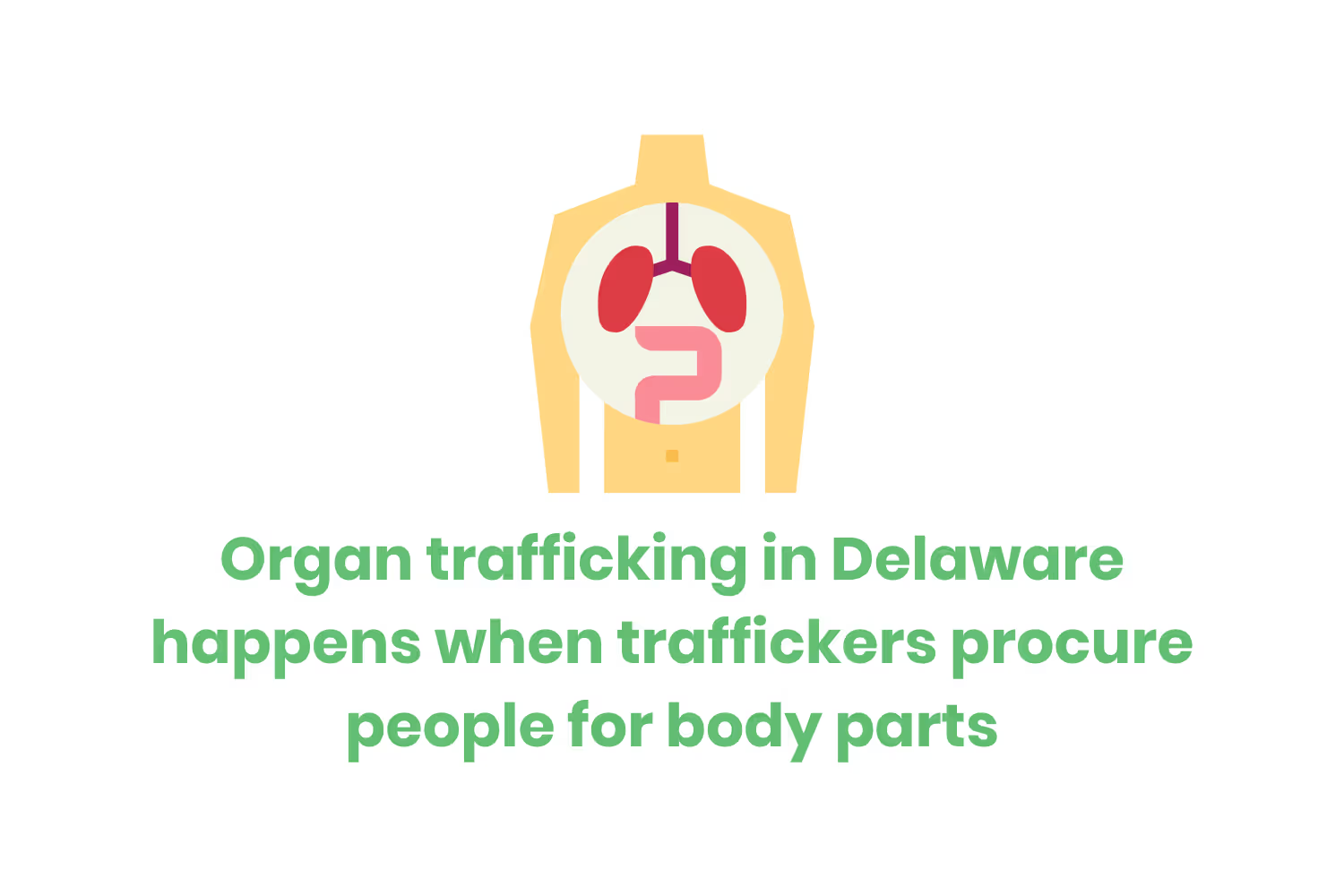
A person is guilty of trafficking people for body parts when the perpetrator knowingly recruits, entices, harbors, provides, or obtains by any means a person (the victim). The trafficker does so with the intent or knowledge that the victim will have body parts removed for sale.
Someone can also face charges for organ trafficking if they benefit, financially or by receiving something of value, from participating in this type of trafficking process. Trafficking people to use their body parts is a class A felony.
Florida
Florida’s definition of human trafficking, located under §787.06(2)(d), F.S, is on the shorter side of state definitions. However, the state does have an extensive list of how someone can commit a felony concerning human trafficking.
Florida says that trafficking involves transporting, soliciting, recruiting, harboring, providing, enticing, maintaining, or obtaining an individual (the victim) to exploit the said victim.
Short, right?
The law proceeds to outline all of the different types and levels of felonies and who may face prosecution. They are as follows…
- If someone is trafficking a child younger than the age of 18, whether or not the trafficker knows the individual knows the child is a minor, they commit a felony of the first degree.
- The same is true if the trafficker is an unauthorized alien.
- Any use of coercion in the labor trafficking of an adult is a first-degree felony.
- The same is true if the trafficker is an unauthorized alien.
- Any use of coercion in the sex trafficking of an adult living in the state legally is a first-degree felony.
- Any use of coercion in the sex trafficking of an unauthorized alien adult is a first-degree felony.
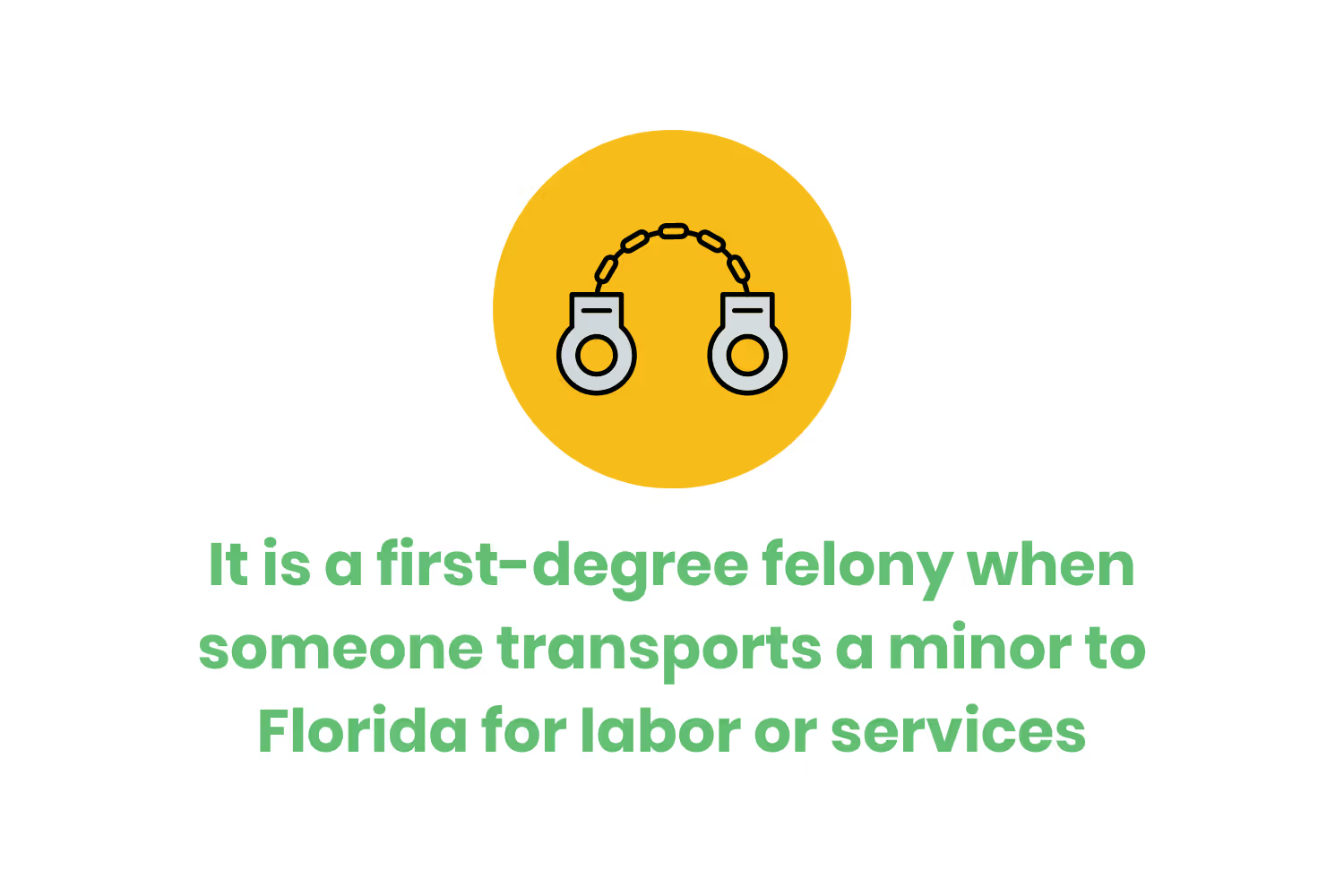
- A trafficker commits a first-degree felony if they transport any child younger than 18, whether or not the trafficker knows the victim is an adult, from outside the state to the state of Florida for labor or services.
- The same is true if the trafficker targets an adult from outside the state.
- A trafficker commits a first-degree felony if they transport any child younger than 18, whether or not the trafficker knows the victim is an adult, from outside the state to the state of Florida for commercial sexual activity.
- This is punishable by imprisonment, but not a life sentence.
- A trafficker commits a first-degree felony if they take the same actions against an adult.
With this said, any individual who knowingly engages in, benefits financially, or benefits from obtaining something else of value can face prosecution. Additionally, any individual who recklessly disregards the facts for the same reason can face prosecution.
The government can prosecute instances of human trafficking offenses under RICO as organized crime offenses. This means that if several people are conspiring to traffic an individual in Florida, they can face crimes related to organized crime.
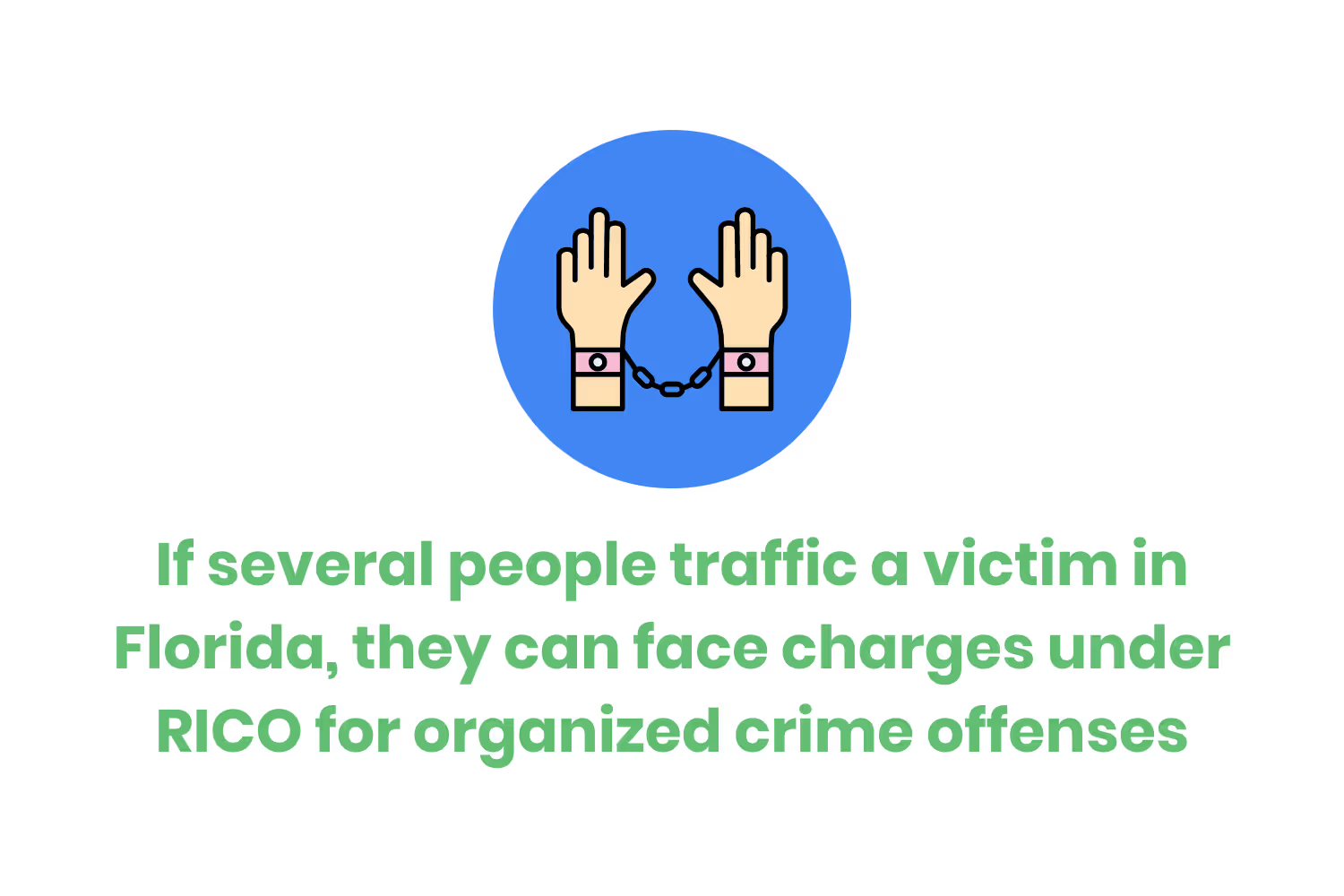
Florida specifically states that minors cannot consent to commercial sex in the state. Additionally, minors will not face arrest or prosecution for their participation in prostitution.
Where there is prostitution, there are people purchasing sex. Buyers of minors who intend to exploit them for commercial sexual activities can face charges as human traffickers.
Lastly, the degree of any offense can increase if the victim endured great bodily harm, permanent disability, or permanent disfigurement while trafficked. If this happened to the victim, a second-degree felony will upgrade to a first-degree felony. Similarly, a first-degree felony will upgrade to a life felony.
Georgia
Anyone participating in human trafficking in Georgia faces felony charges. But what is human trafficking according to Georgia law?
Labor servitude happens when the perpetrator knowingly subjects or maintains someone (the victim) in labor servitude. This perpetrator also knowingly recruits, entices, harbors, transports, provides, or obtains the victim by any means for labor servitude.
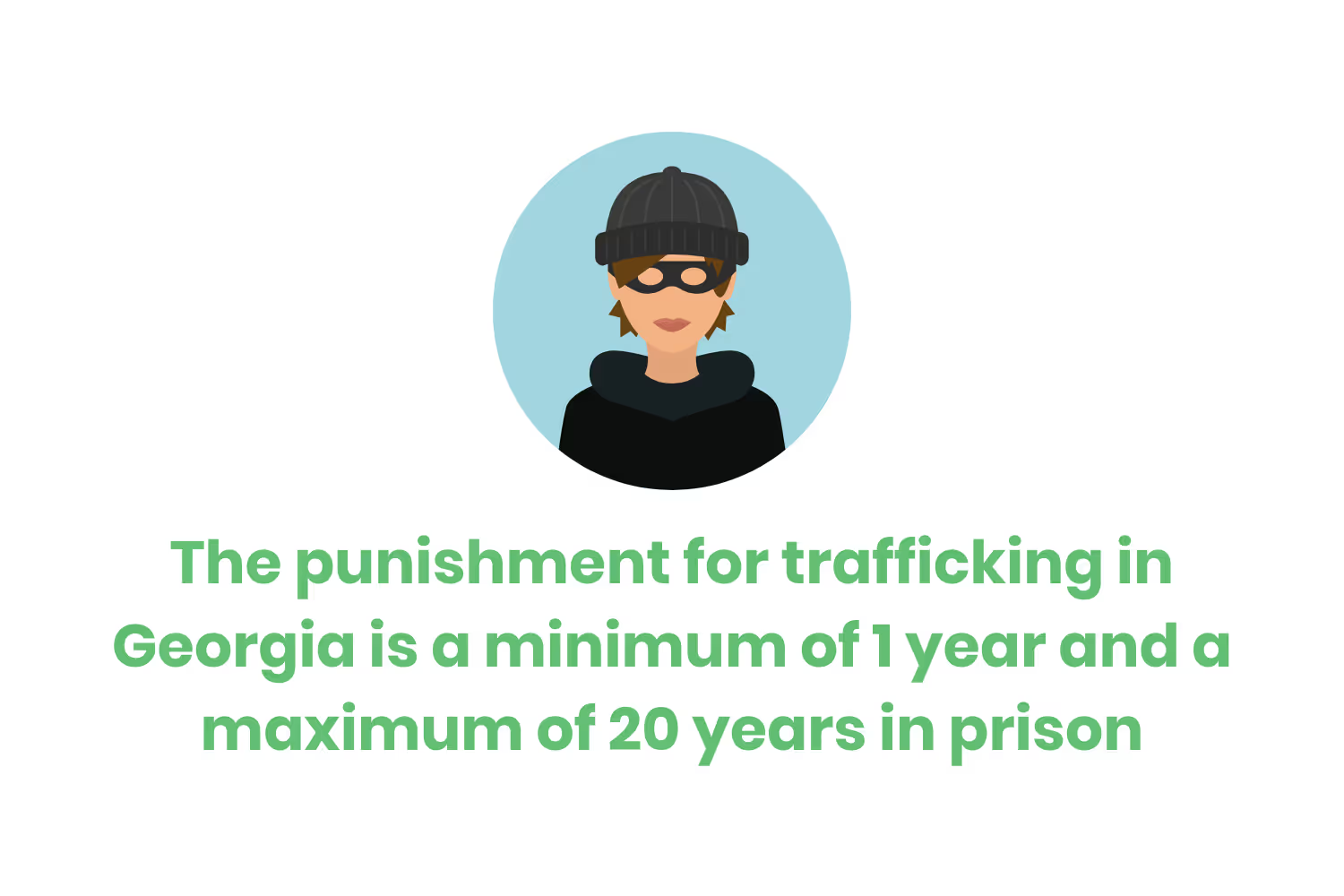
Sexual servitude occurs when a person knowingly subjects or maintains their target/victim in sexual servitude. This person knowingly recruits, entices, harbors, transports, provides, or obtains their target by any means for sexual servitude.
Anyone committing these offenses of human trafficking is guilty of a felony. If convicted, the defendant will face a minimum of one and a maximum of 20 years in prison.
If a person trafficks a minor under the age of 18, they also face felony charges. If convicted, the defendant faces a minimum of 10 years in prison and a maximum of 20 years.
Each violation of this section of Georgia law is a separate offense. Human trafficking offenses will not merge with any other offense.
Hawaii
Hawaii’s definition of human trafficking pertains explicitly to sex trafficking. Under Hawaii law, a person commits the crime of sex trafficking in one of two ways.
First, human trafficking advances prostitution by compelling or inducing a person by…
- Force
- Threat
- Fraud
- This includes making false statements, misstatements, or omissions.
- Intimidation
This happens to engage in prostitution. A person is also guilty if they take these actions to profit from this conduct.
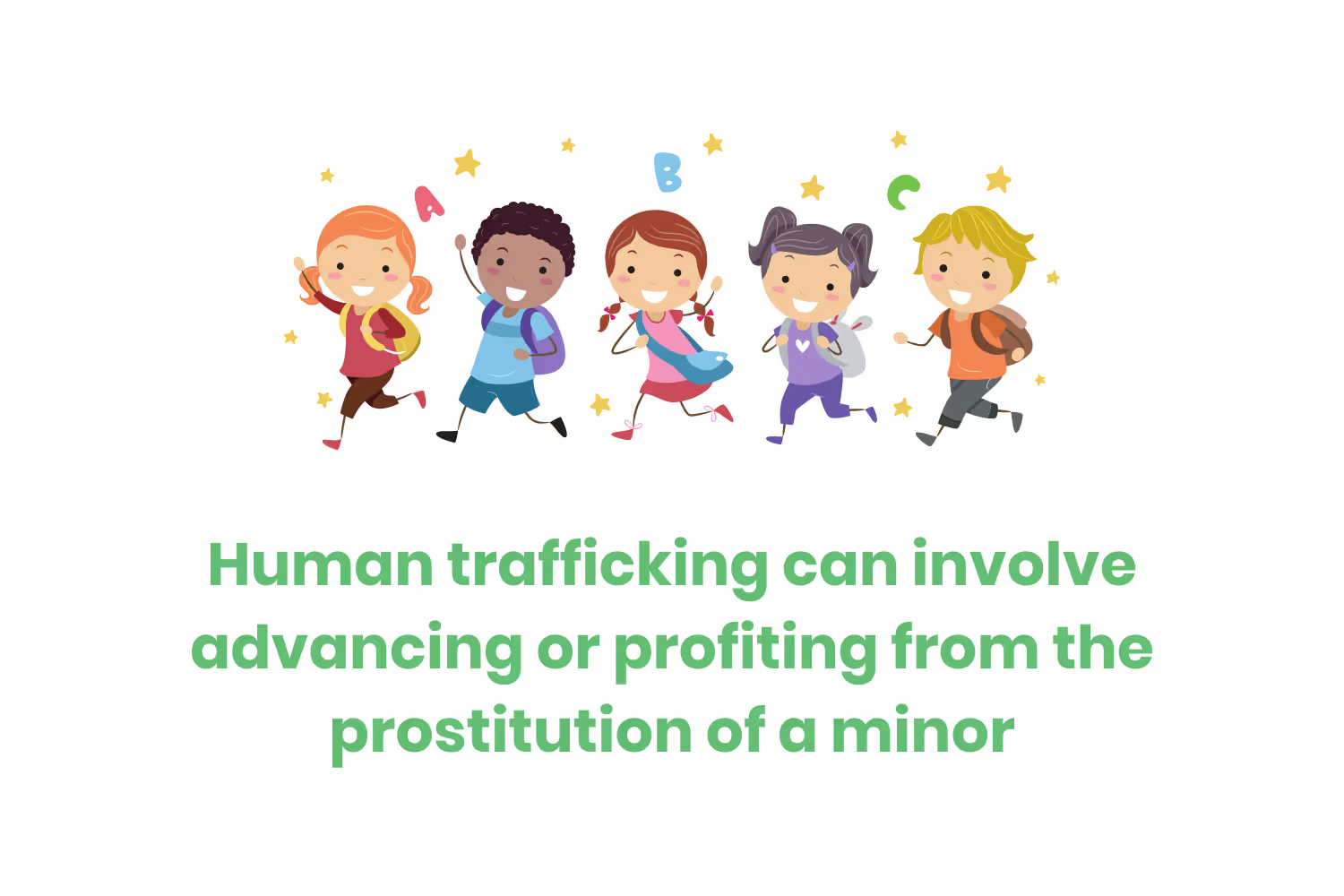
Second, human trafficking involves advancing or profiting from the prostitution of a minor. If the alleged victim is under 18 years old, the prosecution only needs to prove that the offender acted negligently.
Idaho
The state of Idaho defines human trafficking into two segments: sex trafficking and labor trafficking.
Sex trafficking in Idaho is where commercial sexual activity happens through the use of force, fraud, or coercion. It is also where the person forced to perform sexual activities is under the age of 18.
Labor trafficking in the state is the recruitment, harboring, transportation, or obtaining of a person for labor or services. This happens through the use of force, fraud, or coercion to subject someone to…
- Involuntary servitude
- Peonage
- Debt bondage
- Slavery
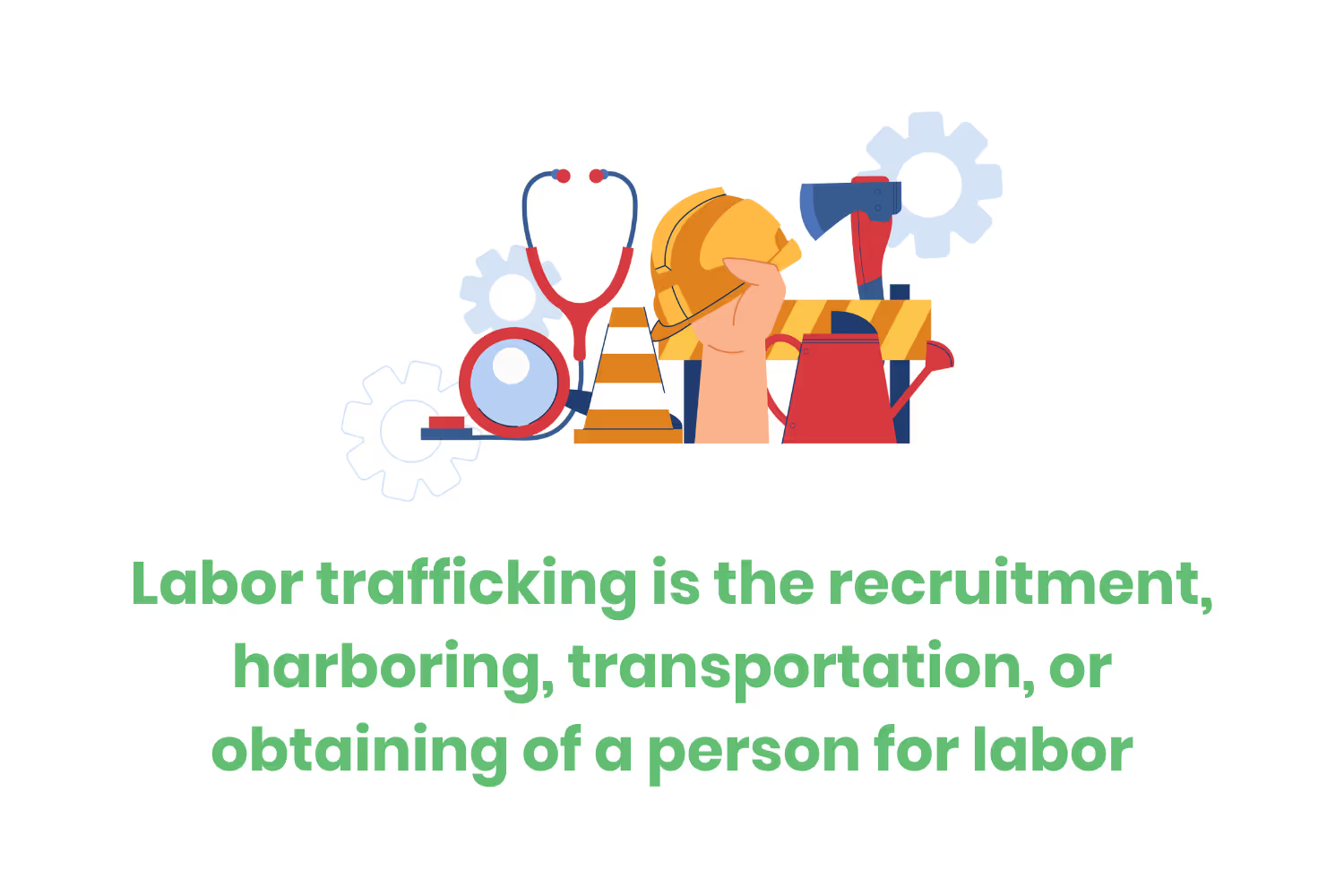
Idaho goes into detail about five different ways of what “force, fraud, or coercion” can entail. These methods include…
- Threatening serious harm or threatening restraint against the victim or a third party
- A third party may be a family member or a significant other of the victim
- Destroying, concealing, removing, or confiscating legal documentation
- Such documents may include…
- Passports
- Immigration papers
- Any other government-issued identification documents
- Such documents may include…
- Abusing or threatening abuse of the law against the victim or third party
- This also includes abusing the legal process
- Using someone’s debt to secure services.
- The reasonable value of said services is not utilized to liquidate the debt
- The length and nature of the services are not limited and defined upon the start of the service
- This means that the recipient of the services will keep the debtor working for far longer than necessary, making it impossible for the debtor to seek freedom
- This also applies to the personal services of someone under the debtor’s control as security.
- Using servitude against someone through any schemes, plans, or patterns.
- Any reasonable person would believe that if the victim did not enter into or continue servitude, they would suffer…
- Serious harm
- Physical restraint
- Abuse of legal proceedings
- This could also happen to a third person that is not the debtor.
- Any reasonable person would believe that if the victim did not enter into or continue servitude, they would suffer…

In Idaho, sex trafficking includes any form of commercial sexual activity. Sexual conduct, contact, explicit performance, prostitution, or participation in the production of pornography are all forms of commercial sex activities.
The law continues to define commercial sexual activity. It is any sexual contact or sexual contact in exchange for anything of value, no matter if it is legal or illicit. It is illegal for the gifter, recipient, promiser, or anyone else involved to exchange "payment" for such acts.
Illinois
Involuntary servitude in the state of Illinois is when someone subjects, or tries to subject, a person to labor or services. The perpetrator maintains the situation through several means, including…
- Causing or threatening to cause physical harm to any person
- Physically restraining or threatening to restrain another person
- Abusing or threatening to abuse the law or legal process
- Knowingly destroying, concealing, removing, confiscating, or possessing any actual or alleged documentation, including…
- Passports
- Immigration documents
- Any other government identification document
- Using intimidation, or exerting financial control over someone
- Using any scheme, plan, or pattern intended to cause the person to believe that they (or another person) would face serious harm or physical restraint if the victim did not comply with demands.
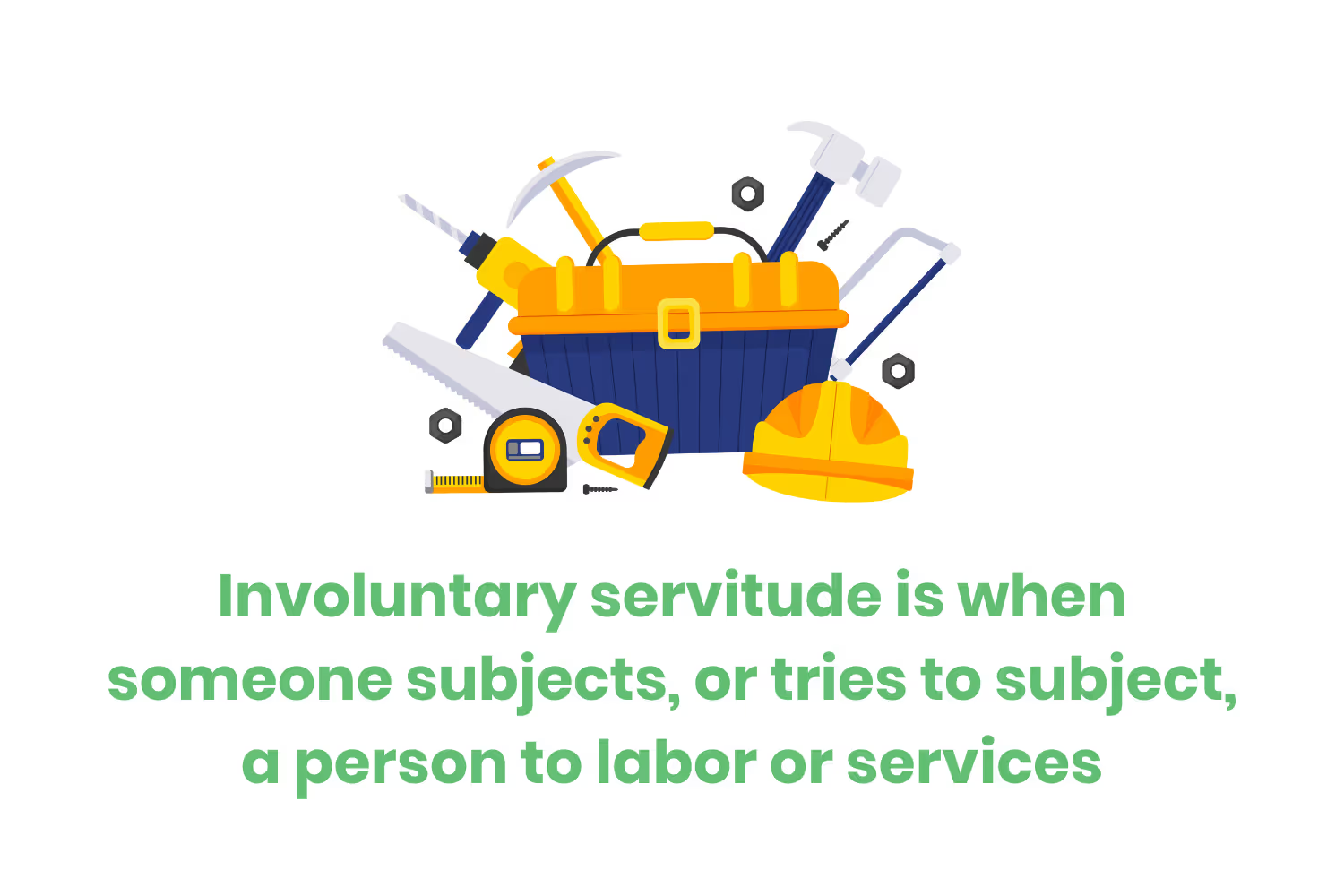
Illinois law continues to outline involuntary sexual servitude of a minor. This is when someone knowingly or attempts to recruit, entice, harbor, provide, or obtain by any means, another person under 18 years of age. This takes place while knowing the minor will engage in…
- Commercial sexual activities
- Sexually-explicit performance
- The production of pornography
This occurs without any overt force or threat. This includes situations where the minor is under the age of 17 and if the minor is between the ages of 17 and 18 years.

According to Illinois law, human trafficking is when the perpetrators knowingly or attempt to recruit, entice, harbor, transport, provide, or obtain a person by any means. This takes place with the intention or knowledge that the victim will endure involuntary servitude. A person can also commit the crime of trafficking if they benefit financially, or by getting something else of value, from the involuntary servitude or sexual servitude of a minor.
A company can commit the crime of trafficking if the company knowingly benefits financially, or by receiving something of value, from participating in the involuntary servitude or the involuntary sexual servitude of a minor.
Indiana
In Indiana law, a person illegally promotes human trafficking if they, by the threat of force or fraud, knowingly or intentionally recruit, harbor, or transport another person to…
- Engage that person in
- Forced Labor
- Involuntary servitude
- Force that person into
- Marriage
- Prostitution
- Sexual conduct
A person illegally promotes the human trafficking of a minor when they knowingly or intentionally recruit, harbor, or transport a child.

Perpetrators do this to children under the age of 18 with the intent to…
- Engage the child in
- Forced labor
- Involuntary servitude
- Induce or cause the child to
- Engage in prostitution or juvenile prostitution
- Engage in performance or incident that includes sexual conduct
If the child is 16 years old or younger, then any intent to induce or cause the victim to participate in sexual conduct promotes the human trafficking of a minor.
Iowa
According to Iowa law, human trafficking means participating in a venture to recruit, harbor, transport, supply provisions, or obtain a person for labor or sex trafficking.
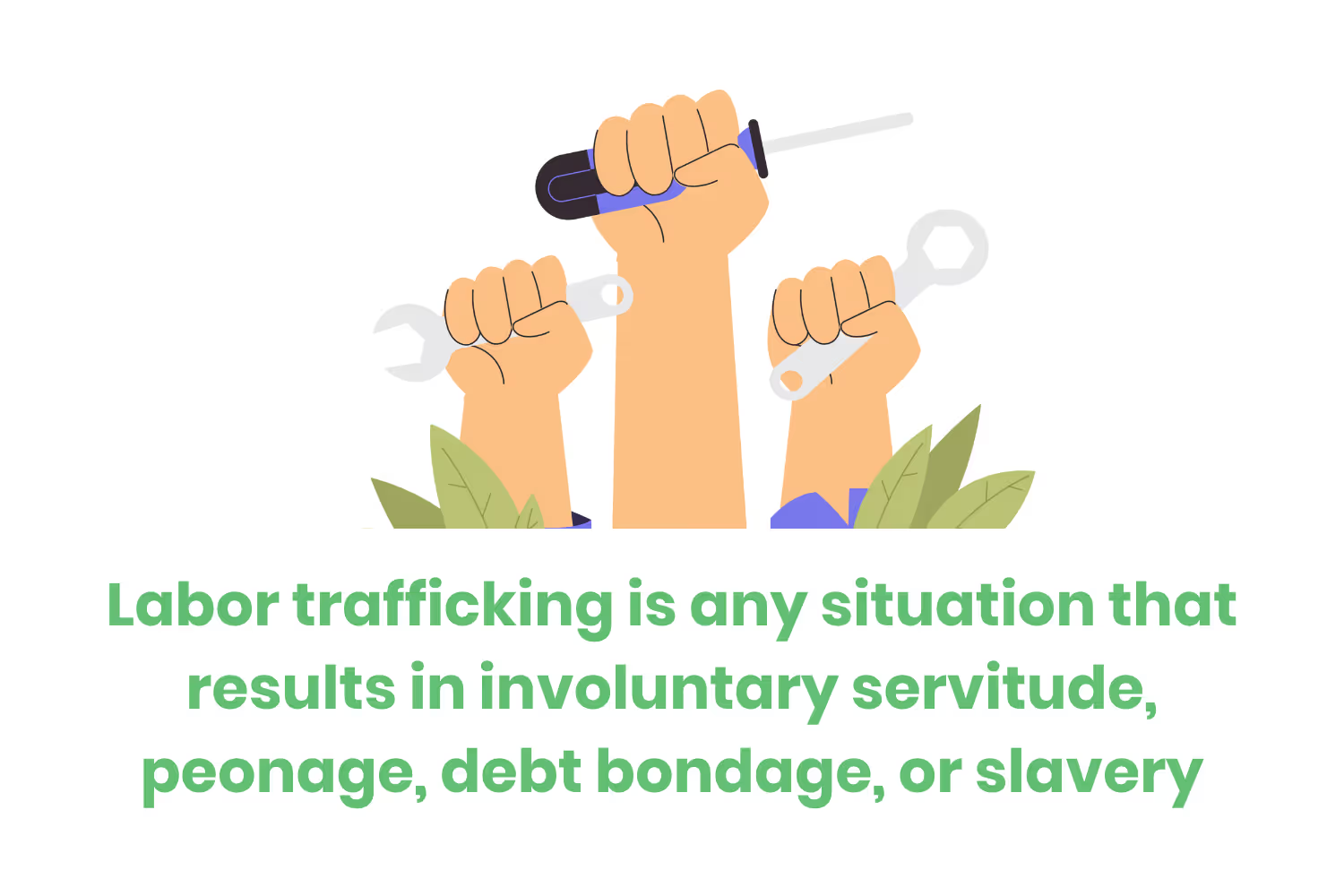
In Iowa, labor trafficking is any forced labor situation that results in involuntary servitude, peonage, debt bondage, or slavery. Forced labor means labor or services performed or provided by another person. Maintaining or obtaining such exercises happens through…
- Causing serious physical injury to anyone
- Threatening to cause serious physical injury to anyone
- Physically restraining another person
- Threatening to physically restrain another person
- Abusing the law or legal process
- Threatening to abuse the law or legal process
- Knowingly destroying, concealing, removing confiscating, or possessing any actual or purported government identification of another person
- Knowingly providing or facilitating the forgery of a license to the perpetrator to force, coerce, entice, assist, facilitate or permit the other person to perform labor or services
- Knowingly providing or facilitating the forgery of a government identification document to the perpetrator to force, coerce, entice, assist, facilitate or permit the other person to perform labor or services
- Knowingly forcing, coercing, enticing, assisting, facilitating, or permitting someone in possession of a forged license to produce the license to a peace officer
- Knowingly forcing, coercing, enticing, assisting, facilitating, or permitting someone in possession of a forged government identification document to produce the document to a peace officer
- Knowingly forcing, coercing, intimidating, or compelling another person into debt bondage, forced servitude, or any action as a condition of coming into or remaining in the United States.

Sex trafficking is any commercial sexual activity performed through the use of force, fraud, or coercion. There is an exception: the trafficking person is under the age of 18. If this is the case, the commercial sexual activity doesn’t need to involve force, fraud, or coercion for the venture to be human trafficking.
Human trafficking also means knowingly purchasing services involving commercial sexual activity from a victim or someone involved in human trafficking. Simply trying to purchase sexual services is also human trafficking.
Kansas
According to a 2012 statute, human trafficking in the state of Kansas is when someone intentionally recruits, harbors, transports, provides, or obtains a person (their victim) for labor or services. This happens through the use of force, fraud, or coercion to subject the victim to involuntary servitude or labor.
Someone also commits the crime of human trafficking if they intentionally benefit from participating in trafficking activities, as mentioned above. This includes financial gains or receiving anything of value to promote and execute human trafficking.
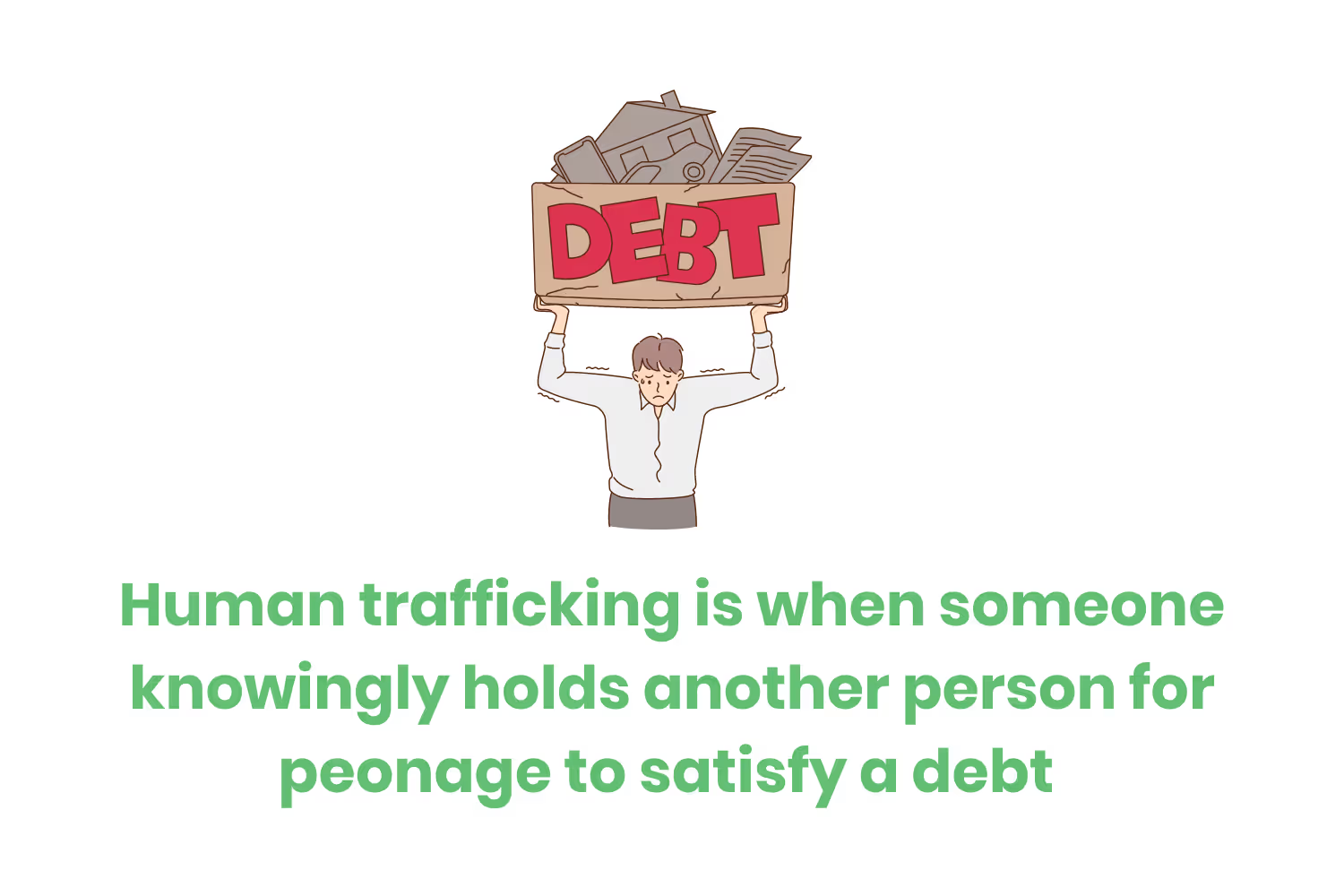
Human trafficking is also when someone knowingly coerces employment by obtaining or maintaining labor/services that happen in at least one of the following circumstances:
- Causing or threatening physical harm to anyone
- Physically restraining another person
- Threatening to physically restrain another person
- Abusing or threatening to abuse a law/legal process
- Threatening to withhold food, housing, or clothing
- Knowingly destroying, concealing, confiscating, removing, or possessing any actual legal identification of another person
- Knowingly destroying, concealing, confiscating, removing, or possessing any purported government ID of another person
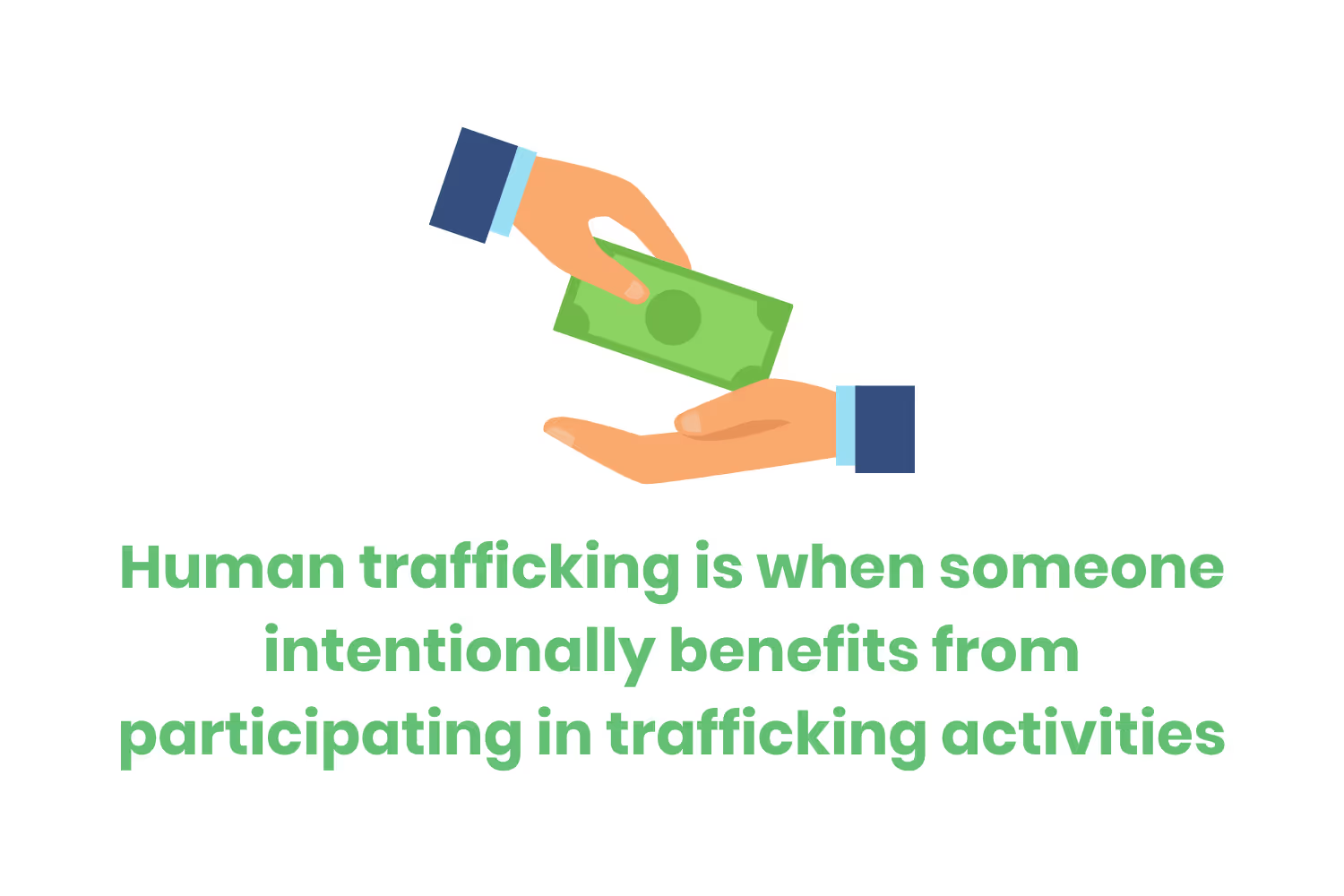
If someone knowingly holds another person for peonage to satisfy a debt owed to them, this is also considered human trafficking. In this definition, “peonage” means involuntary servitude where the victim has to work for another person. The trafficker uses threats of physical restraint or physical injury to make the victim comply. They can also use or threaten to use the law to coerce the victim into compliance.
Kentucky
Kentucky has a very broad definition of human trafficking. According to Kentucky’s Revised Statute § 529.100, a person is guilty of human trafficking when the person intentionally subjects one or more persons to engage in forced labor or services.
Similarly, a person is guilty of human trafficking when they intentionally subject one or more persons to engage in commercial sexual activity. This may happen through the use of force, fraud, or coercion.
There is one exception to this second definition. If the victim is under the age of 18, the commercial sexual activity doesn’t need to involve force, fraud, or coercion. Because the victim is a minor, anyone who allows them or forces them to engage in sexual exploitation is automatically guilty of human trafficking.
In Kentucky, human trafficking is a Class C felony. If the trafficked person suffered serious physical injury, the charges increase to a Class B felony.
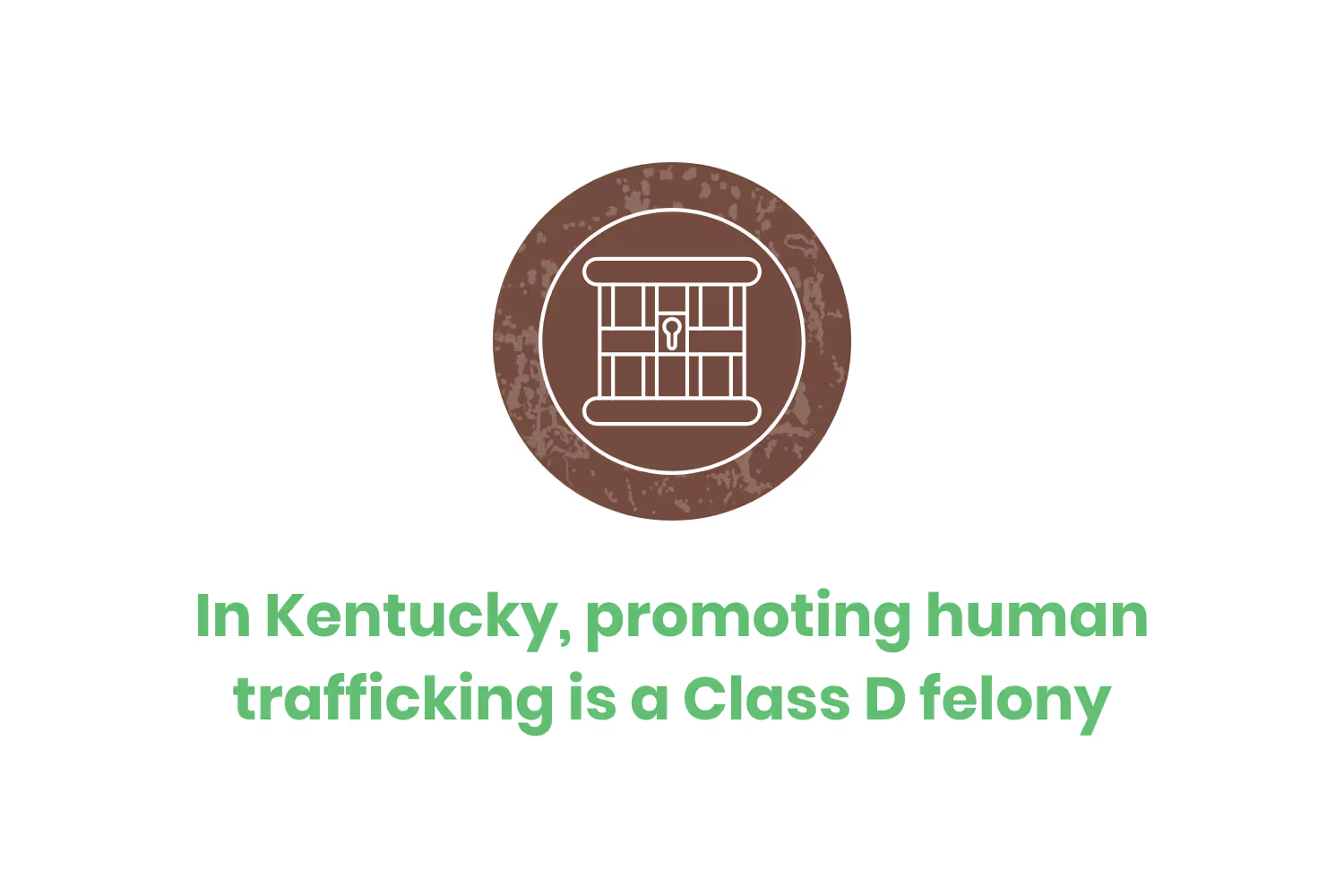
If the trafficking victim is under the age of 18, the offense will increase by one level. This means that if someone is originally charged with a Class C felony, the charge would increase to a Class B felony. If someone is originally charged with a class B felony, the charge would increase to a Class A felony.
Furthermore, the Revised Statute § 529.110 discusses the promotion of human trafficking. In this section of the law, Kentucky says that a person is guilty of promoting human trafficking when they intentionally benefit financially or receive anything of value from conscious participation in illegal activities.
A person is also guilty of promoting human trafficking when they intentionally recruit, entice, harbor, transport, provide, or obtain by any means another person knowing that their target will be subject to human trafficking. Any attempts to take these actions will also make a person guilty of promoting human trafficking.
In Kentucky, promoting human trafficking is a Class D felony. It becomes a Class C felony if the trafficking victim is under the age of 18.
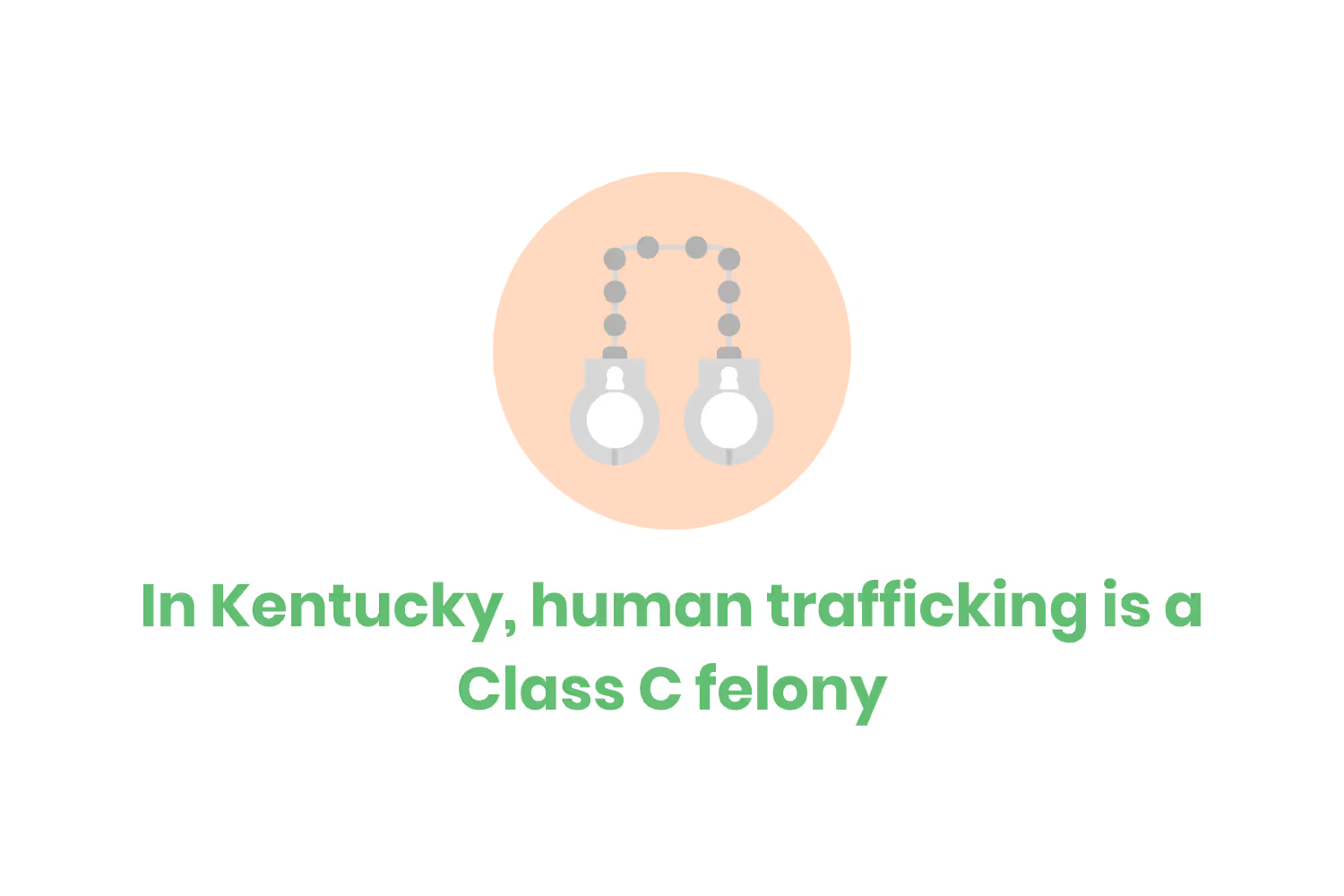
Louisiana
In the Louisiana State Legislature, Revised Statute § 14:46.2 discusses the illegality of human trafficking.
According to the law, it is illegal for any person to knowingly take the following actions against another person to provide labor services:
- Recruit
- Harbor
- Transport
- Provide
- Solicit
- Receive
- Isolate
- Entice
- Obtain
- Patronize
- Procure
- Purchase
- Hold
- Restrain
- Induce
- Threaten
- Subject
- Maintain

Now when I say “labor services”, Louisiana defines this as any activity that has an economic value.
Similarly, it is unlawful for any person to knowingly take one of the actions listed above against a person under the age of 21 to engage in commercial sexual activity. It is illegal to do so regardless of any force, fraud, or coercion happening.
In this case, “commercial sexual activity” in the state of Louisiana means any sexual act performed/conducted when anything of value was directly or indirectly given, promised, or received by anyone. This includes the production of pornography.
It isn’t a defense against allegations if the alleged trafficker didn’t know the age of the victim. Similarly, claiming that the victim consented to the prohibited activity is not a valid defense.
It is illegal in the state of Louisiana for any person to knowingly benefit from any activity listed above when it involves human trafficking. It is also illegal to knowingly facilitate any of the actions listed above by any means, regardless if someone received any promised item of value by the person.
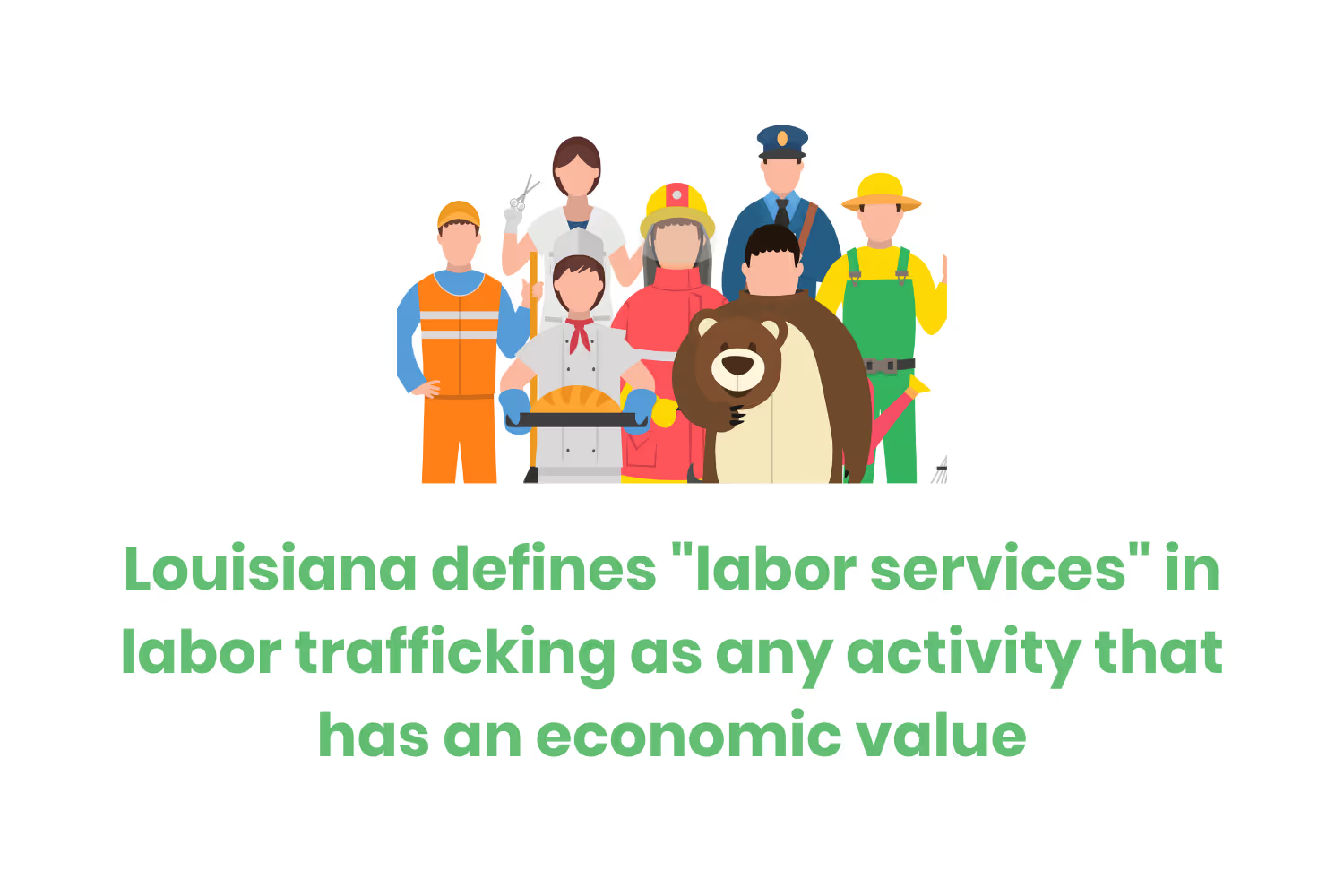
This includes, but is not limited to…
- Aiding
- Abetting
- Conspiring
Anyone who commits the crime of human trafficking as defined above will face a fine of up to $10,000 and a hard labor prison stint lasting no more than 10 years. Whoever commits the crime of human trafficking when it involves any illegal sexual conduct will face a fine of no more than $15,000 and/or prison lasting no more than 20 years.
If the trafficking victim is under the age of 18, a person convicted of trafficking will face a fine of no more than $25,000. They could face a prison sentence of no less than 5 years and no more than 25 years. The first five years will be without the benefit of parole, probation, or suspension of the sentence.
Maine
In the Maine State Constitution, Section §852 discusses aggravated sex trafficking. According to the law, a person is guilty of aggravated sex trafficking if they promote prostitution by compelling a person to enter into, engage in, or remain in prostitution.
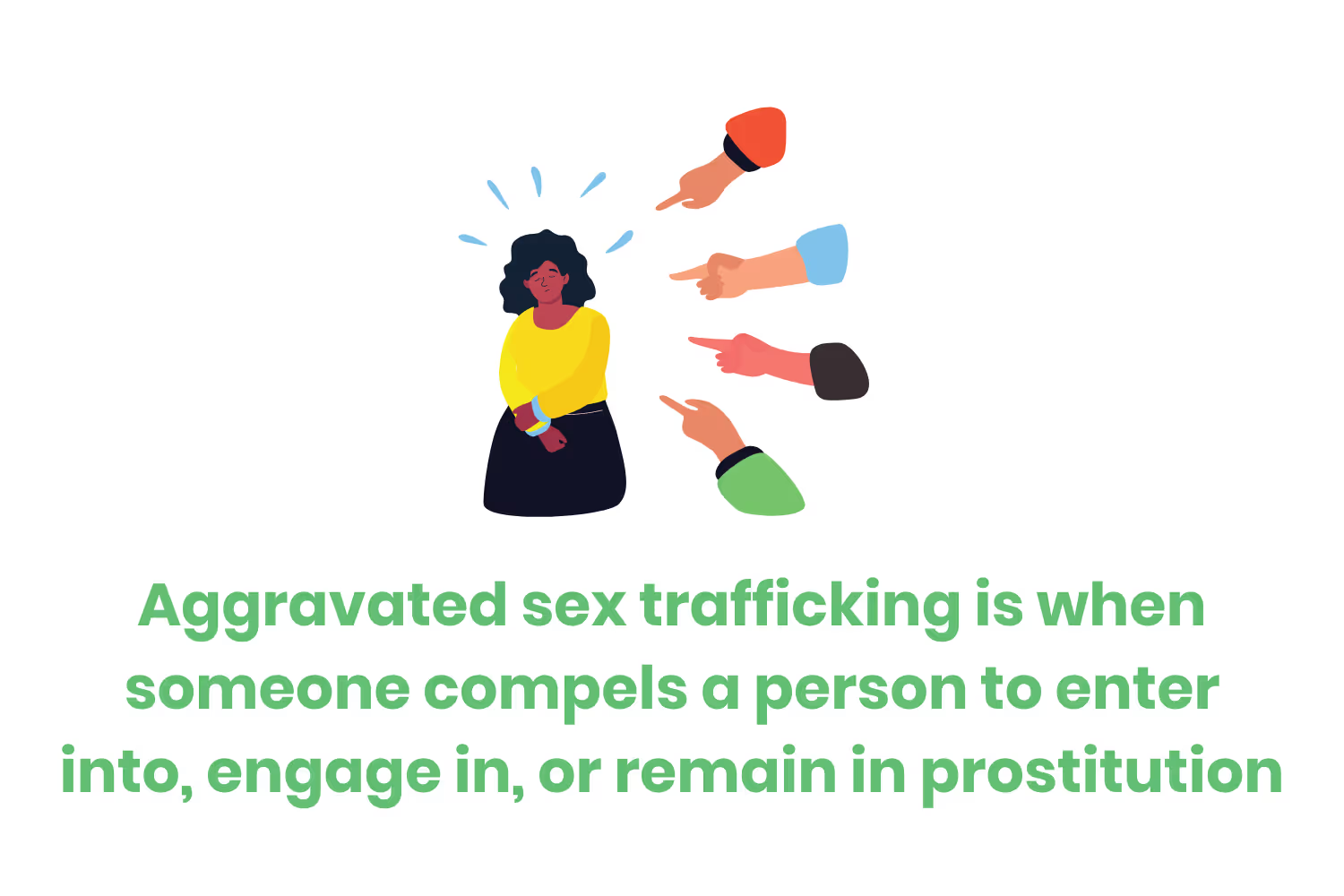
In this definition, “compelling” includes, but is not limited to…
- Using drugs or other intoxicating substances renders a person incapable of controlling their conduct or understanding their situation.
- Withholding or threatening to withhold a scheduled drug from a drug-dependent person.
- Withholding or threatening to withhold alcohol from an alcohol-dependent person.
- This is a person who has a psychological or physical dependence on the substance due to continual consumption.
- Making material false statements, misstatements, or omissions.
- Withholding, destroying, or confiscating any legal, immigration, or governmental document with the intent to impair a person’s freedom of movement.
- Requiring prostitution as a condition to retire, repay, or service an actual or purported debt.
- Engaging in any scheme, plan, or pattern to convince a person that if they do not engage/continue to engage in prostitution, the alleged trafficker will:
- Cause physical injury to the victim.
- Cause the death of the victim.
- Cause damage to property, other than the property of the alleged trafficker.
- Engage in other conduct constituting a Class A, B, or C crime.
- Engage in other conduct constituting a criminal restraint.
- Accuse someone of a crime, cause criminal charges, or cause deportation proceedings to happen against the victim.
- Expose a secret or publicize an asserted fact, regardless if it is true, to subject the victim to hatred, contempt, or ridicule.
- Testify, provide information, withhold testimony, or withhold information regarding another person’s legal claim or defense.
- Use a position as a public servant to perform an official duty that adversely affects some other person
- Use a position as a public servant to fail/refuse to perform an official duty that would adversely affect some other person
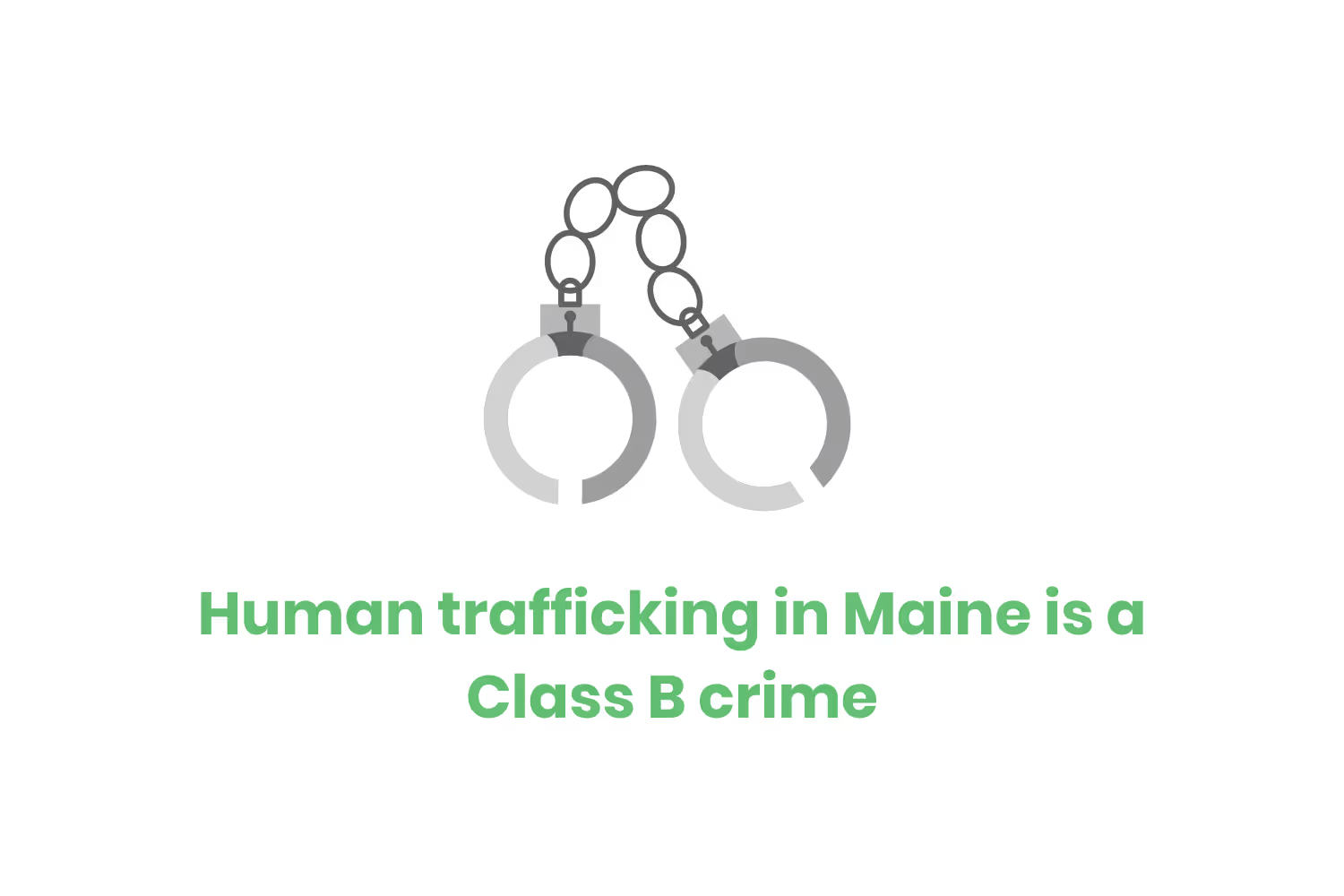
Someone is also guilty of trafficking if they promote the prostitution of a person 15, 16, or 17 years of age.
There is a third definition according to Maine’s constitution. Aggravated sex trafficking is when a person promotes the prostitution of a person suffering from a mental disability. This disability is reasonably apparent or known to the alleged trafficker. Such a disability renders the victim substantially incapable of appraising the nature of the trafficking conduct.
A violation of these three definitions is a Class B crime. However, if the guilty party knew the victim was 14 years old or younger, the violation becomes a Class A crime.
Maryland
In Maryland, human trafficking is closely linked to prostitution when looking at the law and the language it uses.
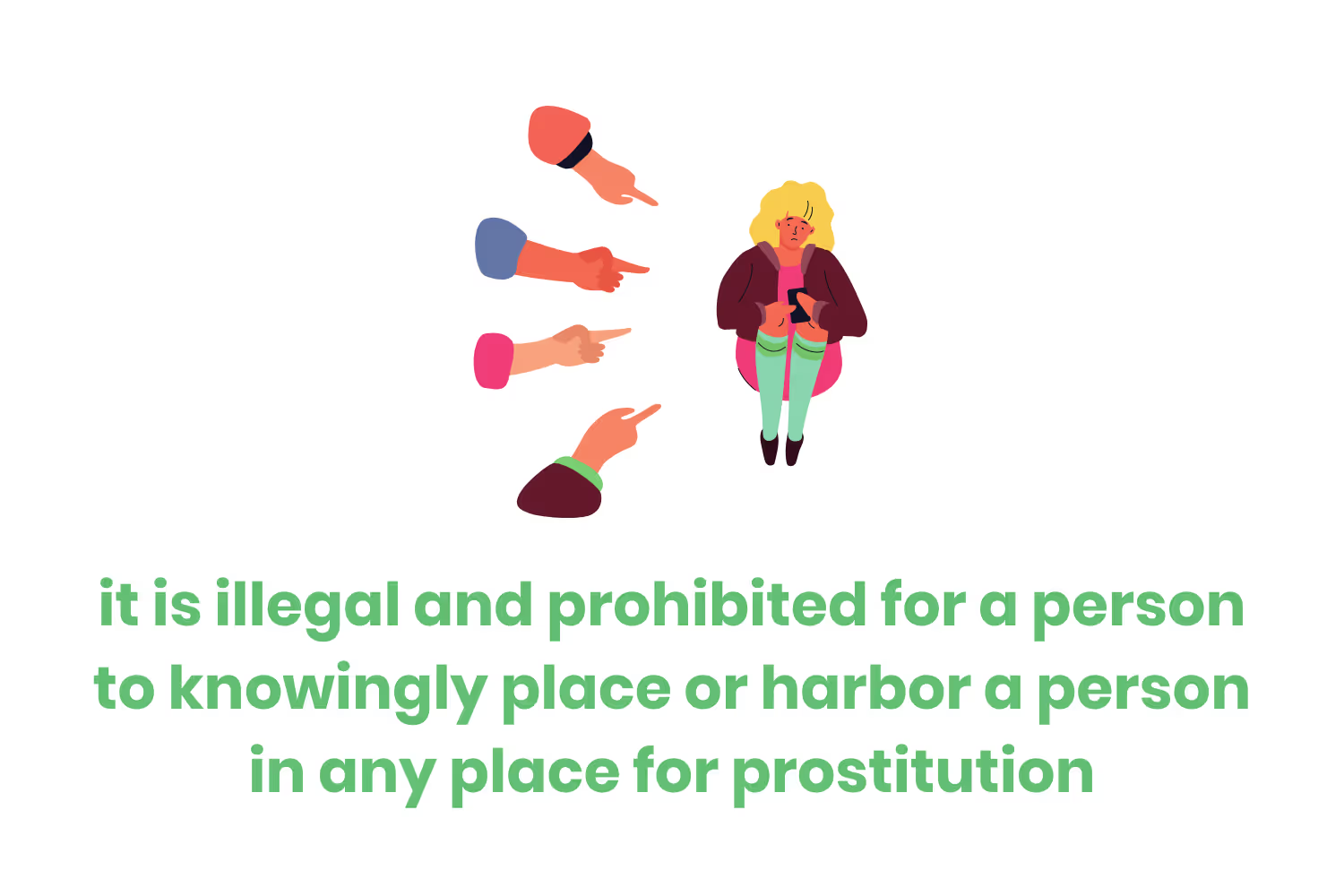
In general, it is illegal and prohibited for a person to knowingly…
- Take a person, or cause the taking of a person, to any place for prostitution.
- Place, cause the placement, or harbor a person in any place for prostitution.
- Persuade, induce, entice, or encourage the taking or the placement of a person for prostitution.
- Receive consideration to procure a house of prostitution, or elsewhere, with the intent of causing a person to engage in prostitution or assignation.
- Assignation is a type of appointment to meet someone in secret. It is typically an appointment made by lovers, although this isn’t the case when it pertains to human trafficking.
- Engage in a scheme, device, or conduct intended to cause someone to believe that if they didn’t comply with the sexually explicit performance, they would suffer physical restraint or physical harm.
- Destroy, conceal, remove, possess, or confiscate any actual/purported passport, immigration document, or government identification document of a person while otherwise attempting to violate this person.
Maryland’s legal definition continues to discuss parents, guardians, someone who has permanent/temporary custody, or someone who is responsible for the supervision of another. It is illegal for these people to consent to the taking or detention of the dependent for prostitution.
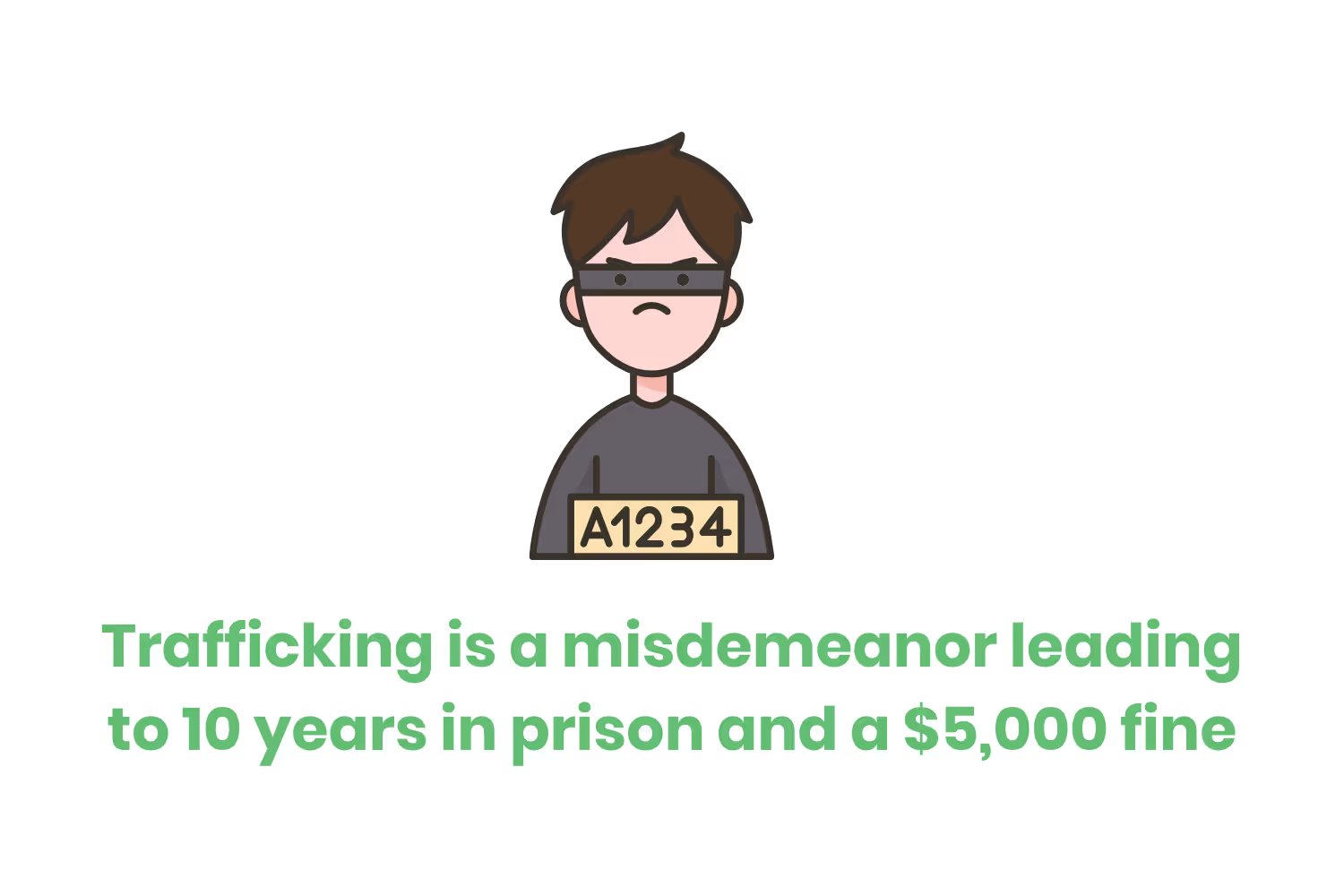
The laws continue to discuss the penalties resulting from violating these laws. A person who violates any part of the law explained above is guilty of human trafficking. A conviction of this misdemeanor will result in imprisonment lasting at most 10 years. The convicted can also face a fine not exceeding $5,000.
The other half of Maryland’s definition involves more severe human trafficking offenses. First, a person may not take the prohibited actions listed above against a minor.
Second, a person may not knowingly take or detain another with the intent to use force, threats, coercion, or fraud to compel the other to marry the person. The same goes for forced marriage to a third person. A person may not knowingly use force, threats, coercion, or fraud, to force another to perform sexual acts, sexual contact, or vaginal intercourse.
Anyone who violates a segment of this second half of Maryland’s human trafficking definition is guilty of a felony. If convicted, a person can face imprisonment up to 25 years and/or a fine not exceeding $15,000.
Kentucky
Kentucky has a very broad definition of human trafficking. According to Kentucky’s Revised Statute § 529.100, a person is guilty of human trafficking when the person intentionally subjects one or more persons to engage in forced labor or services.
Similarly, a person is guilty of human trafficking when they intentionally subject one or more persons to engage in commercial sexual activity. This may happen through the use of force, fraud, or coercion.
There is one exception to this second definition. If the victim is under the age of 18, the commercial sexual activity doesn’t need to involve force, fraud, or coercion. Because the victim is a minor, anyone who allows them or forces them to engage in sexual exploitation is automatically guilty of human trafficking.

In Kentucky, human trafficking is a Class C felony. If the trafficked person suffered serious physical injury, the charges increase to a Class B felony.
If the trafficking victim is under the age of 18, the offense will increase by one level. This means that if someone is originally charged with a Class C felony, the charge would increase to a Class B felony. If someone is originally charged with a class B felony, the charge would increase to a Class A felony.
Furthermore, the Revised Statute § 529.110 discusses the promotion of human trafficking. In this section of the law, Kentucky says that a person is guilty of promoting human trafficking when they intentionally benefit financially or receive anything of value from conscious participation in illegal activities.
A person is also guilty of promoting human trafficking when they intentionally recruit, entice, harbor, transport, provide, or obtain by any means another person knowing that their target will be subject to human trafficking. Any attempts to take these actions will also make a person guilty of promoting human trafficking.
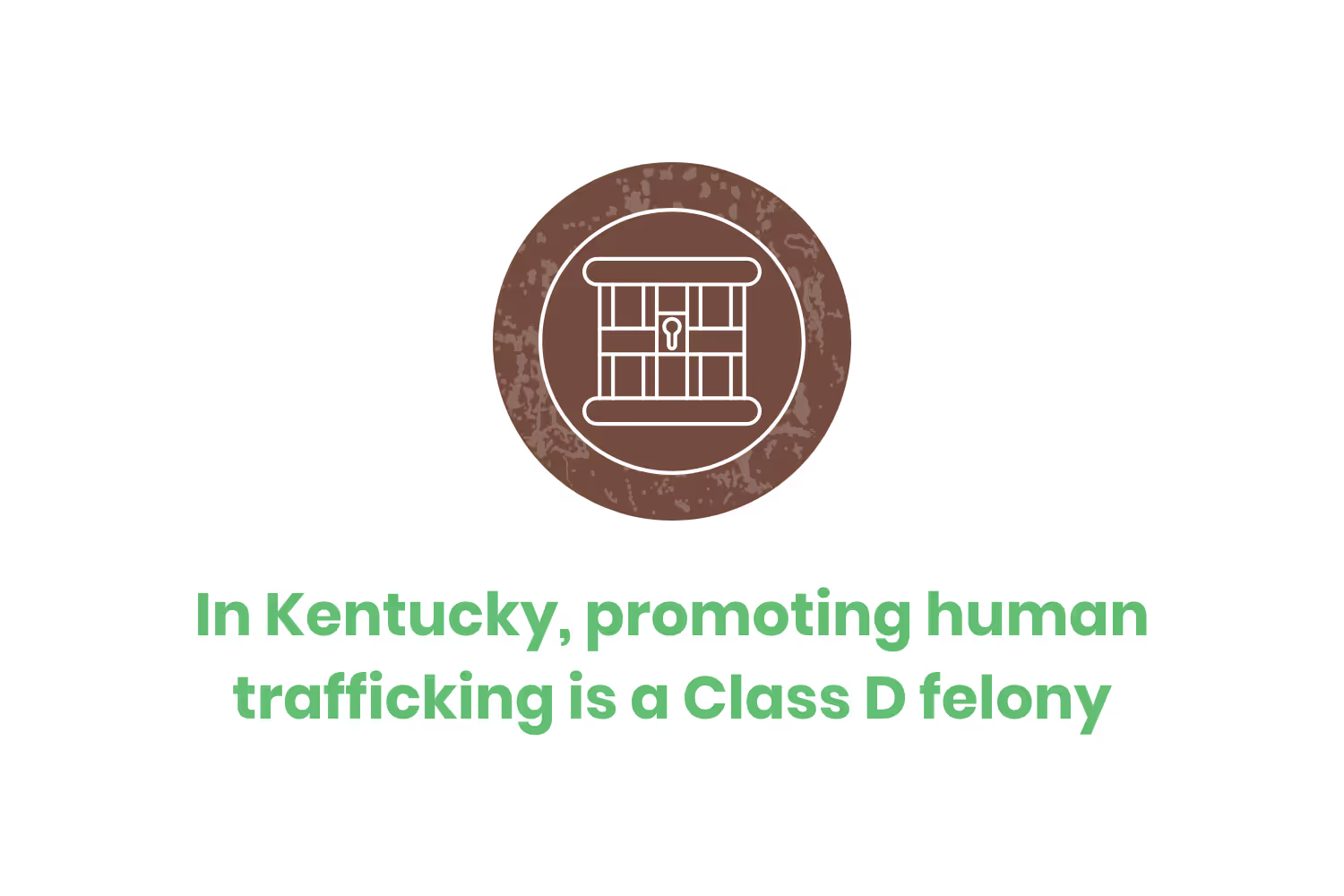
In Kentucky, promoting human trafficking is a Class D felony. It becomes a Class C felony if the trafficking victim is under the age of 18.
Louisiana
In the Louisiana State Legislature, Revised Statute § 14:46.2 discusses the illegality of human trafficking.
According to the law, it is illegal for any person to knowingly take the following actions against another person to provide labor services:
- Recruit
- Harbor
- Transport
- Provide
- Solicit
- Receive
- Isolate
- Entice
- Obtain
- Patronize
- Procure
- Purchase
- Hold
- Restrain
- Induce
- Threaten
- Subject
- Maintain
Now when I say “labor services”, Louisiana defines this as any activity that has an economic value.
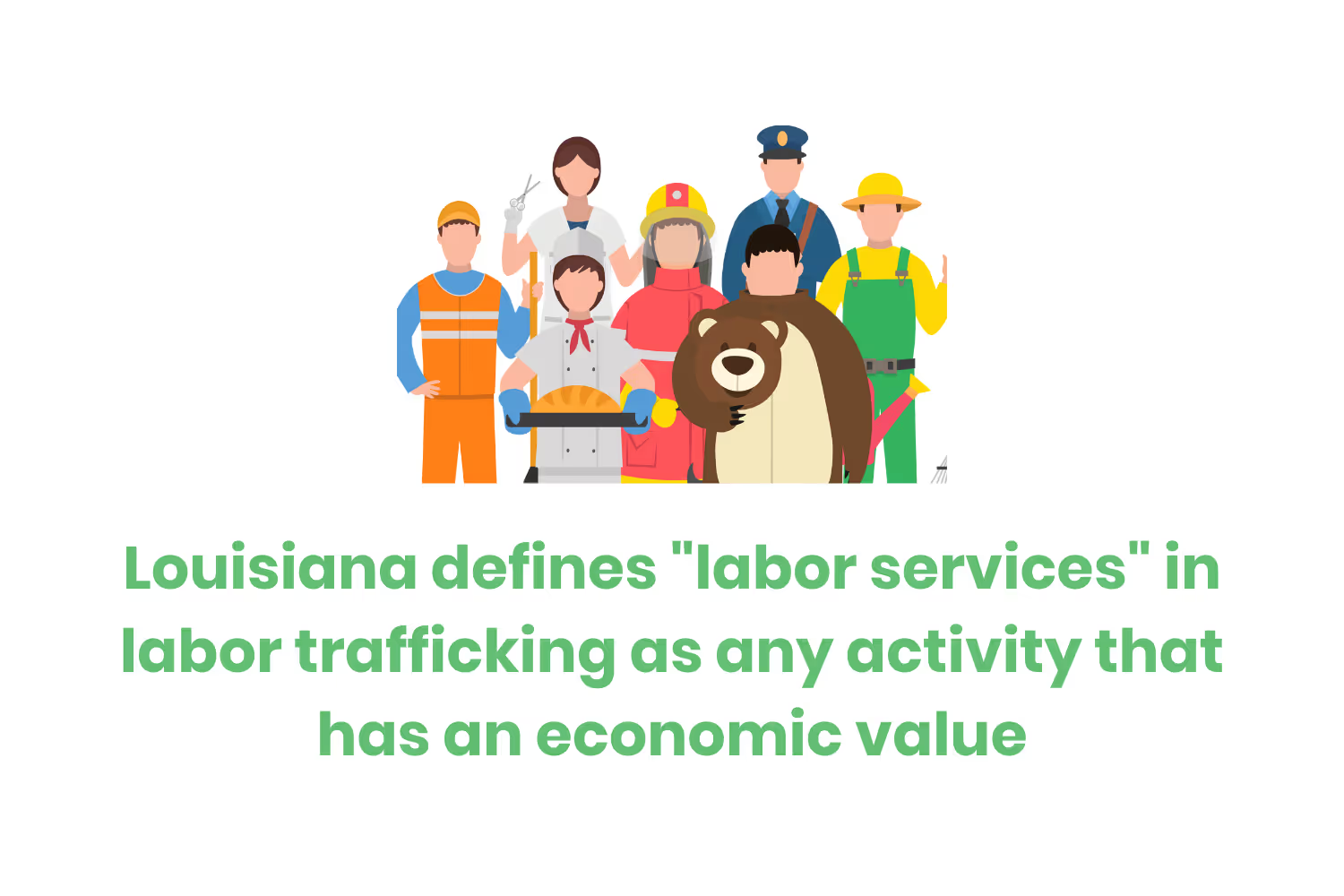
Similarly, it’s unlawful for any person to knowingly take one of the actions listed above against a person under the age of 21 to engage in commercial sexual activity. It’s illegal to do so regardless of any force, fraud, or coercion happening.
In this case, “commercial sexual activity” in the state of Louisiana means any sexual act performed/conducted when anything of value was directly or indirectly given, promised, or received by anyone. This includes the production of pornography.
It isn’t a defense against allegations if the alleged trafficker didn’t know the age of the victim. Similarly, claiming that the victim consented to the prohibited activity is not a valid defense.
It’s illegal in the state of Louisiana for any person to knowingly benefit from any activity listed above when it involves human trafficking. It’s also illegal to knowingly facilitate any of the actions listed above by any means, regardless if someone received any promised item of value by the person.
This includes, but is not limited to…
- Aiding
- Abetting
- Conspiring
Anyone who commits the crime of human trafficking as defined above will face a fine of up to $10,000 and a hard labor prison stint lasting no more than 10 years. Whoever commits the crime of human trafficking when it involves any illegal sexual conduct will face a fine of no more than $15,000 and/or prison lasting no more than 20 years.
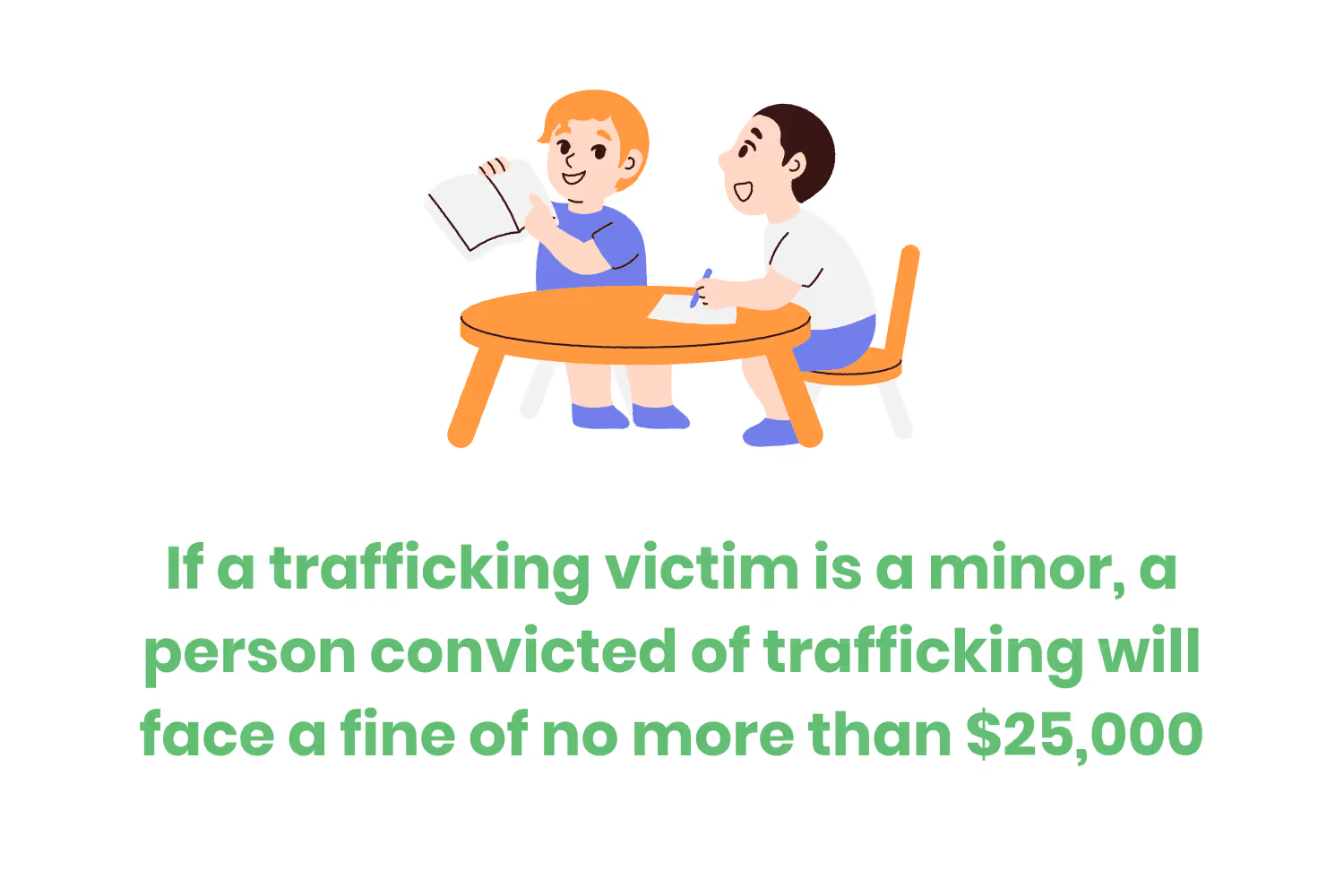
If the trafficking victim is under the age of 18, a person convicted of trafficking will face a fine of no more than $25,000. They could face a prison sentence of no fewer than 5 years and no more than 25 years. The first five years will be without the benefit of parole, probation, or suspension of the sentence.
Maine
In the Maine State Constitution, Section §852 discusses aggravated sex trafficking. According to the law, a person is guilty of aggravated sex trafficking if they promote prostitution by compelling a person to enter into, engage in, or remain in prostitution.
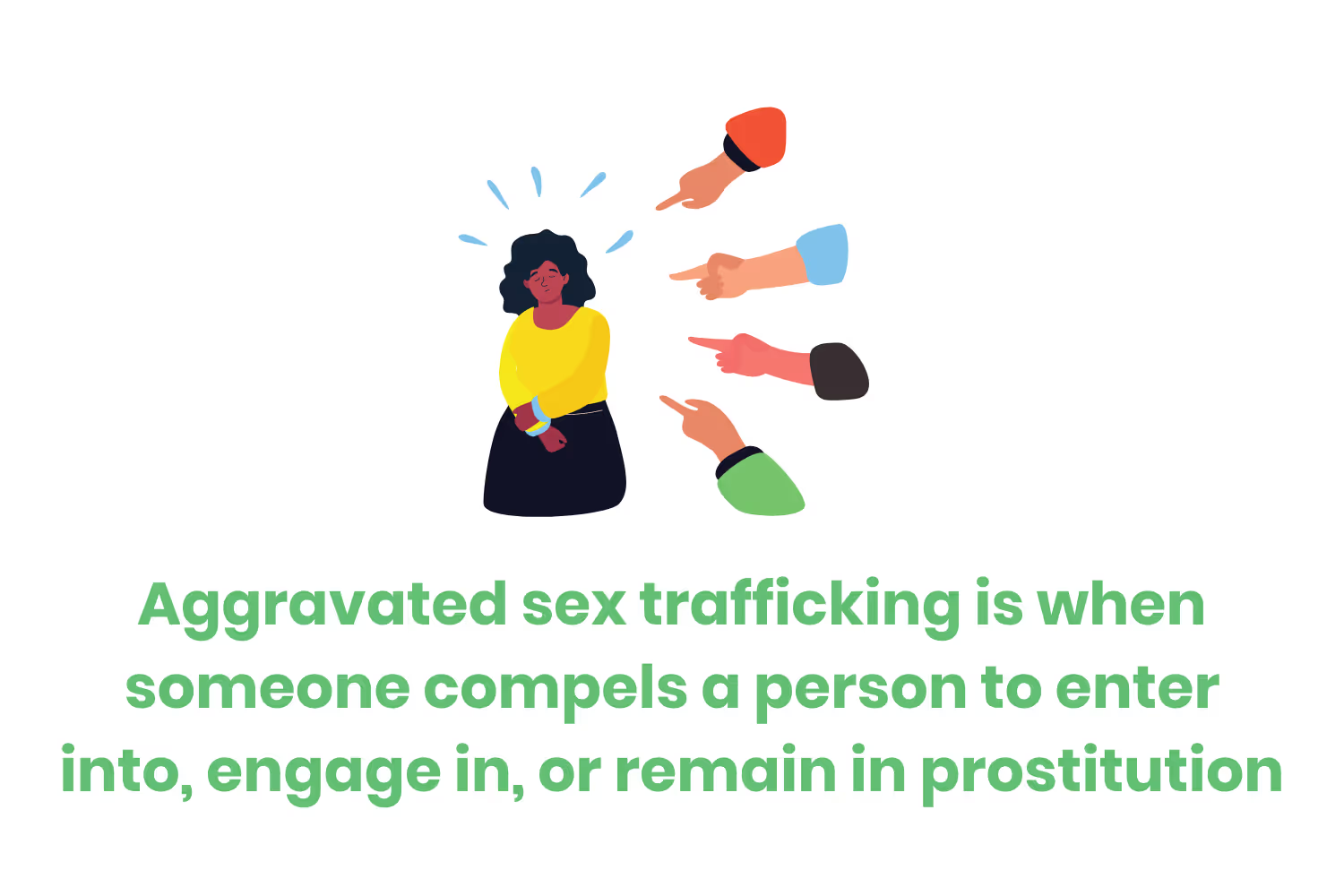
In this definition, “compelling” includes, but is not limited to…
- Using drugs or other intoxicating substances renders a person incapable of controlling their conduct or understanding their situation.
- Withholding or threatening to withhold a scheduled drug from a drug-dependent person.
- Withholding or threatening to withhold alcohol from an alcohol-dependent person.
- This is a person who has a psychological or physical dependence on the substance due to continual consumption.
- Making material false statements, misstatements, or omissions.
- Withholding, destroying, or confiscating any legal, immigration, or governmental document with the intent to impair a person’s freedom of movement.
- Requiring prostitution as a condition to retire, repay, or service an actual or purported debt.
- Engaging in any scheme, plan, or pattern to convince a person that if they do not engage/continue to engage in prostitution, the alleged trafficker will:
- Cause physical injury to the victim.
- Cause the death of the victim.
- Cause damage to property, other than the property of the alleged trafficker.
- Engage in other conduct constituting a Class A, B, or C crime.
- Engage in other conduct constituting a criminal restraint.
- Accuse someone of a crime, cause criminal charges, or cause deportation proceedings to happen against the victim.
- Expose a secret or publicize an asserted fact, regardless if it is true, to subject the victim to hatred, contempt, or ridicule.
- Testify, provide information, withhold testimony, or withhold information regarding another person’s legal claim or defense.
- Use a position as a public servant to perform an official duty that adversely affects some other person
- Use a position as a public servant to fail/refuse to perform an official duty that would adversely affect some other person
Someone is also guilty of trafficking if they promote the prostitution of a person 15, 16, or 17 years of age.
There’s a third definition according to Maine’s constitution. Aggravated sex trafficking is when a person promotes the prostitution of a person suffering from a mental disability. This disability is reasonably apparent or known to the alleged trafficker. Such a disability renders the victim substantially incapable of appraising the nature of the trafficking conduct.

A violation of these three definitions is a Class B crime. However, if the guilty party knew the victim was 14 years old or younger, the violation becomes a Class A crime.
Maryland
In Maryland, human trafficking is closely linked to prostitution when looking at the law and the language it uses.
In general, it’s illegal and prohibited for a person to knowingly…
- Take a person, or cause the taking of a person, to any place for prostitution.
- Place, cause the placement, or harbor a person in any place for prostitution.
- Persuade, induce, entice, or encourage the taking or the placement of a person for prostitution.
- Receive consideration to procure a house of prostitution, or elsewhere, with the intent of causing a person to engage in prostitution or assignation.
- Assignation is a type of appointment to meet someone in secret. It is typically an appointment made by lovers, although this isn’t the case when it pertains to human trafficking.
- Engage in a scheme, device, or conduct intended to cause someone to believe that if they didn’t comply with the sexually explicit performance, they would suffer physical restraint or physical harm.
- Destroy, conceal, remove, possess, or confiscate any actual/purported passport, immigration document, or government identification document of a person while otherwise attempting to violate this person.
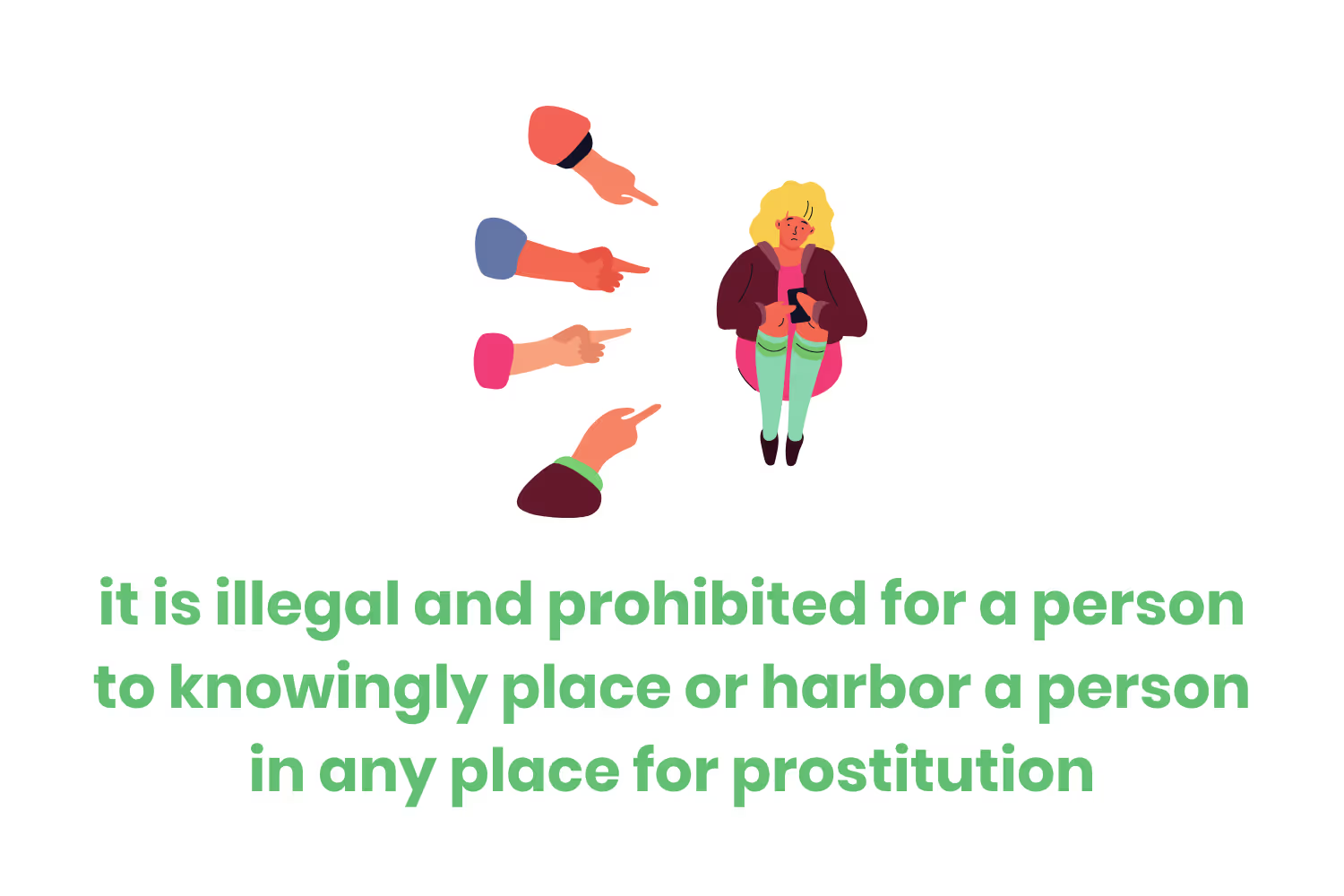
Maryland’s legal definition continues to discuss parents, guardians, someone who has permanent/temporary custody, or someone who is responsible for the supervision of another. It’s illegal for these people to consent to the taking or detention of the dependent for prostitution.
The laws continue to discuss the penalties resulting from violating these laws. A person who violates any part of the law explained above is guilty of human trafficking. A conviction of this misdemeanor will result in imprisonment lasting at most 10 years. The convicted can also face a fine not exceeding $5,000.

The other half of Maryland’s definition involves more severe human trafficking offenses. First, a person may not take the prohibited actions listed above against a minor.
Second, a person may not knowingly take or detain another with the intent to use force, threats, coercion, or fraud to compel the other to marry the person. The same goes for forced marriage to a third person. A person may not knowingly use force, threats, coercion, or fraud, to force another to perform sexual acts, sexual contact, or vaginal intercourse.
Anyone who violates a segment of this second half of Maryland’s human trafficking definition is guilty of a felony. If convicted, a person can face imprisonment up to 25 years and/or a fine not exceeding $15,000.
Massachusetts
In the Commonwealth of Massachusetts, trafficking a person for sexual servitude is illegal. In the General Laws, Part IV, Title I, Chapter 265 there exists section 50 that discusses…
- Sexual servitude
- Trafficking of a person under the age of 18
- Trafficking by business entities
- Penalties
Section 50 begins with a definition of human trafficking. It is illegal for anyone to, or attempt to, do any of the following by any means when it comes to commercial sexual activity…
- Subjects
- Attempts to subject
- Recruit
- Entices
- Harbors
- Transports
- Provides
- Obtains
To reiterate, it is illegal for someone to take, or attempt to take, any of the actions listed above with the purpose of subjecting someone to commercial sexual activities, sexually explicit performances, or the production of unlawful pornography.
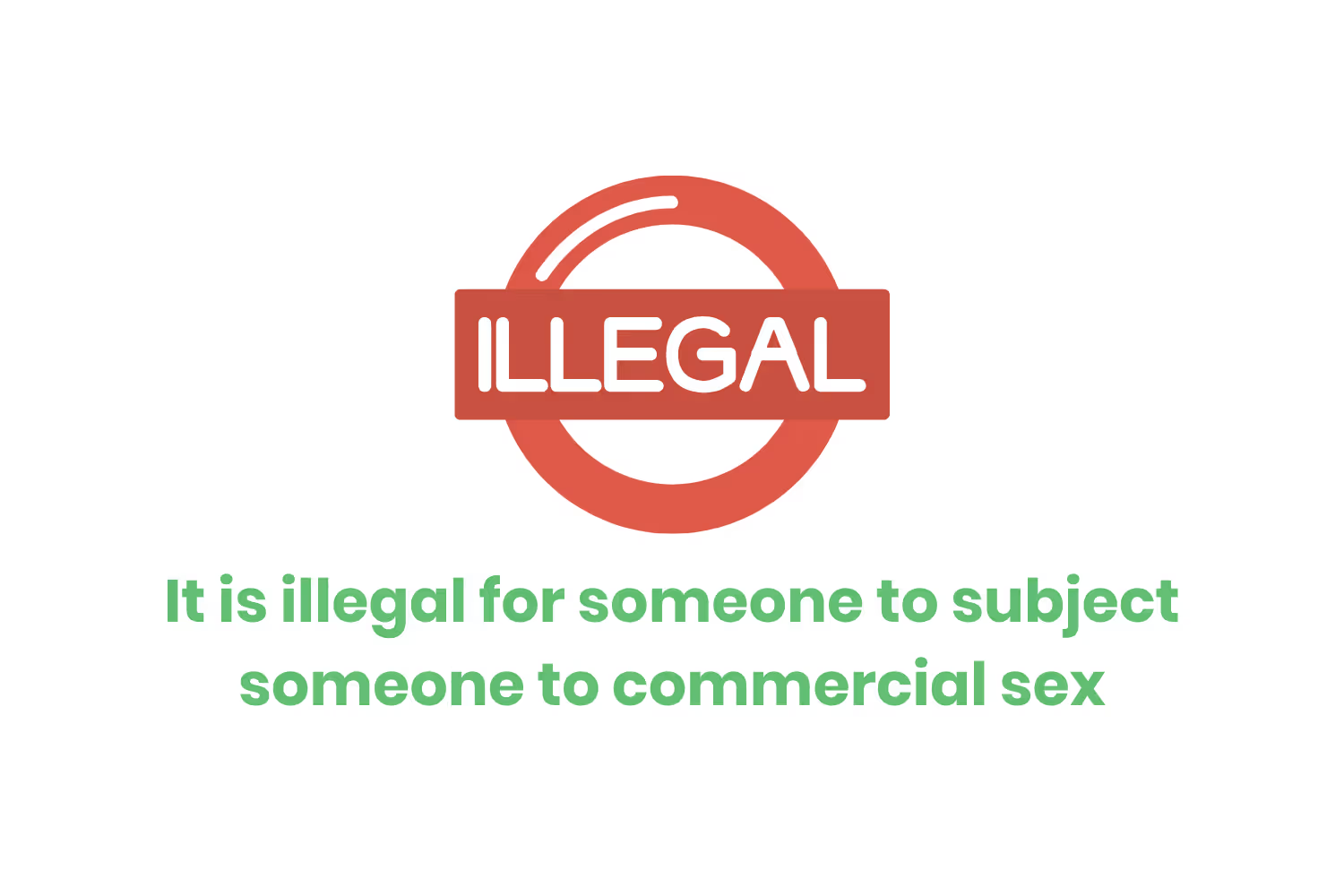
It is illegal for anyone to benefit financially or receive anything of value for taking one of the actions described above with the intent to traffick someone for sexual exploitation.
Anyone found guilty of violating this faces a prison sentence of at least 5 years, but no more than 30 years and a maximum fine of $25,000. A judge cannot hand out a prison sentence of less than 5 years or suspend sentencing of human trafficking. No one convicted of trafficking a person will be eligible for probation, parole, work release, furlough, or any deduction in time for good behavior until the 5-year mark.
If the victim of human trafficking is under the age of 18, the maximum time potentially spent in prison increases to “life imprisonment.”
If a judge finds a business entity guilty of human trafficking for sexual exploitation, that business can face a maximum fine of $1,000,000.
The next section of Massachusetts law discusses human trafficking in regard to forced labor.
Someone is guilty of labor trafficking in the state of Massachusetts if they subject or attempt to subject by any means someone to forced services by taking one of these actions…
- Recruit
- Entice
- Harbor
- Transport
- Provide
- Obtain
Someone is also guilty of trafficking for forced service if they benefit financially or receive something of value, by participating in any of the actions listed above.
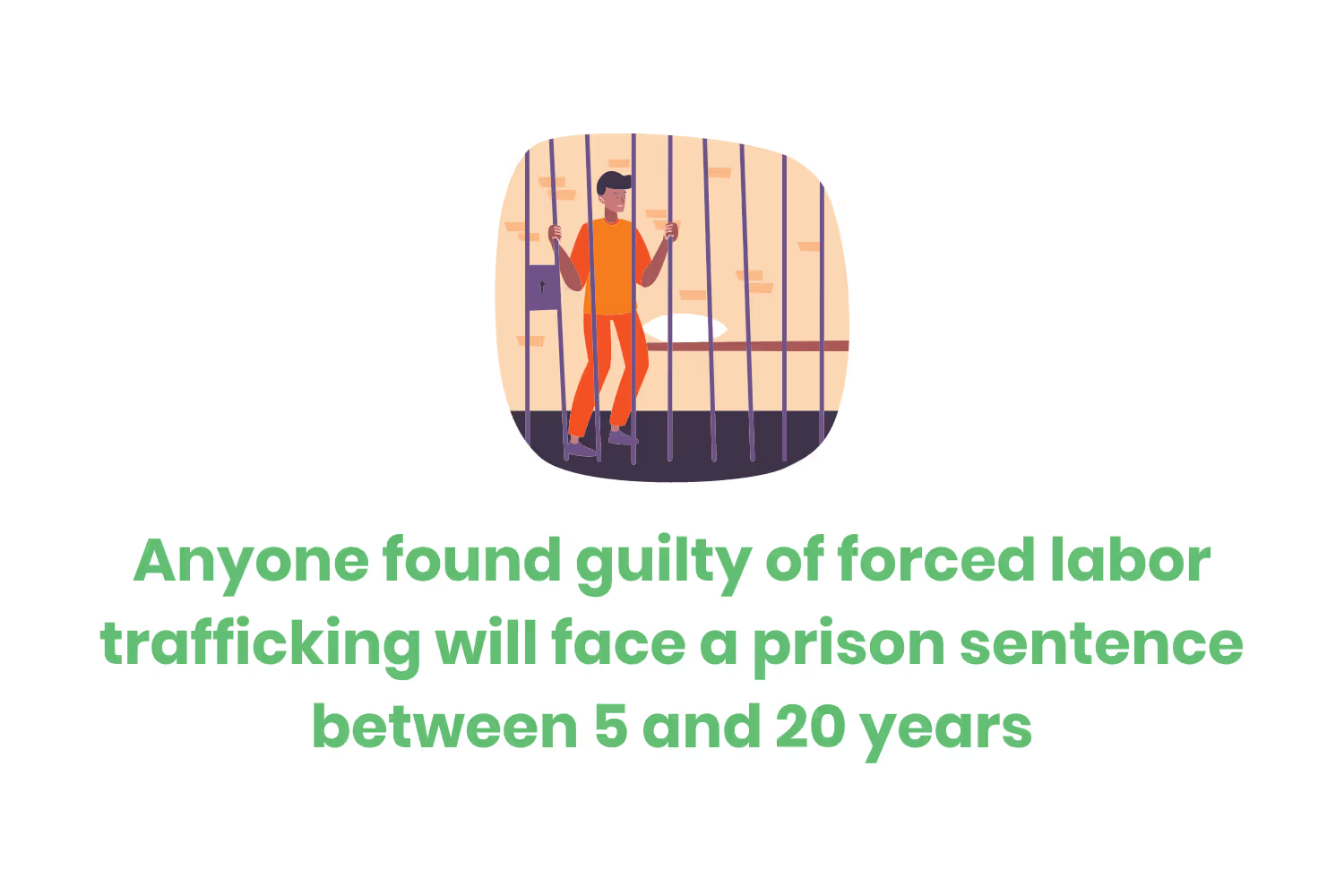
Anyone found guilty of forced labor trafficking will face a prison sentence between 5 and 20 years. They will also face a fine of at most $25,000. The prison sentence cannot be below 5 years and no one can shorten the sentence to fewer than 5 years for any reason.
If the trafficking victim is under the age of 18, anyone convicted of trafficking the minor can face a lifetime prison sentence instead of the maximum of 20 years mentioned before. The minimum sentence is still a mandatory 5 years.
If a judge finds a business entity guilty of human trafficking for forced labor exploitation, that business can face a maximum fine of $1,000,000.
Section 52 describes subsequent convictions.
If someone were to commit a second or subsequent violation of section 50 or 51 outlined above, they will face punishments again. This time around, they can face a life sentence in Massachusetts prison. The minimum sentence for a second conviction is 10 years.
No one can reduce this sentence to less than 10 years or suspend the sentence. The convicted person is not eligible for probation, parole, work release, furlough, or any deductions in time for good behavior until they serve at least 10 years.
Massachusetts is one of the few states to outline organ trafficking. This part of the definition is in section 53.
Someone is guilty of human trafficking if they recruit, harbor, transport, deliver, or obtain a person by any means with the intention or knowledge that an organ, tissue, or body part will be for sale after getting removed against the person’s will.
Someone is also guilty of organ trafficking if they get paid for their participation in the venture or receive something of value directly or indirectly.
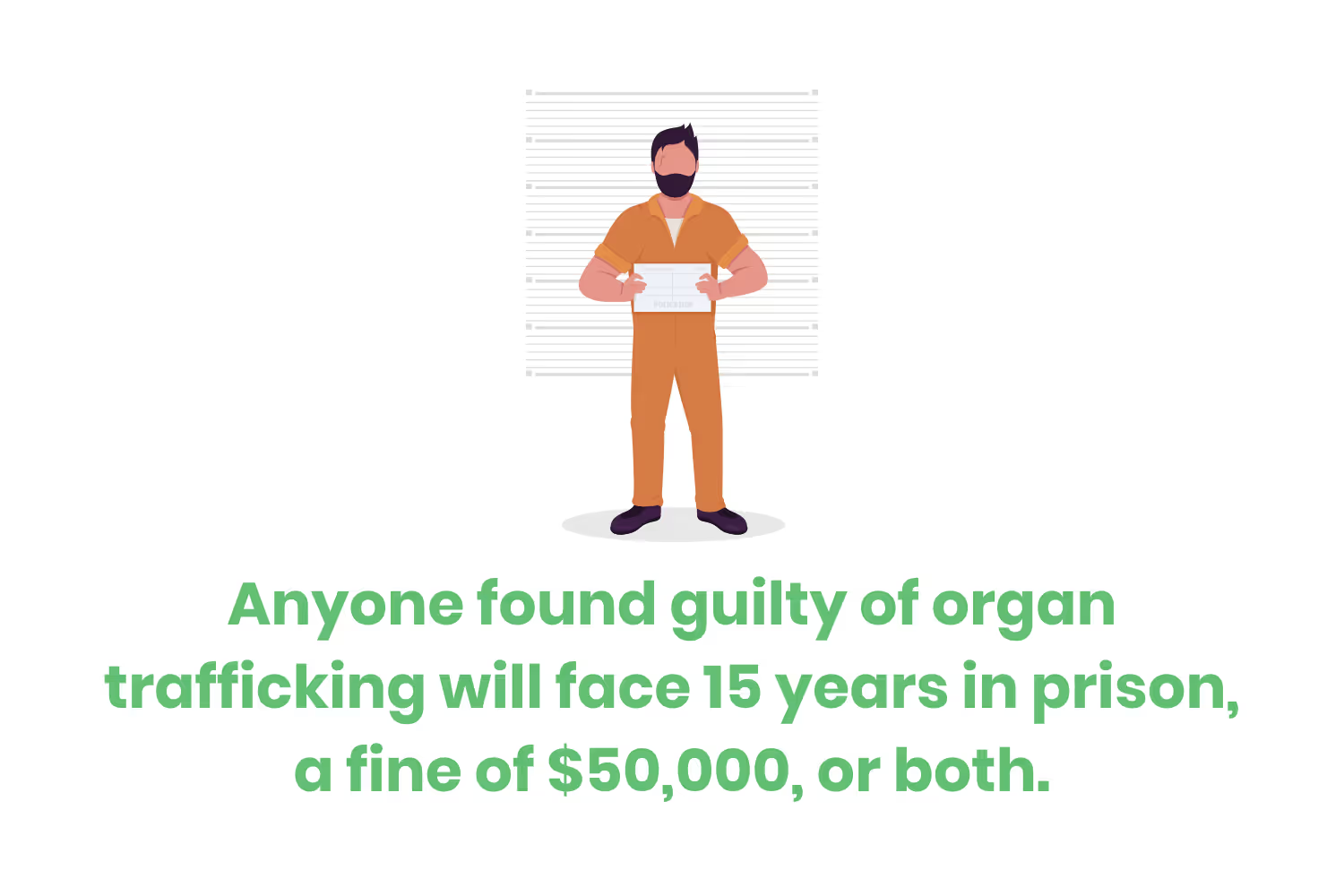
Anyone found to be violating the organ trafficking laws in Massachusetts will face imprisonment for no more than 15 years, a maximum fine of $50,000, or both.
If the victim is under the age of 18, then the minimum mandatory prison sentence is 5 years. Under no circumstances can someone serve less than 5 years if convicted of organ trafficking.
Michigan
In the state of Michigan, it is illegal for someone to knowingly take the following actions as it concerns trafficking.
- Recruit
- Entice
- Harbor
- Transport
- Provide
- Obtain
Section 750.46b says it is illegal to take any of the actions above against an individual for forced labor or services. Section 750.462c says that it is illegal to take those actions for the purpose of holding the individual in debt bondage. Section 750.462d reiterates parts b and c. It continues on to say that it is illegal to knowingly benefit financially or receive anything of value for participating in trafficking activities.
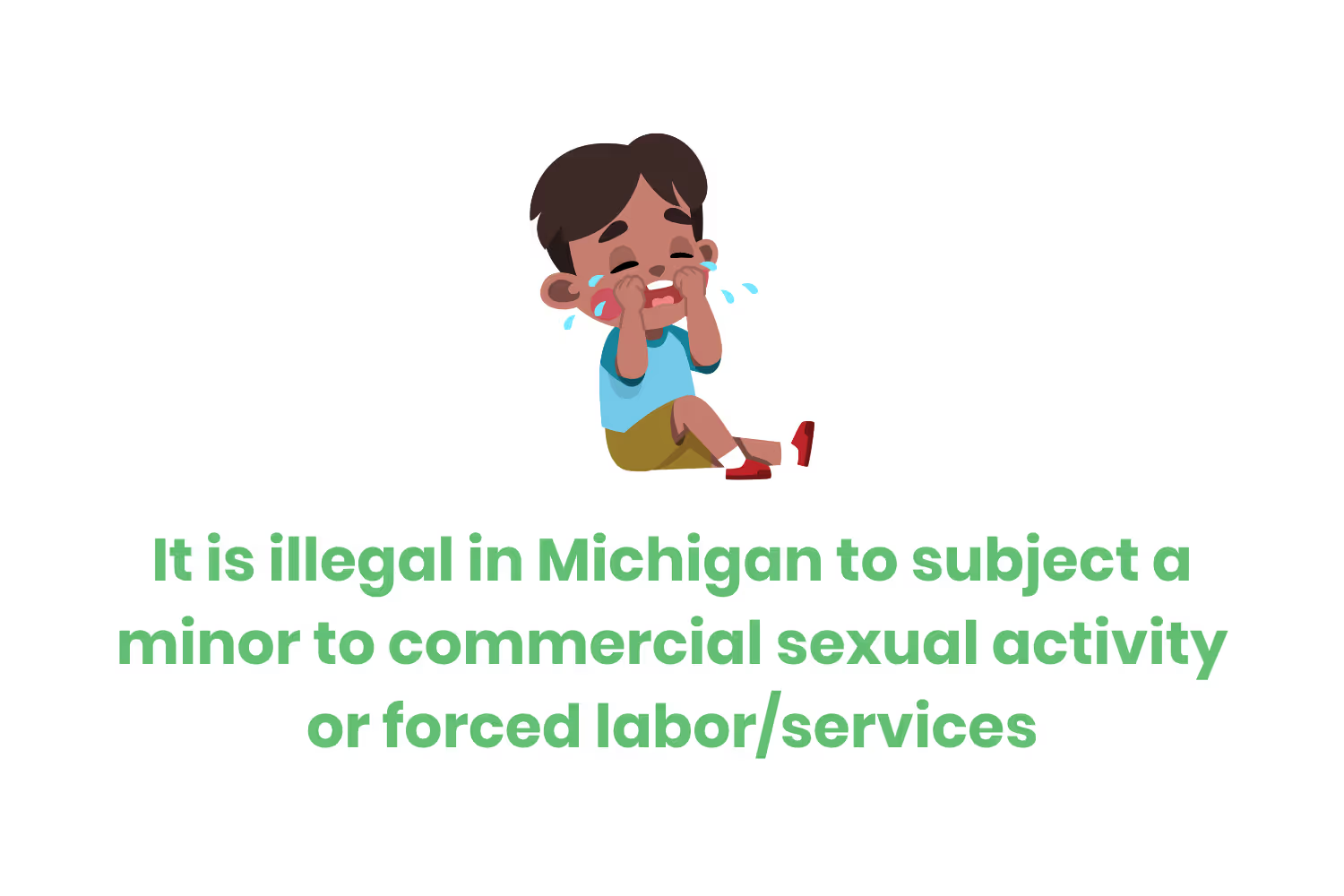
Section 750.462e says that it is illegal to take any of the actions listed above against a minor for commercial sexual activity or forced labor/services. It doesn't matter if the perpetrator knows that the victim is a minor at the time of the trafficking.
A person guilty of committing these felonies can face a maximum prison sentence of 10 years, a fine of $10,000, or both. If the violation results in bodily injury or the victim engaging in commercial sexual activities, the convicted party can face 15 years in prison, a $15,000 fine, or both. “Serious bodily injury” to the victim will increase imprisonment to 20 years and the fine to $20,000.
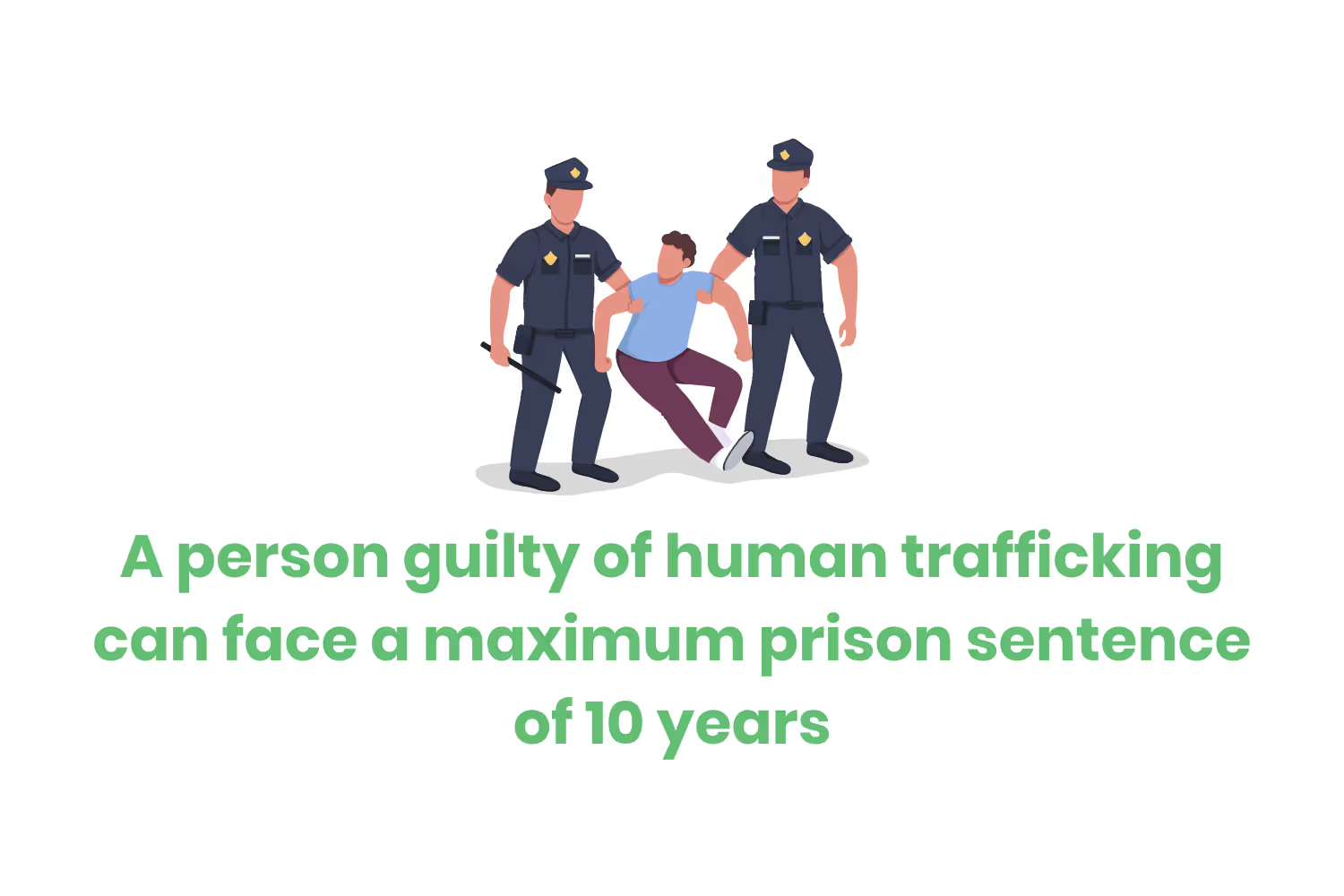
If the trafficking involves kidnapping, criminal sexual conduct in the first degree, attempted criminal sexual conduct in the first degree, or an attempt to kill the victim, the guilty party will face a maximum prison sentence of life, a maximum fine of $50,000, or both.
Minnesota
In the Minnesota legislature, there are several definitions outlined in section 609.281.
Labor trafficking means the recruitment, transportation, transfer, harboring, enticement, provision, obtaining, or receipt of a person for…
- Debt bondage
- Forced labor or services
- Slavery
- Practices similar to slavery
- The removal of organs
Labor trafficking is also the act of receiving anything of value for knowingly participating in any of the ventures described above
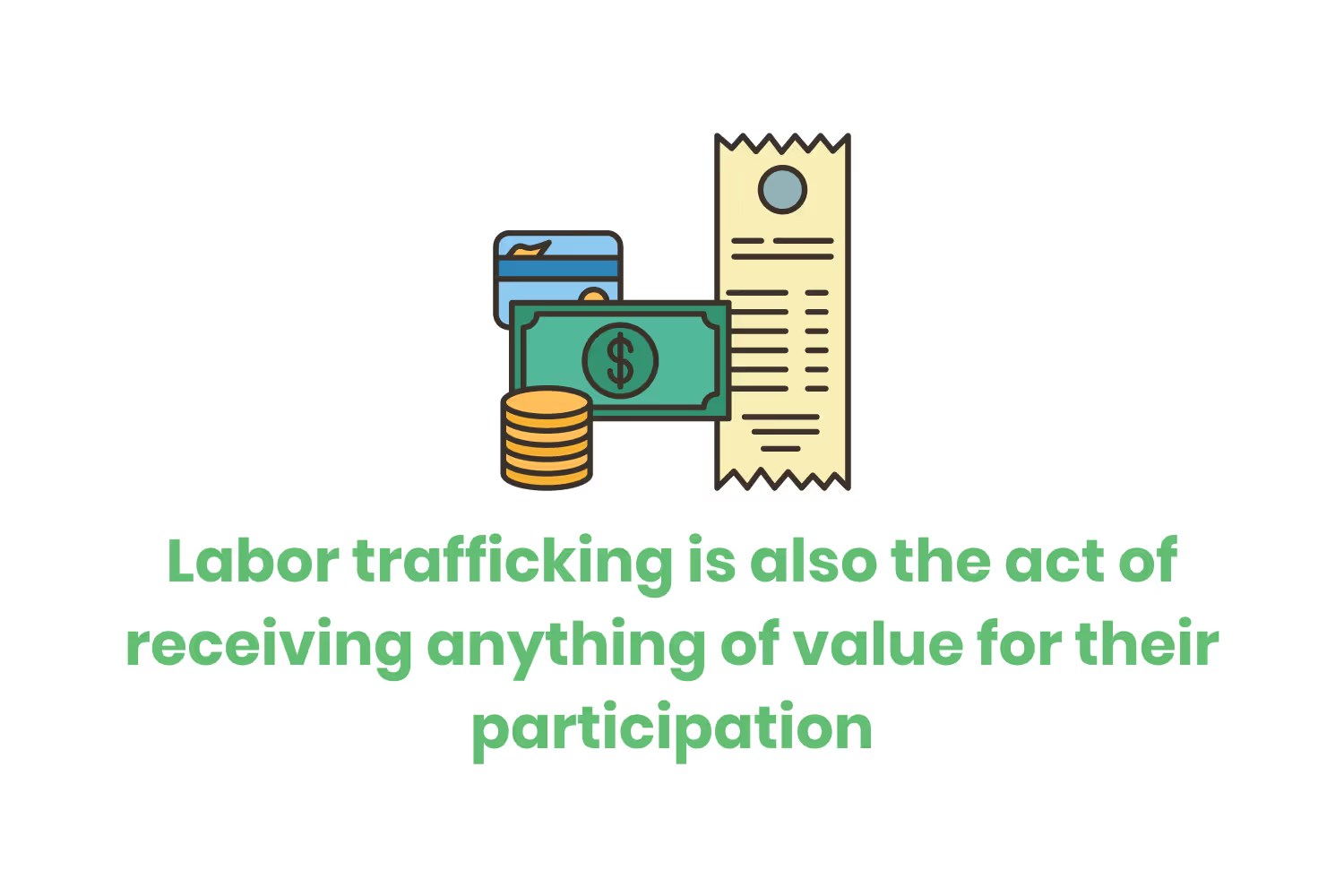
The law continues to explain what forced labor or services means. It is any labor or services performed or provided by another person and the perpetrator obtains/maintains through…
- An implicit or explicit threat, scheme, plan, pattern or other action intention to make the victim believe that if they did not comply, they would suffer bodily harm or physical restraint
- Physically restraining or threatening to physically restrain the victim
- Abuse or threaten to abuse the legal process
- Destroying, concealing, removing, confiscating, or possessing any actual or purported legal document belonging to the victim
- Use of blackmail
If someone is guilty of knowingly trafficking a minor (someone under the age of 18) for labor servitude, they face a prison sentence of at most 20 years, a fine of up to $40,000, or both. If someone is guilty of trafficking an adult for labor servitude, they can face a maximum prison sentence of 1 year, a fine of $30,000, or both.
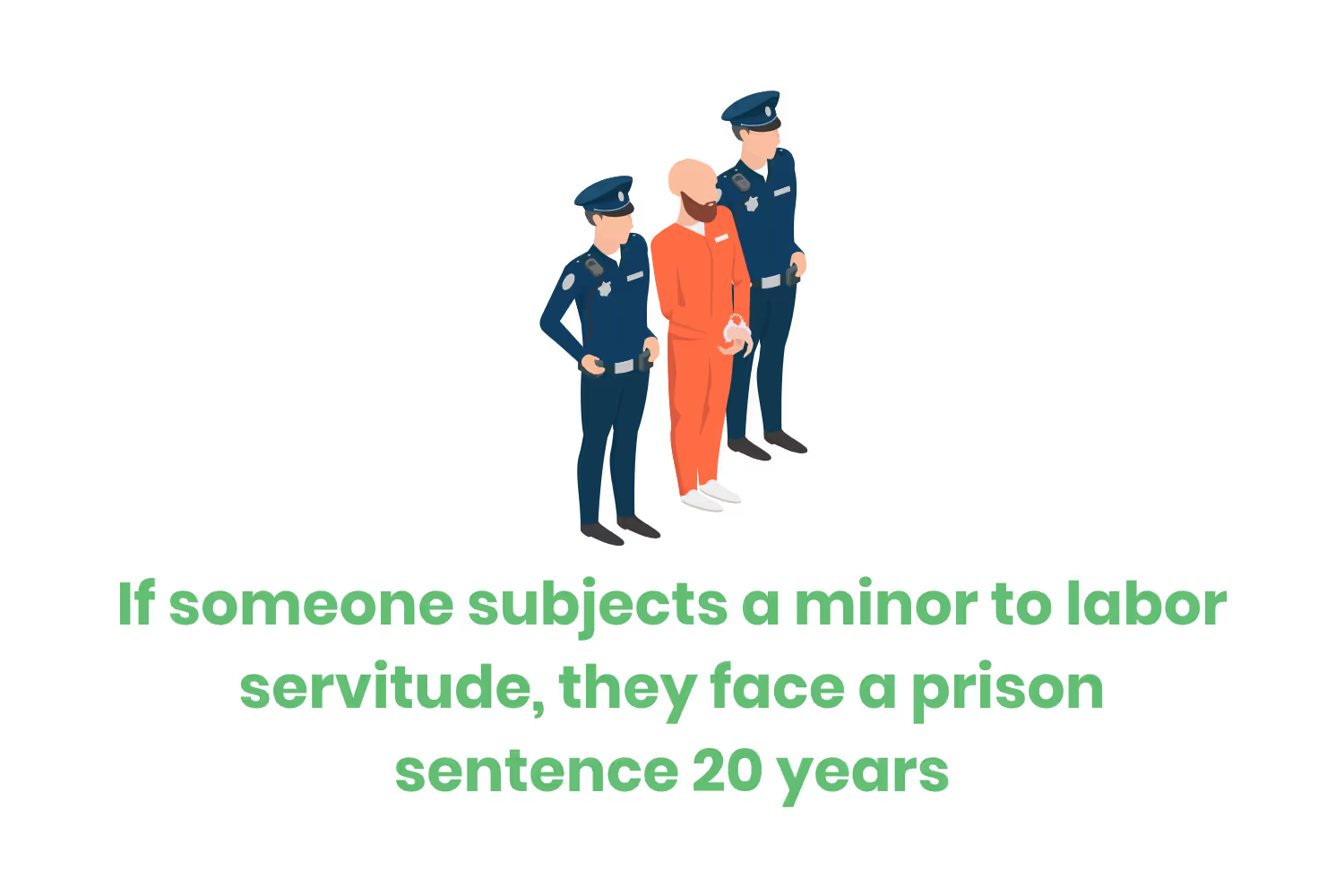
If convicted of using passports and other legal documents to control a trafficking victim, that person faces additional charges. If the intended target is a victim under the age of 19, the perpetrator can face a maximum prison sentence of 10 years, a fine of $20,000, or both. If the intended target is an adult, the perpetrator can face imprisonment for no more than 5 years, a fine of no more than $10,000, or both.
Mississippi
Mississippi’s penal code separates the crime of human trafficking into three distinct sections: trafficking of a minor, trafficking of an adult, and trafficking by an enterprise.
Anyone who takes the following actions, or attempts to take the following actions against another person while intending for them to perform forced labor or services is guilty of human trafficking.
These actions include…
- Coercement
- Recruitment
- Enticement
- Harboring
- Transporting
- Procurement
- Obtaining by any means
Anyone who benefits financially from participating in these activities or receives any form of compensation is also guilty of human trafficking.
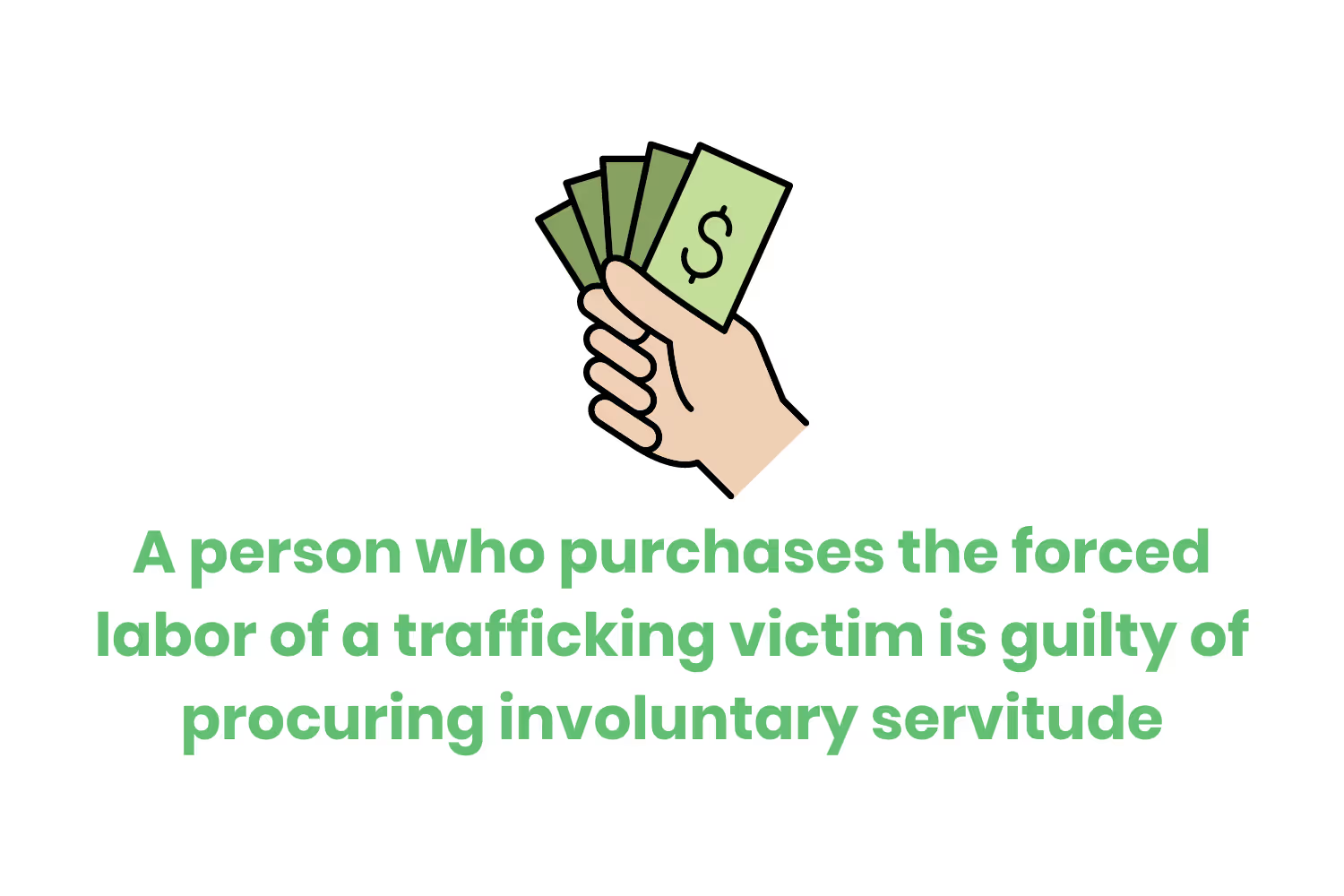
A person who knowingly purchases the forced labor or services of a trafficking victim is guilty of procuring involuntary servitude. Anyone who knowingly subjects or attempts to subject a person to forced labor or services is guilty of procuring involuntary servitude. Anyone who benefits, whether financially or otherwise, from participating in business operations that should have known about such acts, is also guilty of trafficking.
When it comes to sex trafficking, Mississippi law separates the definition and punishments into two categories depending on the age of the victim.
A person who knowingly takes any of the actions listed above against a minor to make them engage in commercial sexual activity, sexually explicit performance, or the production of sexually oriented material is guilty of human trafficking. Someone attempting to subject a minor to these things is also guilty of trafficking. Any actions taken to cause or attempt to cause the trafficking of a minor are guilty of trafficking.
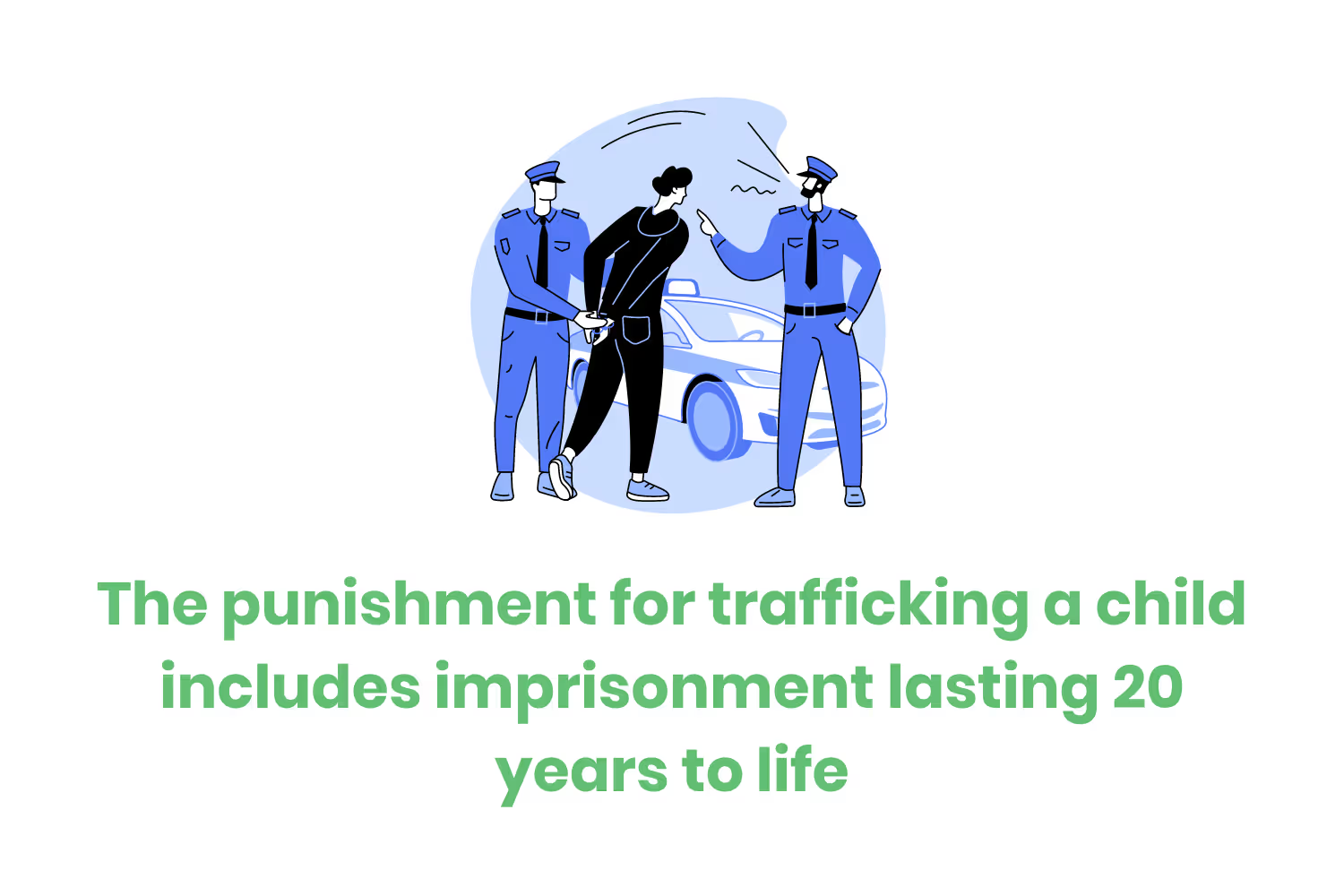
The punishment for trafficking a child includes imprisonment lasting 20 years to life. They can face a fine of between $50,000 and $500,000. Someone found guilty of trafficking can face both imprisonment and fines.
A person who knowingly takes any of the actions listed above against an adult to make them engage in commercial sexual activity, sexually explicit performances, or the production of sexually oriented material is guilty of trafficking.
The punishment for trafficking an adult can include a prison sentence between 2 to 20 years, a fine between $10,000 and $100,000, or both.
A business entity can face prosecution for human trafficking violations if…
- An agent of the business engages in a way that violates one of the definitions of trafficking outlined above while acting for the business and within the scope of employment
- An agent of the business knowing or recklessly disregarding an employee’s engagement in trafficking and the offense is part of a pattern of illegal activity benefiting the business
- An agent failed to take effective action to stop the illegal activity
Missouri
Missouri separates labor trafficking, sex trafficking, and forms of contributing to trafficking.
In section 566.206, Missouri penal code outlines slavery, involuntary servitude, peonage, and forced labor penalties.
A person is guilty of labor trafficking if they knowingly recruit, entice, harbor, transport, provide, or obtain by any means another person for forced labor. This includes but is not limited to using…
- Force
- Fraud
- Coercion
- Abduction
- Deception
- Blackmail
- Threats of financial harm
Someone does this to subject an individual to slavery, involuntary servitude, peonage, or forced labor. If someone benefits financially or receives something of value for participating in such activities, they are also guilty of labor trafficking.
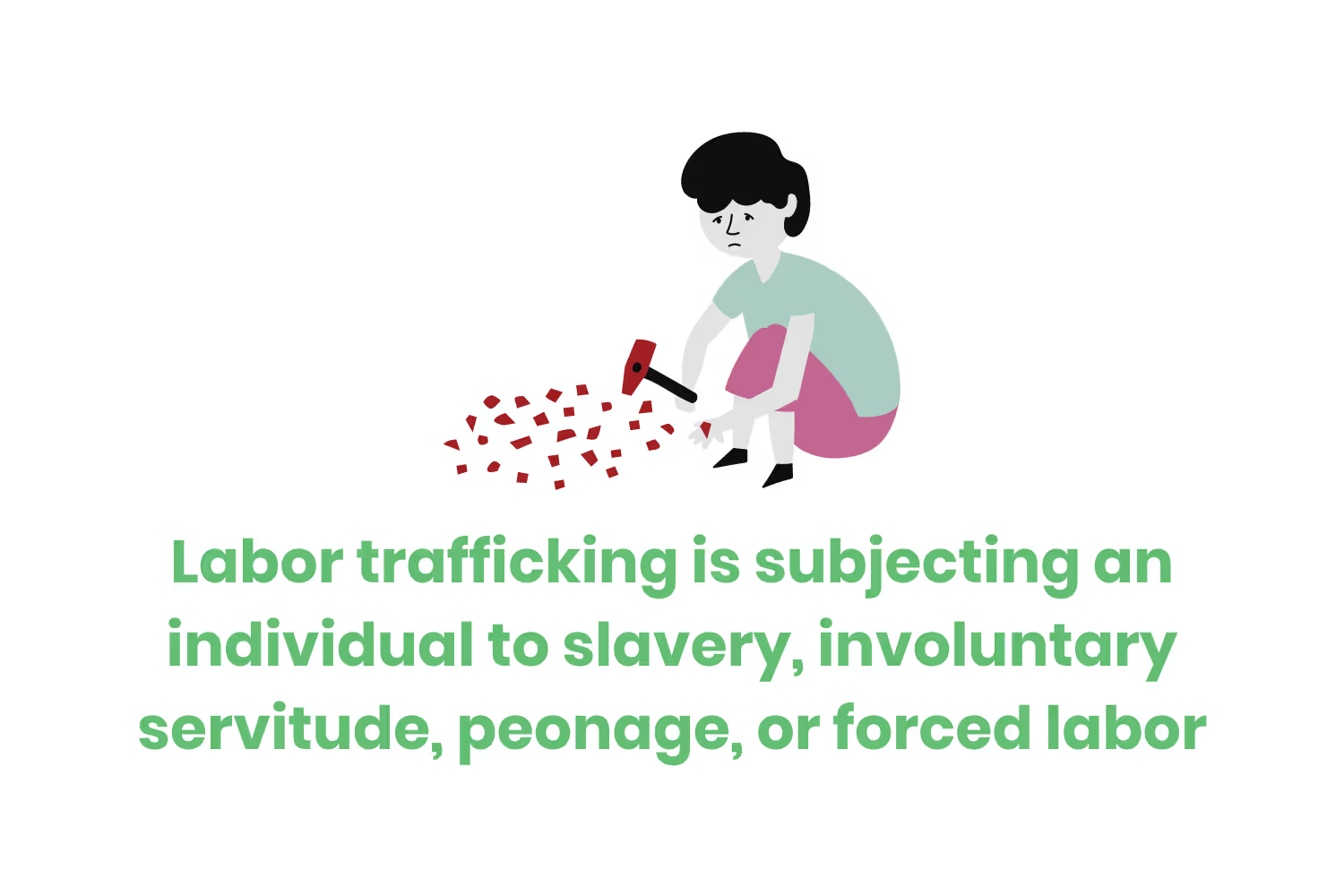
Someone found guilty of labor trafficking faces a felony. Such a felony is punishable by a prison sentence lasting between 5 and 20 years and a fine of no more than $250,000.
Section 566.209 outlines the definition of sex trafficking. Someone is guilty of sex trafficking if they knowingly recruit, entice, harbor, transport, provide, advertise the availability of, or obtain by any means a person for sexual exploitation. This happens through the use of…
- Force
- Fraud
- Coercion
- Abduction
- Deception
- Blackmail
- Threats of financial harm
The guilty party takes these actions to get their victim to perform commercial sex acts, sexual performances, or the production of explicit sexual material. The victim will not give consent, benefit financially from the actions, or receive anything of value for participating in the activities.
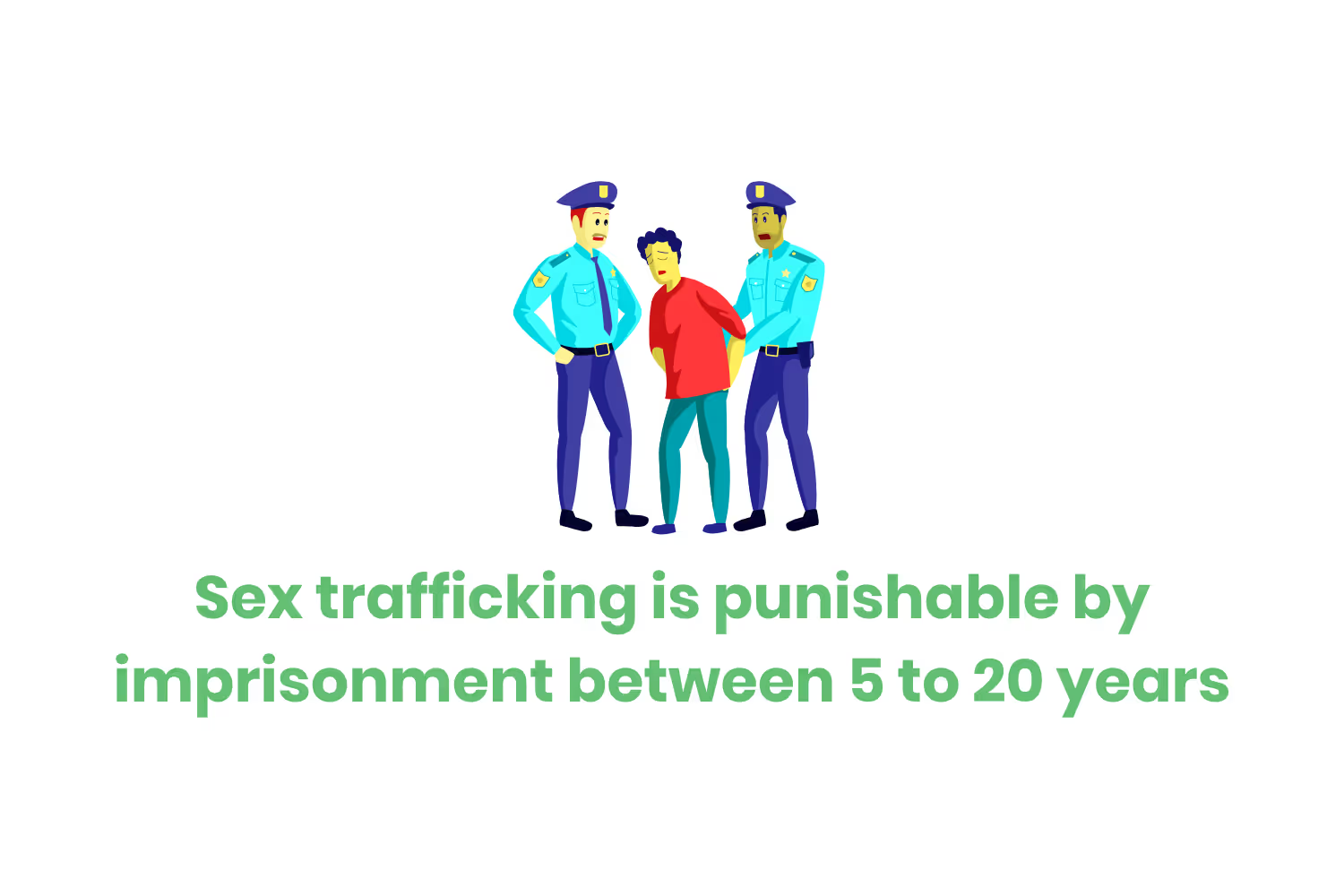
Sex trafficking is punishable by imprisonment for a term between 5 to 20 years. There is also a maximum fine of $250,000. If the trafficking venture involves force, abduction, or coercion, then the minimum prison sentence increases to 10 years.
Lastly, Missouri outlines trafficking that involves the misuse of documentation. A person commits this type of offense when they purposely and knowingly destroy, conceal, remove, confiscate, or possess a valid or purportedly valid government ID. This can include passports, driver's licenses, and any immigration documents of another person while committing the trafficking offenses outlined above.
The misuse of documentation is also any time someone prevents or restricts a person’s ability to move or travel by restricting access to documentation. Even attempts to prevent or restrict are a violation of the law. The perpetrator does this to maintain the labor or services of a trafficking victim.
A person found guilty of contributing to human trafficking through the misuse of documentation is a class E felony. As such, a person will face class E felony punishments.
Conclusion
Is human trafficking illegal? Yes. Human trafficking is illegal on a national level. The federal government recognizes both the existence of sex trafficking and labor trafficking. Moreover, the federal government prosecutes people suspected of trafficking.
The problem is that so many people in the U.S. don’t want to admit that human trafficking happens. The truth is that it can happen anywhere. In the hotel room one floor above you or down the hall. In the house next door with all of the cars coming and going.
Criminals who traffic humans do so to make a profit. If it didn’t have a good profit margin, people wouldn’t do it. Despite it being illegal, there are millions of people trafficked around the world. In fact, for every 10,000 people living in the world, 54 people end up in a trafficking situation.
I understand that this article only contains the legal definitions and consequences of 10 states. If you want to know more about the illegality of human trafficking in each state, please bookmark this page. If the state you reside in isn’t listed above, make sure to check back as we add more definitions and legal consequences over the next few months.
Emphasize your product's unique features or benefits to differentiate it from competitors
In nec dictum adipiscing pharetra enim etiam scelerisque dolor purus ipsum egestas cursus vulputate arcu egestas ut eu sed mollis consectetur mattis pharetra curabitur et maecenas in mattis fames consectetur ipsum quis risus mauris aliquam ornare nisl purus at ipsum nulla accumsan consectetur vestibulum suspendisse aliquam condimentum scelerisque lacinia pellentesque vestibulum condimentum turpis ligula pharetra dictum sapien facilisis sapien at sagittis et cursus congue.
- Pharetra curabitur et maecenas in mattis fames consectetur ipsum quis risus.
- Justo urna nisi auctor consequat consectetur dolor lectus blandit.
- Eget egestas volutpat lacinia vestibulum vitae mattis hendrerit.
- Ornare elit odio tellus orci bibendum dictum id sem congue enim amet diam.
Incorporate statistics or specific numbers to highlight the effectiveness or popularity of your offering
Convallis pellentesque ullamcorper sapien sed tristique fermentum proin amet quam tincidunt feugiat vitae neque quisque odio ut pellentesque ac mauris eget lectus. Pretium arcu turpis lacus sapien sit at eu sapien duis magna nunc nibh nam non ut nibh ultrices ultrices elementum egestas enim nisl sed cursus pellentesque sit dignissim enim euismod sit et convallis sed pelis viverra quam at nisl sit pharetra enim nisl nec vestibulum posuere in volutpat sed blandit neque risus.

Use time-sensitive language to encourage immediate action, such as "Limited Time Offer
Feugiat vitae neque quisque odio ut pellentesque ac mauris eget lectus. Pretium arcu turpis lacus sapien sit at eu sapien duis magna nunc nibh nam non ut nibh ultrices ultrices elementum egestas enim nisl sed cursus pellentesque sit dignissim enim euismod sit et convallis sed pelis viverra quam at nisl sit pharetra enim nisl nec vestibulum posuere in volutpat sed blandit neque risus.
- Pharetra curabitur et maecenas in mattis fames consectetur ipsum quis risus.
- Justo urna nisi auctor consequat consectetur dolor lectus blandit.
- Eget egestas volutpat lacinia vestibulum vitae mattis hendrerit.
- Ornare elit odio tellus orci bibendum dictum id sem congue enim amet diam.
Address customer pain points directly by showing how your product solves their problems
Feugiat vitae neque quisque odio ut pellentesque ac mauris eget lectus. Pretium arcu turpis lacus sapien sit at eu sapien duis magna nunc nibh nam non ut nibh ultrices ultrices elementum egestas enim nisl sed cursus pellentesque sit dignissim enim euismod sit et convallis sed pelis viverra quam at nisl sit pharetra enim nisl nec vestibulum posuere in volutpat sed blandit neque risus.
Vel etiam vel amet aenean eget in habitasse nunc duis tellus sem turpis risus aliquam ac volutpat tellus eu faucibus ullamcorper.
Tailor titles to your ideal customer segment using phrases like "Designed for Busy Professionals
Sed pretium id nibh id sit felis vitae volutpat volutpat adipiscing at sodales neque lectus mi phasellus commodo at elit suspendisse ornare faucibus lectus purus viverra in nec aliquet commodo et sed sed nisi tempor mi pellentesque arcu viverra pretium duis enim vulputate dignissim etiam ultrices vitae neque urna proin nibh diam turpis augue lacus.




